|
Псков - Pskov
and Pskov Oblast – и Псковская Область
|
|
|
| |
Christianization of Russia |
|
| |
that is |
|
| |
Хрещення Київської Русі – Крещение Киевской Руси – Хрышчэнне Кіеўскай Русі – Baptism of Kievan Rus' |
|
| |
a story of |
|
| |
Olga — Vladimir — Roman and David |
|
| |
|
|
| |
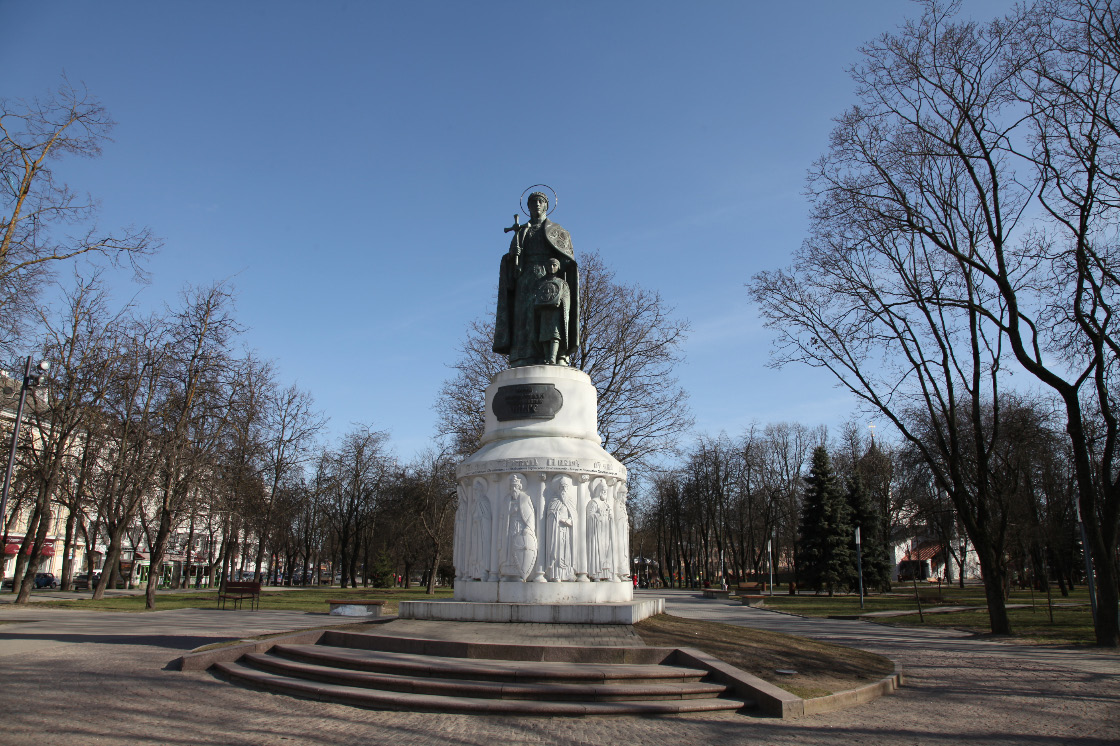 |
|
| |
Monumental bronze of grandmother and grandson in Olga's home town of Pskov by sculptor В М Клыков – V.M. Klykov and architect С.Ю. Битный – S.Yu Bitnyi. |
|
| |
|
|
|
|
| |
Ольга — Helga |
|
| Володимѣръ Свѧтославичь |
| |
— Valdamarr Sveinaldsson |
|
|
| |
|
|
|
|
Святої Рівноапостольної Київської Княгині Ольги
Святой Равноапостольной Киевской Княгини Ольги
Святой Роўнаапостальнай Кіеўскай Княгіні Вольгі
Regent Saint Olga, Equal of the Apostles, (* c. 890; reigned from 945 to 963 as regent of Kievan Rus' for her son, Saint Vladimir's father, Grand Prince of Kiev Svyatoslav; Grand Princess Saint Olga reposed on
11 July 969 †)
Baptized in 957 in Constantinople. |
|
Святого Рівноапостольного Великого Київського Князя Володимира Святославича, Просвітителя Русі в 988 Anno Domini – в рік Господа нашого Ісуса Христа
Святого Равноапостольного Великого Киевского Князя Владимира Святославича, Просветителя Руси в 988 Anno Domini – От Рождества Христова
Святога Роўнаапостальнага Вялікага Кіеўскага Князя Уладзіміра Святаславіча, Асветніка Русі ў 988
Grand Prince of Kiev, Saint Vladimir Sviatoslavich, Equal of the Apostles, Illuminator of Rus in 988
(*958/60; r. 11 June 980 – 15 July 1015†) |
| |
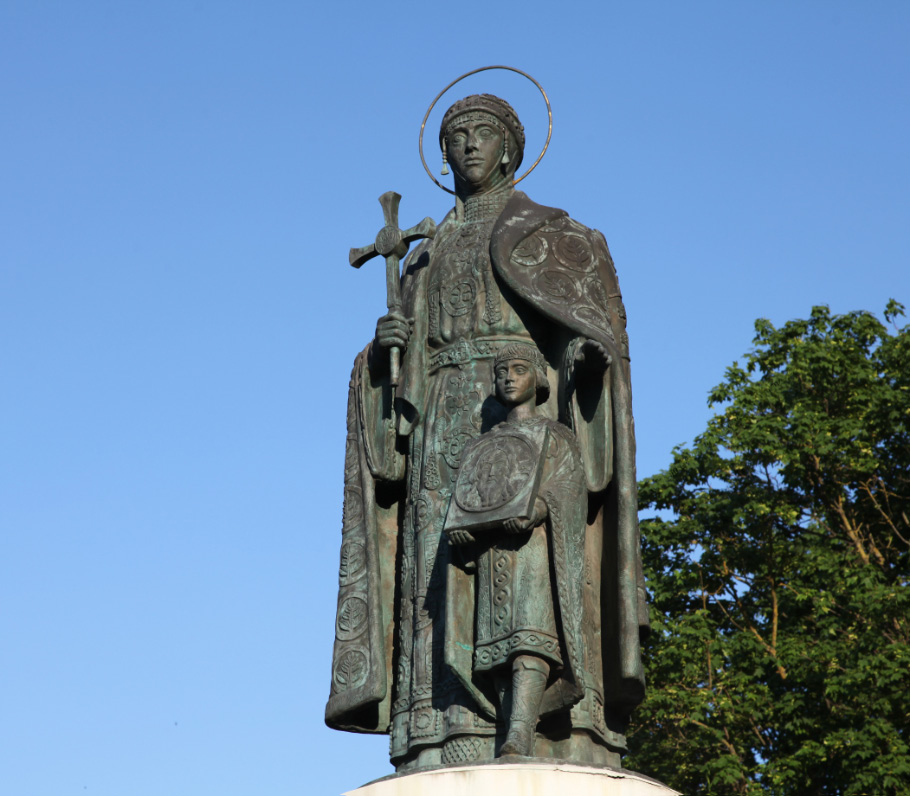 |
|
| |
|
|
| |
|
|
| |
In 988 Anno Domini the Great Schism which we now must heal had not, of course taken place, but even decades earlier Saint Olga, herself baptized in 955 in Constantinople, had requested that Catholic missionairies be sent to the lands of her Kievan Rus' in order to preach the Gospel and Christianize Russia. Grand Princess Saint Olga wrote in this connection to Otto I. der Große – Otto I the Great, Holy Roman Emperor (* 23 November 912; reigned from 2 February 962 – 7 May 973 †). Though the priestly delegation sent by the German Catholic Emperor in response to Saint Olga's request, which was headed by Adalbertus of the convent of Saint Maximinus at Trier, was not successful, quite clearly and demonstrably Saint Olga, the most exalted among female Russian Saints — ‟Equal of the Apostles – Равноапостольная” — perceived the existence of no Catholic-Orthodox Schism, Filioque and all. |
|
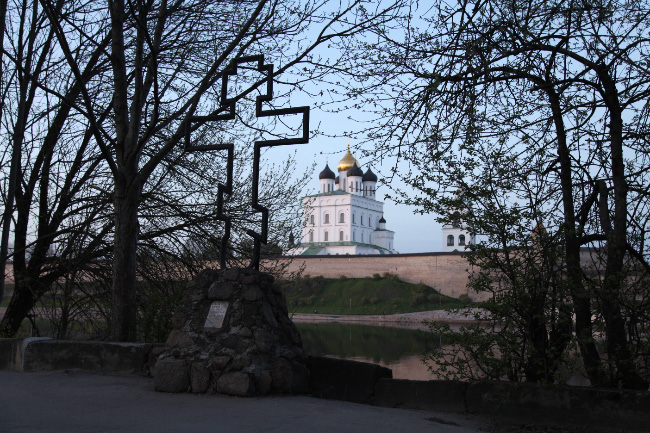 |
|
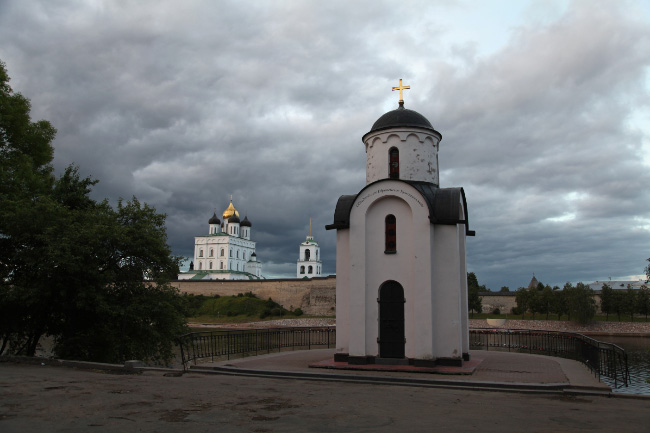 |
| Near the site where Grand Princess Saint Olga declared: "Быть Здесь Великому и Славному Граду – Let a Great and Glorious City be Here" |
|
Earliest XXI century, Ольгинская часовня – Saint Olga Chapel |
|
|
|
| |
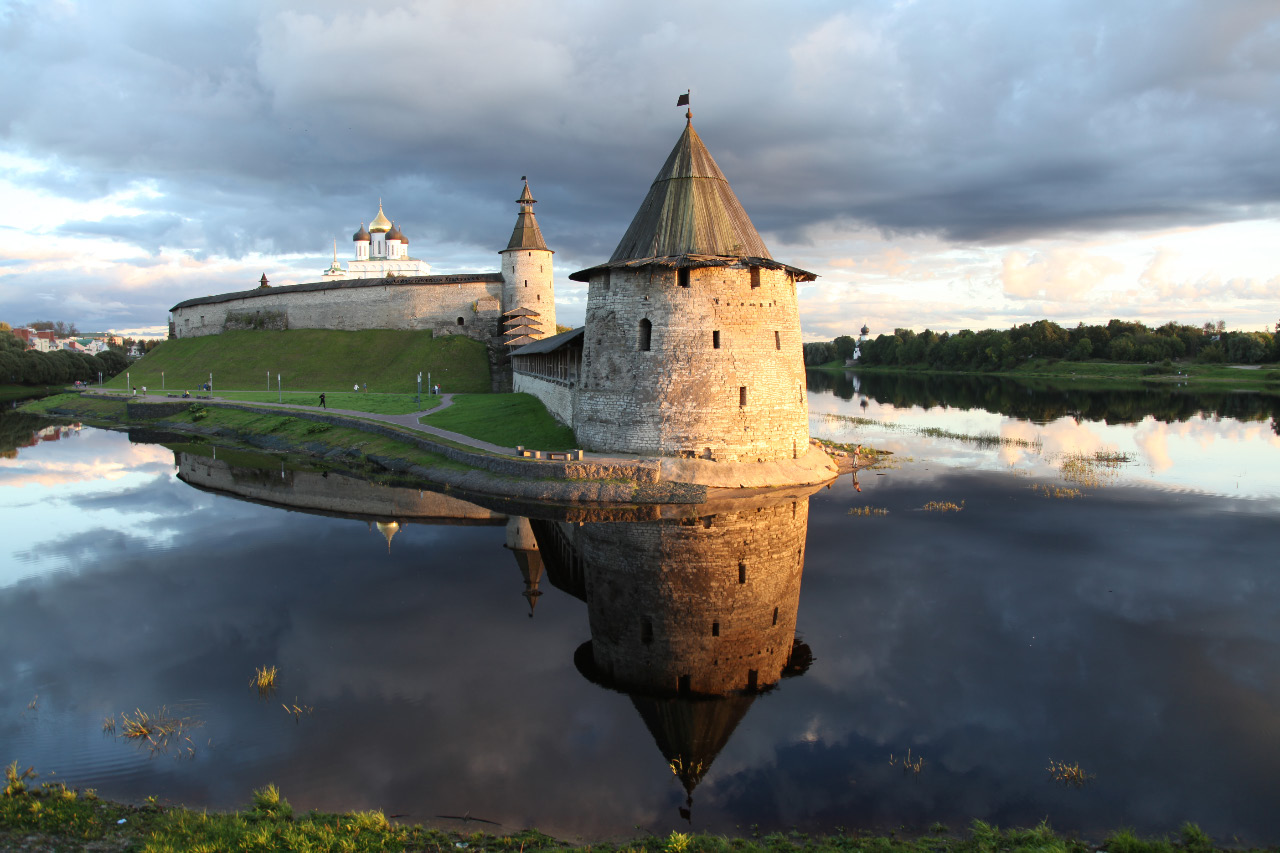 |
|
| |
Глядя в сторону Псковского Кремля и в месте, где река Пскова впадает в реку Великая, плоская башня стоит возле и находит свое отражение в реке Пскове.
Далее на юг стоит северная башня стены Псковского Кремля, Кутекрома башня, построить 1399 до 1400. |
|
| |
Looking toward the Pskov Kremlin and at the point where the Pskov River flows into the Great River, the Flat Tower stands nearest and is reflected in the Pskov River.
Further southward stands the northernmost tower of the Pskov Kremlin wall, the Kutekroma Tower, build 1399 to 1400. |
|
| |
To the viewer's left and on the opposite, left bank of the Great River, can be just barely made out the early XXI century Saint Olga Chapel, like the cross also pictured above, near the site where Grand Princess Saint Olga declared: "Быть Здесь Великому и Славному Граду – Let a Great and Glorious City be Here." Also visible near the same spot is the cupola of the XVI century Храм Успения Божией Матери "с Пароменья" – Church of the Assumption of the Mother of God "at the Ferry". |
|
|
|
|
|
|
| |
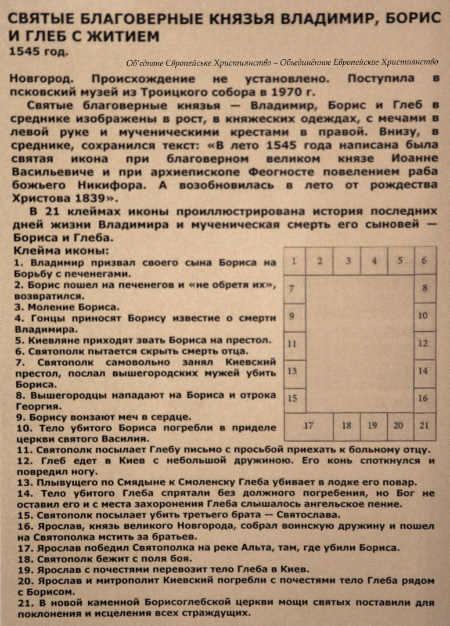 |
|
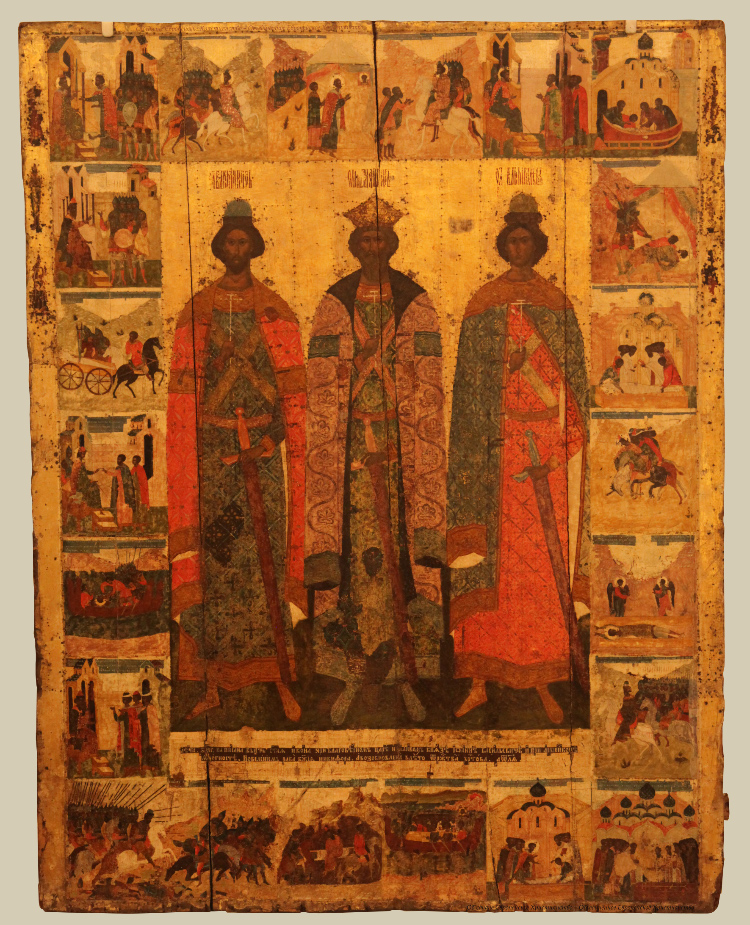 |
|
| |
|
|
Святые Благоверные Князья Владимир, Борис и Глеб с Житием–
Holy Grand Princes Vladimir, Boris and Gleb surrounded by Scenes from their Lives |
|
| |
|
|
XVI века икона в Псковского государственного объединенного историко-
архитектурного и художественного музея-заповедника –
XVI century icon in Pskov State United Historical and Architectural Museum-Reserve |
|
| |
|
|
|
|
| |
Борис – Барыс – Boris |
|
Глеб – Гліб – Gleb |
|
| |
При хрещенні прийняв християнське ім'я Роман |
|
При хрещенні прийняв християнське ім'я Давида |
|
| |
При крещении принял христианское имя Роман |
|
При крещении принял христианское имя Давида |
|
| |
Пры хрышчэнні прыняў хрысціянскае імя Раман |
|
Пры хрышчэнні прыняў хрысціянскае імя Давіда |
|
| |
At baptism took the Christian name of Roman |
|
At baptism took the Christian name of David |
|
| |
(* c. 986/990; reigned in Rostov from 1010; martyred on the River Alta on 24 July 1015 †) |
|
(* c. 987/990; reigned in Murom from 1013; martyred near Smolensk on 5 September 1015 †) |
|
| |
Both martyrs canonized in 1072 Anno Domini, the first Russian saints canonized.
( Though earlier martyred in Kievan Rus', on 12 July 978,
— possibly influencing Saint Vladimir to accept Christianity — were
Theodore the Varangian, born in X century Byzantium, and his son John
– Феодор-варяг і син його Іван – Феодор Варяг и сын его Иоанн ) |
|
| |
|
|
| |
Do we call Peter, Simon? Matthew is still called Levi? Paul, Saul? The Church and the world speak not of Abraham, but of Abram? |
|
| |
|
|
| |
The story of the martyrdom of Saint Roman and Saint David is one of the greatest in the entire thousand year saga of Christianity in Russia.
We will recall that Saint Olga did not succeed in bringing her son to acceptance of Christ Jesus and baptism into the Christian faith.
Свѧтославъ Игорєвичь (Old East Slavic) – Sveinald Ingvarsson (Old Norse) – Святослав Ігорович (Ukrainian) – Святослав Игоревич (Russian) – Святаслаў Ігаравіч (Belarusian) – Sviatoslav (or Svyatoslav) I Igorevich (c. 942 to 972) reigned nominally as Grand prince of Kiev from 945 (as a three-year-old toddler), but his mother, Saint Olga, was regent until 962/963. Thus Saint Olga, having received baptism herself in 957, reigned over Kievan Rus' for an additional six years as a Christian monarch during the ongoing minority of her son, Sviatoslav. Even under these circumstances, as also for the ten years he reigned in his own right, until his death at age thirty in 972, Sviatoslav was not brought to an acceptance of Christ. He is recorded as having sworn to treaties with the Byzantine Emperor, John I Tzimiskes, swearing by Slavic pagan (that is, false) deities Перун – Perun and Велесъ – Волос – Veles, as also having been afraid of losing the respect of the soldiers he commanded if he accepted Christianity.
Sviatoslav made his choice, but in light of this story one perhaps gains some insight into how it might have come to pass that, some four decades on, at the death of his son, Grand Prince Saint Vladimir Sviatoslavich, a similar tale unfolded. There are after all different levels of conversion.
|
|
| |
|
|
| beauty |
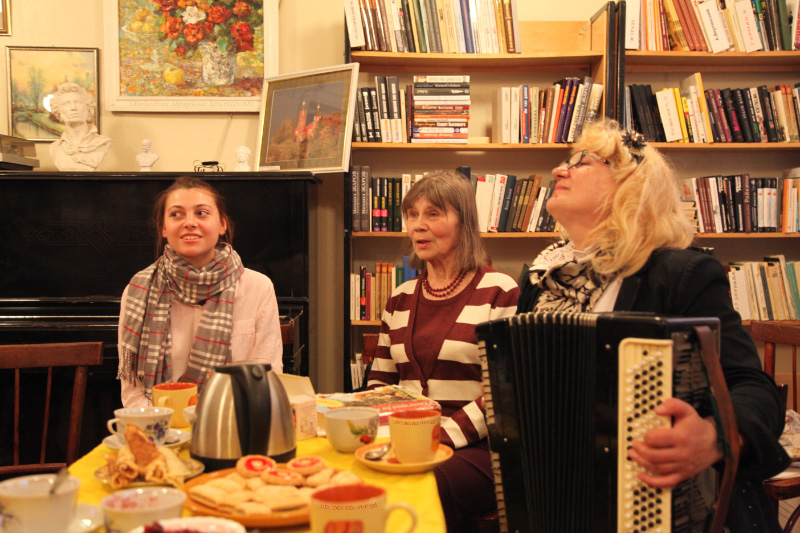 |
|
| |
Красота и Санта Лючия и Аккордеон |
|
| |
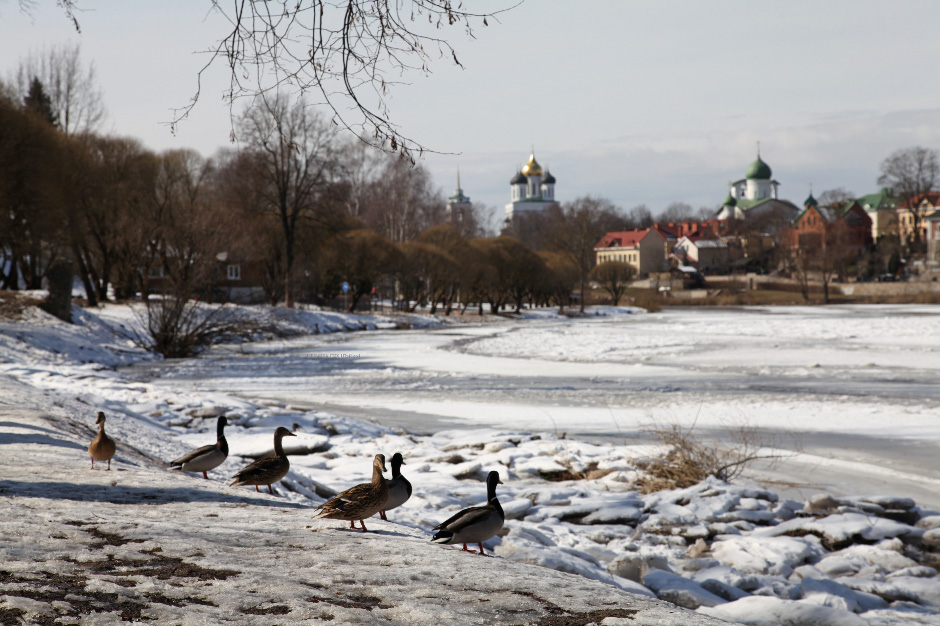 |
|
| |
Кряквы – mallards on the Pskov (or Pskova) River – Пскова Река and in the background the Троицкий Собор – Trinity Cathedral and further to the viewers' right the Храм Богоявления Господня – Church of the Epiphany (late XV century). The gentle blossom may not survive the Russian winter, but these exceptionally nice ducks seem to have, here on 25 March 2016. |
|
| |
Trinity Cathedral – Троицкий Собор |
|
| |
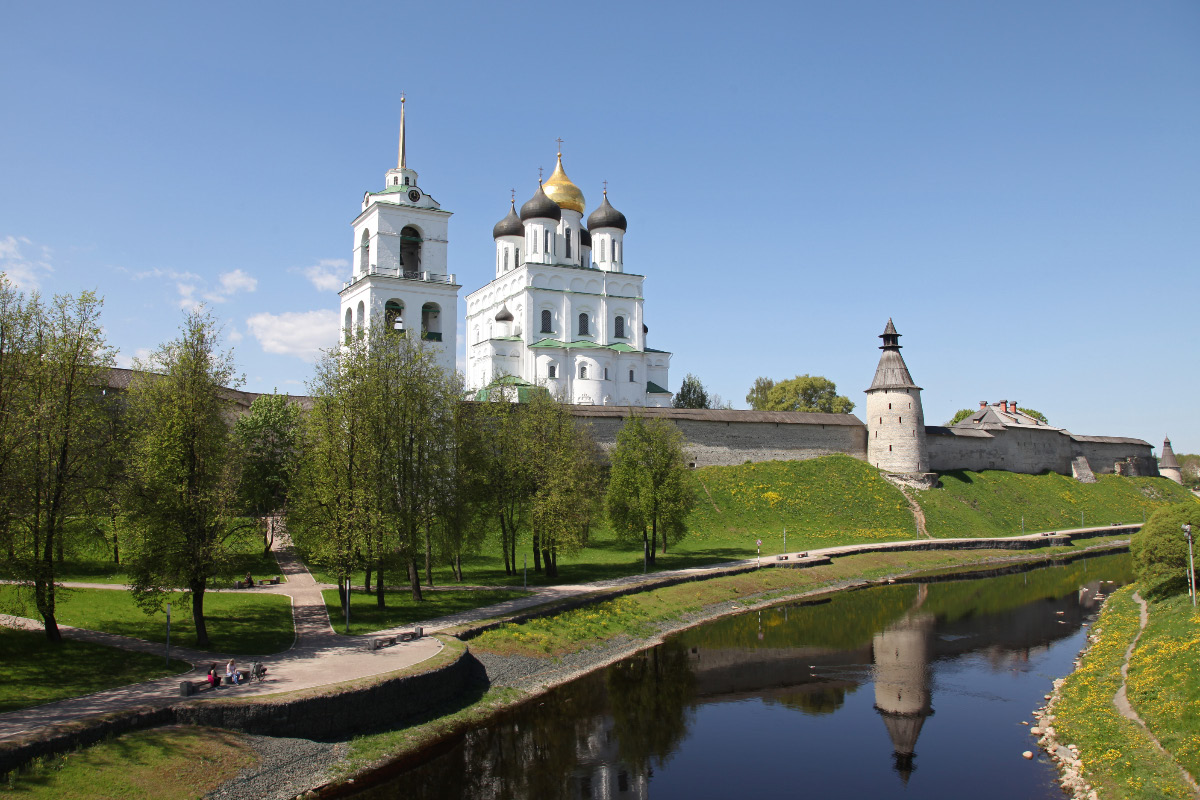 |
|
| |
Late XVII century Троицкий Собор – Trinity Cathedral and XIX century Колокольня – Belltower within the XV century walls of the Pskov Krom (or Kremlin) Псковский Кром - Кремль, a citadel with a history reaching back to the IX century, seen from the right banke (the east bank) of the Pskov (or Pskova) River – Пскова Река, pictured here with the May dandelions – одуванчик of 2016. |
|
|
|
|
| |
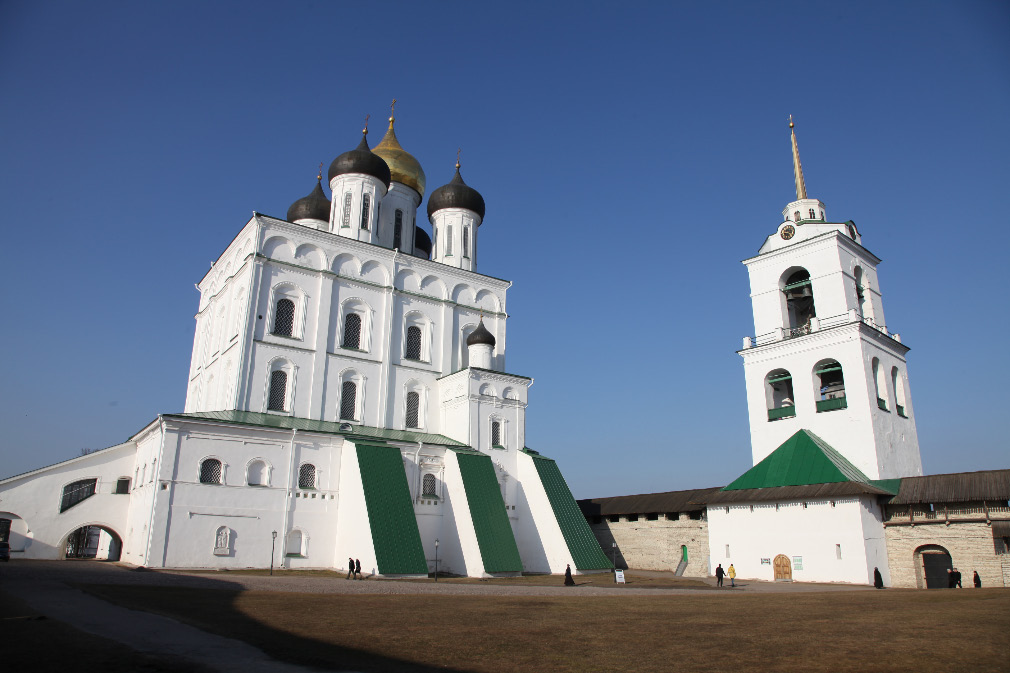 |
|
| |
As with many Churches in Russia and elsewhere, there were a number of earlier Church buildings on this same spot. This present structure dates to the very late XVII century, consecrated in 1699, and the bell tower is XIX century. Yet this Church has a special history, including the Tradition that Princess Saint Olga, while standing on the opposite, the left banke of the Velikaya River–the Great River–Река Великая during a visit to this her birth town in 857 beheld three rays of sunlight piercing the sky and shining on this spot, on which she then vowed to build a Church dedicated to the Holy Trinity – Троицкий Собор. The date of the first wooden Church is not known, but the first stone Church was built in 1138. Since 1589 Trinity Cathedral has been the seat of the Pskov Eparchy. Many reading these lines will recall that the late XVI century — indeed the entire XVI century — was an especially busy time for internecine warring European Christendom. One of the hallmark events of this time, indeed the very year 1589, was the recognition by the Patriarchate of Constantinople of the Autocephaly of the Russian Orthodox Church, the Patriarchate of Moscow. The patriarchs of the ancient churches — the "Pentarchy" less Rome of Constantinople, Alexandria, Antioch and Jerusalem — recognized the Russian patriarch as the sixth in honor, or rather fifth, as Rome, they believed and believe, was in heretical schism. But then this is what we are about healing. And, whether paradoxically or not, we see Moscow, in a very Realpolitik sort of way, as being not Fifth or Sixth, but Third. Or perhaps, in recognition of six centuries of Constantinopolitan Realities , together with an intense desire for unity also with the Non-Chalcedonian Churches, one might rather speak of Constantinople-Moscow somehow sharing the Second place of honor, after Rome. But of course this is for the two of them and for an Ecumenical Council to sort out.
Turning to a darker time, the 1930s under the Bolsheviks and the 1940s under the National Socialists, it is curious to note that this exceptional Church, having been completely closed by the Communists after their Living Church experiment in enforced entropy failed, was actually reopened by the Nazi Germans and as a Russian Orthodox Church and for the purpose of reinvigorating Christian, and specifically Russian Orthodox spirituality and Church life and charity (prisoners, orphans), as a remedy for atheist Jew Bolshevism! This program or movement was called the Псковская Православная Миссия– Pskov Orthodox Mission – Pskowska Misja Prawosławna. Do not expect to learn much about it though from sources Jewish or Moscow Patriarchate or ROCOR or post-Soviet-Kleptocratic–Клептократия. In other words, do not expect to find reference to it anywhere. All this not unsettling enough? Apparantly the movement was initiated by the Reich Minister for the Occupied Eastern Territories, Alfred Rosenberg ! |
|
| |
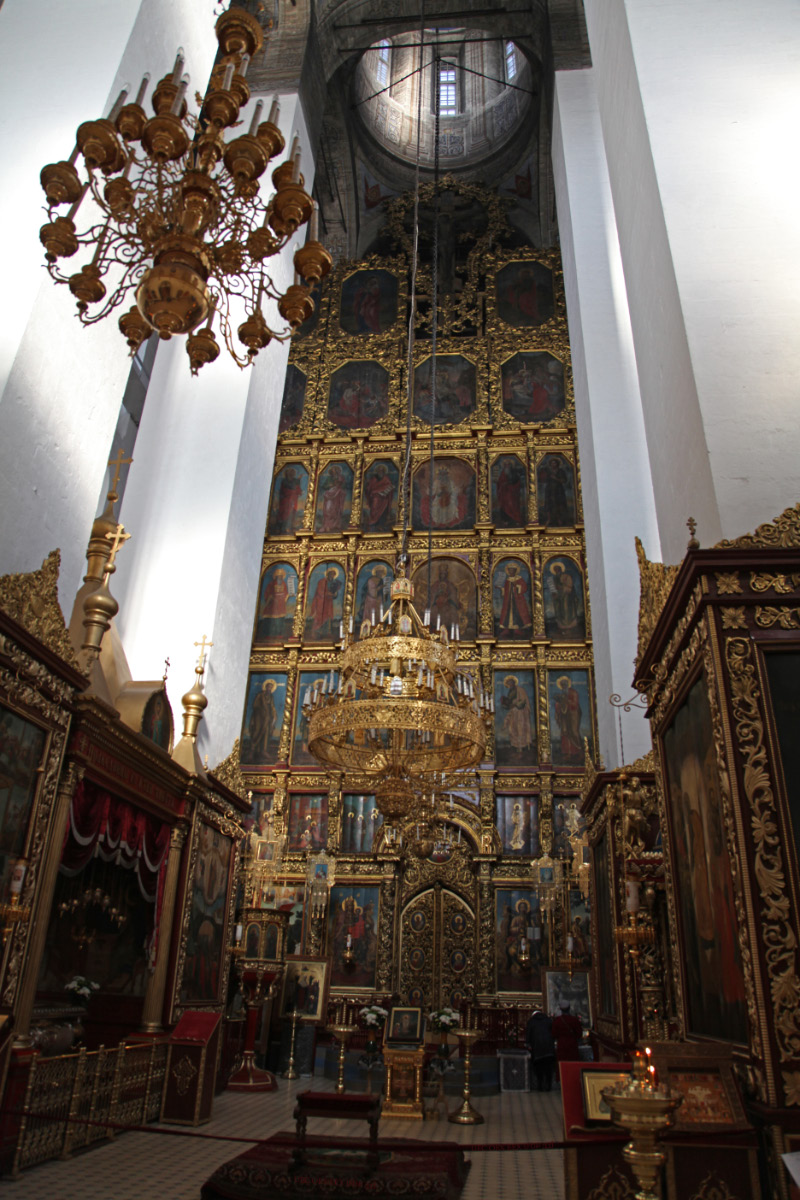 |
|
| |
S
Seven-tier iconostases are exceptional. |
| |
Чирская (Псковская) икона Божией Матери – Chirskaya Theotokos
translated to Pskov in 1420 during a deadly epidemic, which thereafter ceased |
|
| |
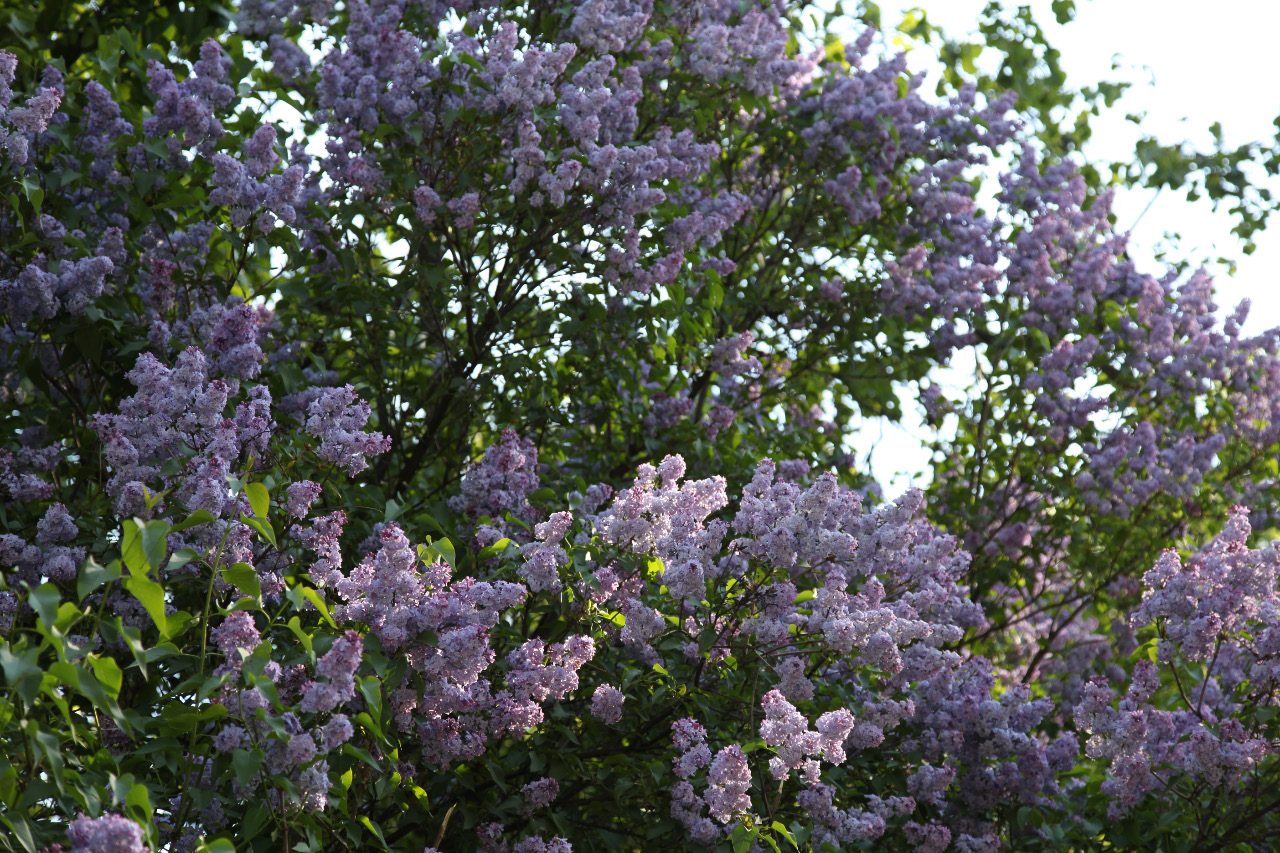 |
|
| |
the seventeenth of May |
|
|
|
|
| |
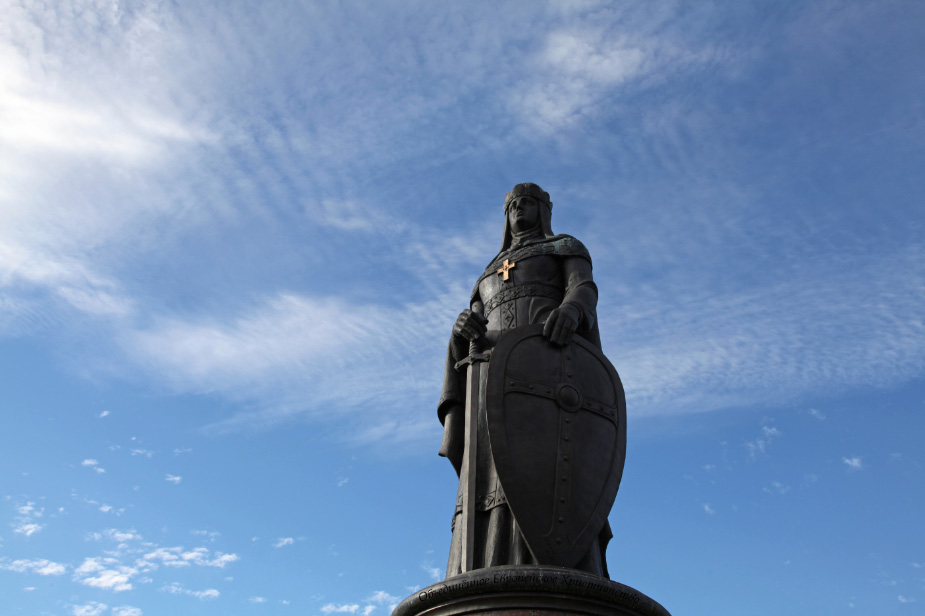 |
|
| |
three crosses |
|
| |
ზურაბ კონსტანტინეს ძე წერეთელი – Zurab Konstantines dze Tsereteli – Зураб Константинович Церетели (* 1934) |
|
| |
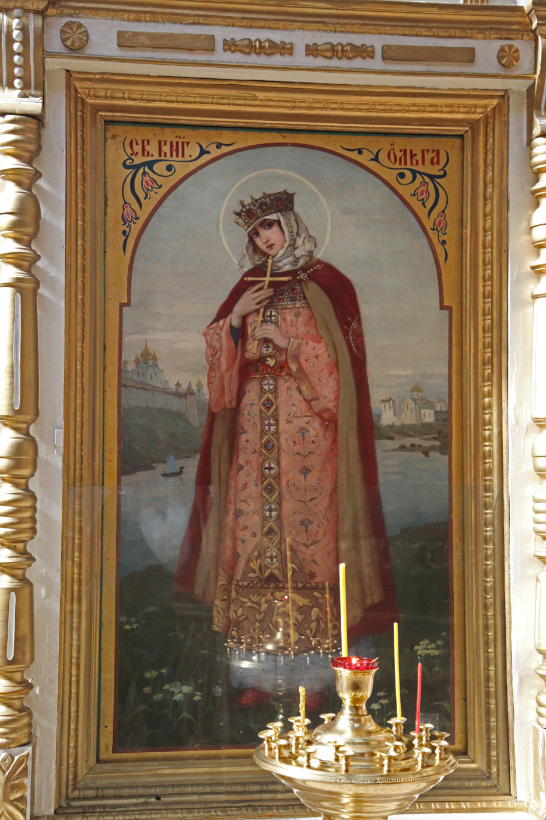 |
|
| |
Святая Ольга Київська Княгиня – Saint Olga Princess of Kyiv,
1892 by Михаил Васильевич Нестеров – Mikhail Vasilyevich Nesterov (1862-1942) |
|
| ... copy from original in |
|
|
| |
|
|
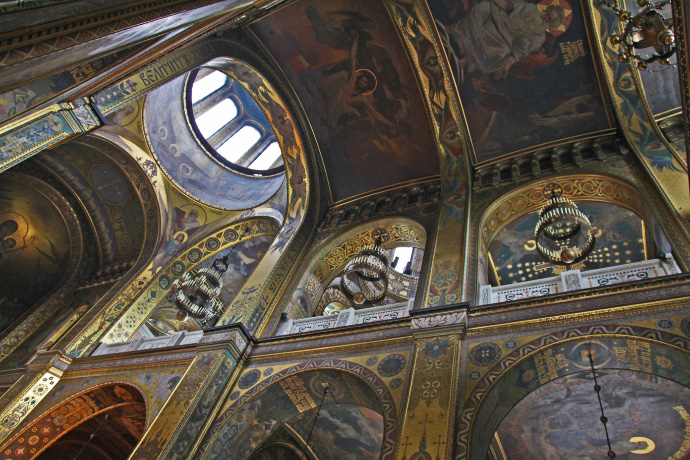 |
|
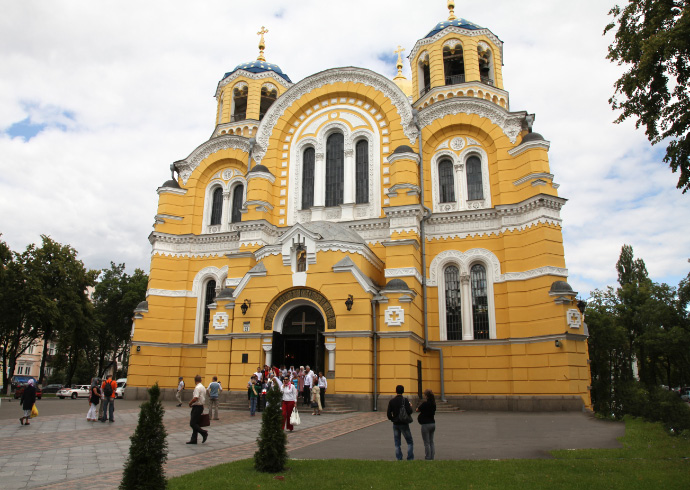 |
| Патріарший кафедральний собор св. Володимира – Saint Volodymyr's Cathedral in Кыѥвъ – Київ – Kyiv – Kiev – Киев – Kijów – Кіеў |
|
| |
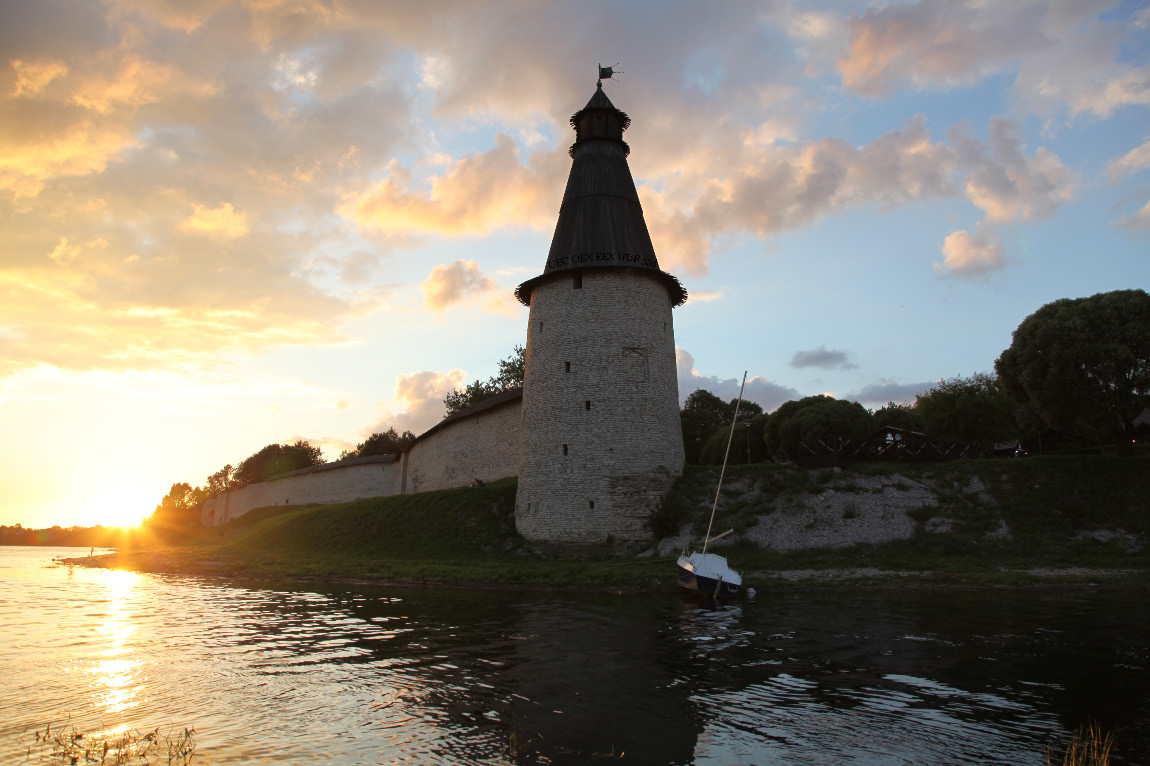 |
|
| |
Высокая (Воскресенская) башня – the High or Resurrection Tower, as waters of the Pskov River round the corner and flow into the Great River, at sunset on 6 July 2016. |
|
| |
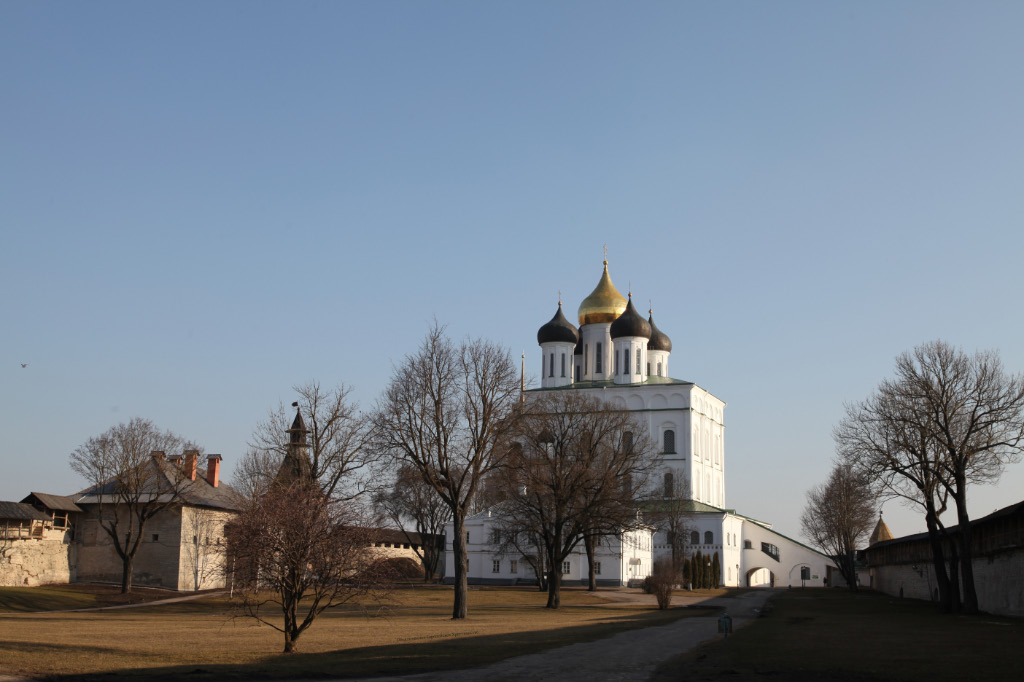 |
|
| |
Троицкий Собор – Holy Trinity Cathedral inside the late XIV century citadel walls of the Pskov Krom (or Kremlin) Псковский Кром - Кремль |
|
| |
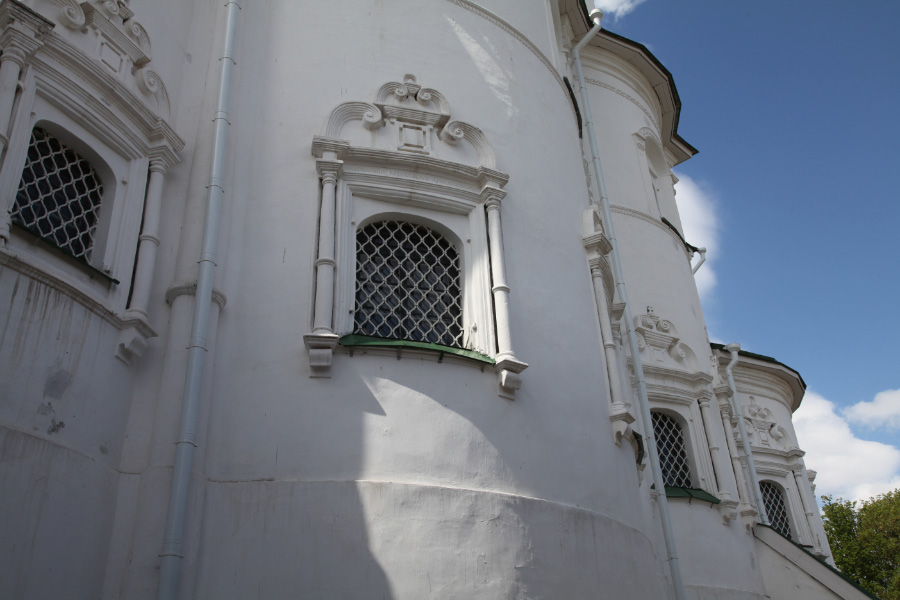 |
|
| |
... a bit of Baroque, though only on the lowest row of windows on Holy Trinity Cathedral – Троицкий Собор |
|
| |
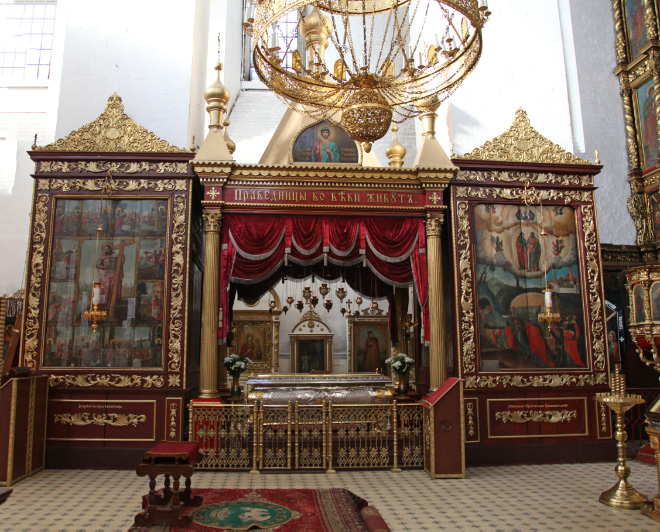
|
|
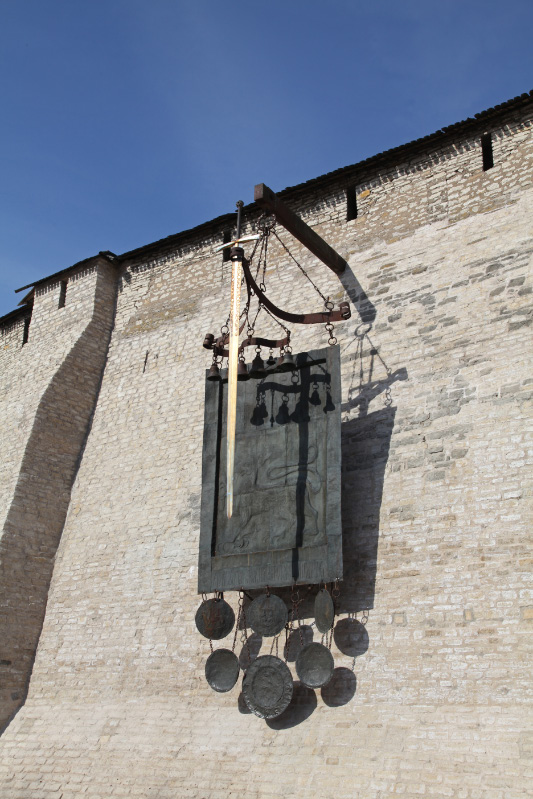 |
|
| |
|
|
Симфония Церкви и Государства – Symphony of Church and State |
|
| |
Тимофей-Довмонт Князь Псковский – Daumantas Prince of Pskov from 1266 to 1299, was a Lithuanian minor prince, and a pagan, who took the Christian name of Timothy after he was baptized into the Russian Orthodox Church. |
|
A very good thing. But pray tell, what percentage of Russian Orthodox saints were either princes or monks? No one else in Russia lived a life of heroic virtue, meriting emulation? |
|
| |
|
|
|
|
|
|
| |
It is better to take refuge in the Lord |
|
Put not your trust in princes, |
|
| |
than to put confidence in princes. |
|
in a son of man, in whom there is no help. |
|
| |
|
Psalm 118:9 |
|
|
Psalm 146:3 |
|
| |
|
|
|
|
|
|
| |
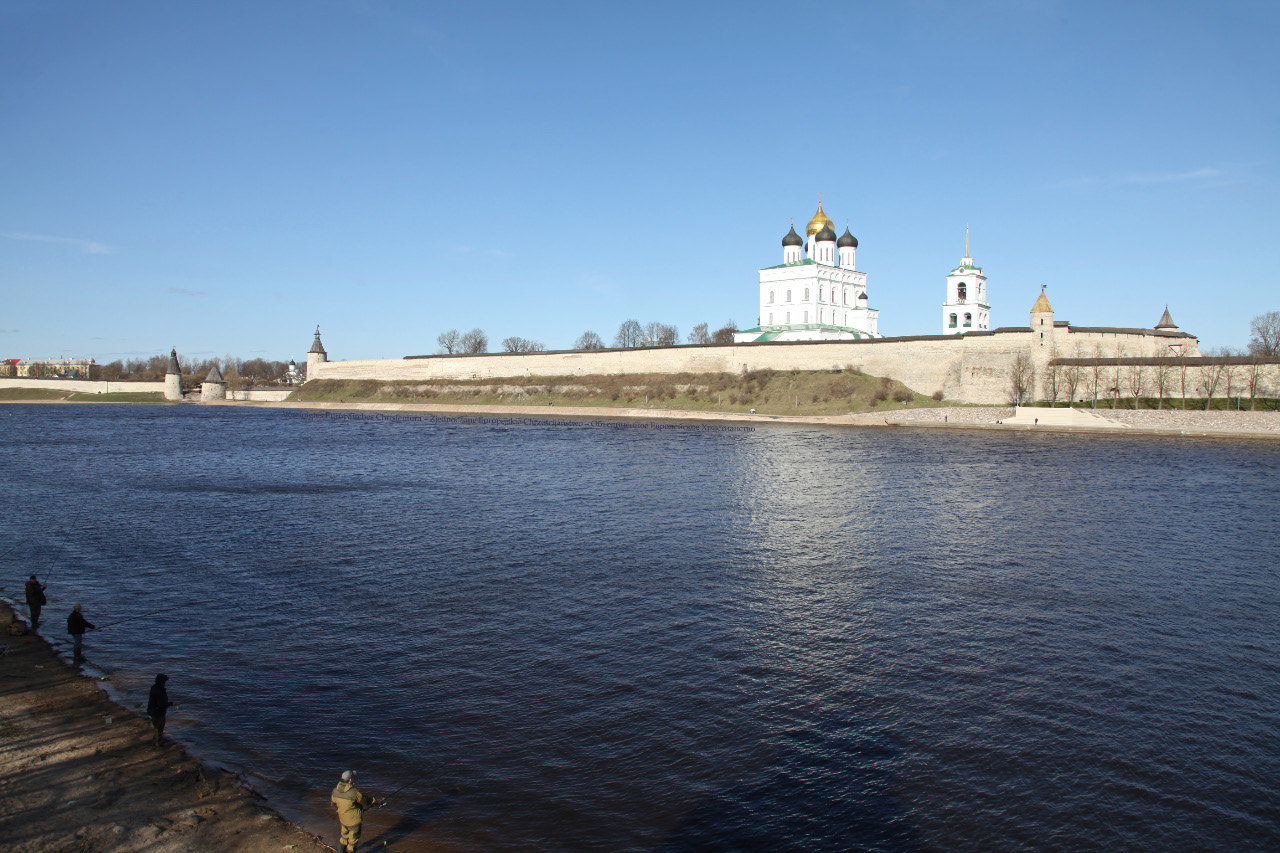 |
|
| |
Pskov Krom (or Kremlin) Псковский Кром - Кремль seen from Left Banke, from West Banke of the Grand River, the Velikaya River – Великая Река |
|
| |
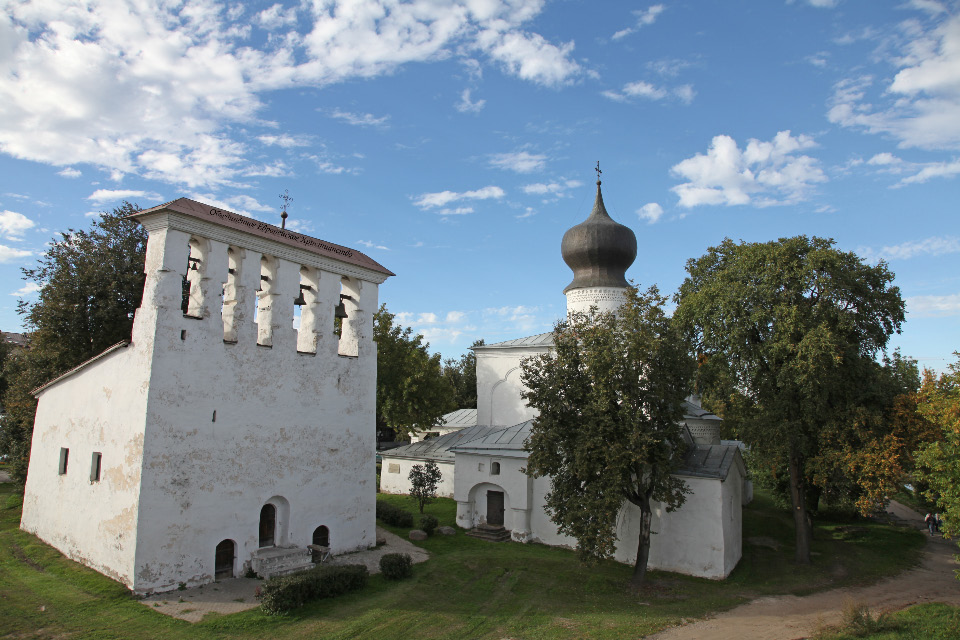 |
|
| |
XVI century Храм Успения Божией Матери "с Пароменья" – Church of the Assumption of the Mother of God "at the Ferry," also with XVI century belfry – Звонница, built on still older Church dating to 1444, pictured here on 15 September 2016. |
|
|
|
|
| |
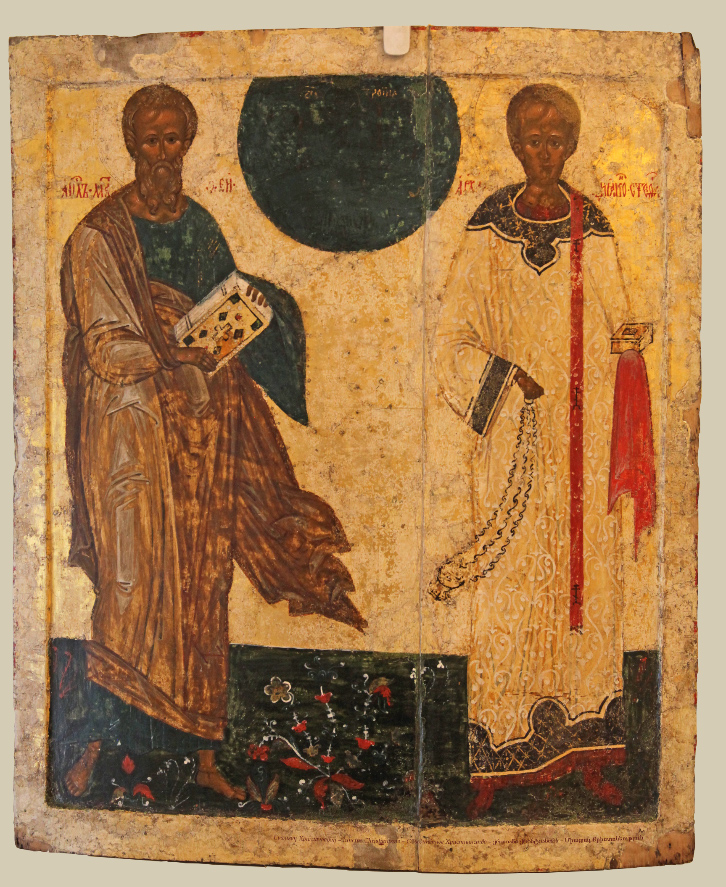 |
|
| |
XVI века икона в Псковского государственного объединенного историко-
архитектурного и художественного музея-заповедника –
XVI century icon in Pskov State United Historical and Architectural Museum-Reserve |
|
| |
|
|
| |
Апостол Евангелист Святой Матфей и Архидиакон и Первый Мученик Святой Стефан
Apostle Evangelist Saint Matthew and Archdeacon and First Martyr Saint Stephen |
|
В эти дни, когда умножились ученики, произошел у Еллинистов ропот на Евреев за то, что вдовицы их пренебрегаемы были в ежедневном раздаянии потребностей. Тогда двенадцать [Апостолов], созвав множество учеников, сказали: нехорошо нам, оставив слово Божие, пещись о столах. Итак, братия, выберите из среды себя семь человек изведанных, исполненных Святаго Духа и мудрости; их поставим на эту службу, а мы постоянно пребудем в молитве и служении слова. И угодно было это предложение всему собранию; и избрали Стефана, мужа, исполненного веры и Духа Святаго, и Филиппа, и Прохора, и Никанора, и Тимона, и Пармена, и Николая Антиохийца, обращенного из язычников; их поставили перед Апостолами, и [сии], помолившись, возложили на них руки.
И слово Божие росло, и число учеников весьма умножалось в Иерусалиме; и из священников очень многие покорились вере.
А Стефан, исполненный веры и силы, совершал великие чудеса и знамения в народе. Некоторые из так называемой синагоги Либертинцев и Киринейцев и Александрийцев и некоторые из Киликии и Асии вступили в спор со Стефаном; но не могли противостоять мудрости и Духу, Которым он говорил. Тогда научили они некоторых сказать: мы слышали, как он говорил хульные слова на Моисея и на Бога. И возбудили народ и старейшин и книжников и, напав, схватили его и повели в синедрион. И представили ложных свидетелей, которые говорили: этот человек не перестает говорить хульные слова на святое место сие и на закон. Ибо мы слышали, как он говорил, что Иисус Назорей разрушит место сие и переменит обычаи, которые передал нам Моисей. И все, сидящие в синедрионе, смотря на него, видели лице его, как лице Ангела.
Тогда сказал первосвященник: так ли это?
Но он сказал: мужи братия и отцы! послушайте. Бог славы явился отцу нашему Аврааму в Месопотамии, прежде переселения его в Харран, и сказал ему: выйди из земли твоей и из родства твоего и из дома отца твоего, и пойди в землю, которую покажу тебе. Тогда он вышел из земли Халдейской и поселился в Харране; а оттуда, по смерти отца его, переселил его [Бог] в сию землю, в которой вы ныне живете. И не дал ему на ней наследства ни на стопу ноги, а обещал дать ее во владение ему и потомству его по нем, когда еще был он бездетен. И сказал ему Бог, что потомки его будут переселенцами в чужой земле и будут в порабощении и притеснении лет четыреста. Но Я, сказал Бог, произведу суд над тем народом, у которого они будут в порабощении; и после того они выйдут и будут служить Мне на сем месте. И дал ему завет обрезания. По сем родил он Исаака и обрезал его в восьмой день; а Исаак [родил] Иакова, Иаков же двенадцать патриархов.
Патриархи, по зависти, продали Иосифа в Египет; но Бог был с ним, и избавил его от всех скорбей его, и даровал мудрость ему и благоволение царя Египетского фараона, [который] и поставил его начальником над Египтом и над всем домом своим. И пришел голод и великая скорбь на всю землю Египетскую и Ханаанскую, и отцы наши не находили пропитания. Иаков же, услышав, что есть хлеб в Египте, послал [туда] отцов наших в первый раз. А когда (они пришли) во второй раз, Иосиф открылся братьям своим, и известен стал фараону род Иосифов. Иосиф, послав, призвал отца своего Иакова и все родство свое, душ семьдесят пять. Иаков перешел в Египет, и скончался сам и отцы наши; и перенесены были в Сихем и положены во гробе, который купил Авраам ценою серебра у сынов Еммора Сихемова.
А по мере, как приближалось время [исполниться] обетованию, о котором клялся Бог Аврааму, народ возрастал и умножался в Египте, до тех пор, как восстал иной царь, который не знал Иосифа. Сей, ухищряясь против рода нашего, притеснял отцов наших, принуждая их бросать детей своих, чтобы не оставались в живых. В это время родился Моисей, и был прекрасен пред Богом. Три месяца он был питаем в доме отца своего. А когда был брошен, взяла его дочь фараонова и воспитала его у себя, как сына. И научен был Моисей всей мудрости Египетской, и был силен в словах и делах.
Когда же исполнилось ему сорок лет, пришло ему на сердце посетить братьев своих, сынов Израилевых. И, увидев одного из них обижаемого, вступился и отмстил за оскорбленного, поразив Египтянина. Он думал, поймут братья его, что Бог рукою его дает им спасение; но они не поняли. На следующий день, когда некоторые из них дрались, он явился и склонял их к миру, говоря: вы братья; зачем обижаете друг друга? Но обижающий ближнего оттолкнул его, сказав: кто тебя поставил начальником и судьею над нами? Не хочешь ли ты убить и меня, как вчера убил Египтянина? От сих слов Моисей убежал и сделался пришельцем в земле Мадиамской, где родились от него два сына.
По исполнении сорока лет явился ему в пустыне горы Синая Ангел Господень в пламени горящего тернового куста. Моисей, увидев, дивился видению; а когда подходил рассмотреть, был к нему глас Господень: Я Бог отцов твоих, Бог Авраама и Бог Исаака и Бог Иакова. Моисей, объятый трепетом, не смел смотреть. И сказал ему Господь: сними обувь с ног твоих, ибо место, на котором ты стоишь, есть земля святая.Я вижу притеснение народа Моего в Египте, и слышу стенание его, и нисшел избавить его: итак пойди, Я пошлю тебя в Египет.
Сего Моисея, которого они отвергли, сказав: кто тебя поставил начальником и судьею? сего Бог чрез Ангела, явившегося ему в терновом кусте, послал начальником и избавителем. Сей вывел их, сотворив чудеса и знамения в земле Египетской, и в Чермном море, и в пустыне в продолжение сорока лет. Это тот Моисей, который сказал сынам Израилевым: Пророка воздвигнет вам Господь Бог ваш из братьев ваших, как меня; Его слушайте. Это тот, который был в собрании в пустыне с Ангелом, говорившим ему на горе Синае, и с отцами нашими, и который принял живые слова, чтобы передать нам, которому отцы наши не хотели быть послушными, но отринули его и обратились сердцами своими к Египту, сказав Аарону: сделай нам богов, которые предшествовали бы нам; ибо с Моисеем, который вывел нас из земли Египетской, не знаем, что случилось. И сделали в те дни тельца, и принесли жертву идолу, и веселились перед делом рук своих. Бог же отвратился и оставил их служить воинству небесному, как написано в книге пророков:
дом Израилев! приносили ли вы Мне заколения и жертвы в продолжение сорока лет в пустыне? Вы приняли скинию Молохову и звезду бога вашего Ремфана, изображения, которые вы сделали, чтобы поклоняться им: и Я переселю вас далее Вавилона.
Скиния свидетельства была у отцов наших в пустыне, как повелел Говоривший Моисею сделать ее по образцу, им виденному. Отцы наши с Иисусом, взяв ее, внесли во владения народов, изгнанных Богом от лица отцов наших. [Так было] до дней Давида. Сей обрел благодать пред Богом и молил, [чтобы] найти жилище Богу Иакова. Соломон же построил Ему дом. Но Всевышний не в рукотворенных храмах живет, как говорит пророк:
Небо—престол Мой, и земля—подножие ног Моих. Какой дом созиждете Мне, говорит Господь, или какое место для покоя Моего? Не Моя ли рука сотворила всё сие?
Жестоковыйные! люди с необрезанным сердцем и ушами! вы всегда противитесь Духу Святому, как отцы ваши, так и вы. Кого из пророков не гнали отцы ваши? Они убили предвозвестивших пришествие Праведника, Которого предателями и убийцами сделались ныне вы, — вы, которые приняли закон при служении Ангелов и не сохранили.
Слушая сие, они рвались сердцами своими и скрежетали на него зубами. Стефан же, будучи исполнен Духа Святаго, воззрев на небо, увидел славу Божию и Иисуса, стоящего одесную Бога, и сказал: вот, я вижу небеса отверстые и Сына Человеческого, стоящего одесную Бога. Но они, закричав громким голосом, затыкали уши свои, и единодушно устремились на него, и, выведя за город, стали побивать его камнями. Свидетели же положили свои одежды у ног юноши, именем Савла, и побивали камнями Стефана, который молился и говорил: Господи Иисусе! приими дух мой. И, преклонив колени, воскликнул громким голосом: Господи! не вмени им греха сего. И, сказав сие, почил.
Савл же одобрял убиение его.
В те дни произошло великое гонение на церковь в Иерусалиме; и все, кроме Апостолов, рассеялись по разным местам Иудеи и Самарии. Стефана же погребли мужи благоговейные, и сделали великий плач по нем. |
|
Now in these days when the disciples were increasing in number, the Hellenists murmured against the Hebrews because their widows were neglected in the daily distribution. And the twelve summoned the body of the disciples and said, “It is not right that we should give up preaching the word of God to serve tables. Therefore, brethren, pick out from among you seven men of good repute, full of the Spirit and of wisdom, whom we may appoint to this duty. But we will devote ourselves to prayer and to the ministry of the word.” And what they said pleased the whole multitude, and they chose Stephen, a man full of faith and of the Holy Spirit, and Philip, and Prochorus, and Nicanor, and Timon, and Parmenas, and Nicolaus, a proselyte of Antioch. These they set before the apostles, and they prayed and laid their hands upon them.
And the word of God increased; and the number of the disciples multiplied greatly in Jerusalem, and a great many of the priests were obedient to the faith.
And Stephen, full of grace and power, did great wonders and signs among the people. Then some of those who belonged to the synagogue of the Freedmen (as it was called), and of the Cyrenians, and of the Alexandrians, and of those from Cilicia and Asia, arose and disputed with Stephen. But they could not withstand the wisdom and the Spirit with which he spoke. Then they secretly instigated men, who said, “We have heard him speak blasphemous words against Moses and God.” And they stirred up the people and the elders and the scribes, and they came upon him and seized him and brought him before the council, and set up false witnesses who said, “This man never ceases to speak words against this holy place and the law; for we have heard him say that this Jesus of Nazareth will destroy this place, and will change the customs which Moses delivered to us.” 15 And gazing at him, all who sat in the council saw that his face was like the face of an angel.
And the high priest said, “Is this so?” And Stephen said:
“Brethren and fathers, hear me. The God of glory appeared to our father Abraham, when he was in Mesopotamia, before he lived in Haran, and said to him, ‘Depart from your land and from your kindred and go into the land which I will show you.’ Then he departed from the land of the Chaldeans, and lived in Haran. And after his father died, God removed him from there into this land in which you are now living; yet he gave him no inheritance in it, not even a foot’s length, but promised to give it to him in possession and to his posterity after him, though he had no child. And God spoke to this effect, that his posterity would be aliens in a land belonging to others, who would enslave them and ill-treat them four hundred years. ‘But I will judge the nation which they serve,’ said God, ‘and after that they shall come out and worship me in this place.’ And he gave him the covenant of circumcision. And so Abraham became the father of Isaac, and circumcised him on the eighth day; and Isaac became the father of Jacob, and Jacob of the twelve patriarchs.
“And the patriarchs, jealous of Joseph, sold him into Egypt; but God was with him, and rescued him out of all his afflictions, and gave him favor and wisdom before Pharaoh, king of Egypt, who made him governor over Egypt and over all his household. Now there came a famine throughout all Egypt and Canaan, and great affliction, and our fathers could find no food. But when Jacob heard that there was grain in Egypt, he sent forth our fathers the first time. And at the second visit Joseph made himself known to his brothers, and Joseph’s family became known to Pharaoh. And Joseph sent and called to him Jacob his father and all his kindred, seventy-five souls; and Jacob went down into Egypt. And he died, himself and our fathers, and they were carried back to Shechem and laid in the tomb that Abraham had bought for a sum of silver from the sons of Hamor in Shechem.
“But as the time of the promise drew near, which God had granted to Abraham, the people grew and multiplied in Egypt till there arose over Egypt another king who had not known Joseph. He dealt craftily with our race and forced our fathers to expose their infants, that they might not be kept alive. At this time Moses was born, and was beautiful before God. And he was brought up for three months in his father’s house; and when he was exposed, Pharaoh’s daughter adopted him and brought him up as her own son. And Moses was instructed in all the wisdom of the Egyptians, and he was mighty in his words and deeds.
“When he was forty years old, it came into his heart to visit his brethren, the sons of Israel. And seeing one of them being wronged, he defended the oppressed man and avenged him by striking the Egyptian. He supposed that his brethren understood that God was giving them deliverance by his hand, but they did not understand. And on the following day he appeared to them as they were quarreling and would have reconciled them, saying, ‘Men, you are brethren, why do you wrong each other?’ But the man who was wronging his neighbor thrust him aside, saying, ‘Who made you a ruler and a judge over us? Do you want to kill me as you killed the Egyptian yesterday?’ At this retort Moses fled, and became an exile in the land of Midian, where he became the father of two sons.
“Now when forty years had passed, an angel appeared to him in the wilderness of Mount Sinai, in a flame of fire in a bush. When Moses saw it he wondered at the sight; and as he drew near to look, the voice of the Lord came, I am the God of your fathers, the God of Abraham and of Isaac and of Jacob. And Moses trembled and did not dare to look. And the Lord said to him, Take off the shoes from your feet, for the place where you are standing is holy ground. I have surely seen the ill-treatment of my people that are in Egypt and heard their groaning, and I have come down to deliver them. And now come, I will send you to Egypt.
“This Moses whom they refused, saying, ‘Who made you a ruler and a judge?’ God sent as both ruler and deliverer by the hand of the angel that appeared to him in the bush. He led them out, having performed wonders and signs in Egypt and at the Red Sea, and in the wilderness for forty years. This is the Moses who said to the Israelites, ‘God will raise up for you a prophet from your brethren as he raised me up.’ This is he who was in the congregation in the wilderness with the angel who spoke to him at Mount Sinai, and with our fathers; and he received living oracles to give to us. Our fathers refused to obey him, but thrust him aside, and in their hearts they turned to Egypt, saying to Aaron, ‘Make for us gods to go before us; as for this Moses who led us out from the land of Egypt, we do not know what has become of him.’ And they made a calf in those days, and offered a sacrifice to the idol and rejoiced in the works of their hands. But God turned and gave them over to worship the host of heaven, as it is written in the book of the prophets:
‘Did you offer to me slain beasts and sacrifices,
forty years in the wilderness, O house of Israel?
And you took up the tent of Moloch,
and the star of the god Rephan,
the figures which you made to worship;
and I will remove you beyond Babylon.’
“Our fathers had the tent of witness in the wilderness, even as he who spoke to Moses directed him to make it, according to the pattern that he had seen. Our fathers in turn brought it in with Joshua when they dispossessed the nations which God thrust out before our fathers. So it was until the days of David, who found favor in the sight of God and asked leave to find a habitation for the God of Jacob. But it was Solomon who built a house for him. Yet the Most High does not dwell in houses made with hands; as the prophet says,
‘Heaven is my throne,
and earth my footstool.
What house will you build for me, says the Lord,
or what is the place of my rest?
Did not my hand make all these things?’
“You stiff-necked people, uncircumcised in heart and ears, you always resist the Holy Spirit. As your fathers did, so do you. Which of the prophets did not your fathers persecute? And they killed those who announced beforehand the coming of the Righteous One, whom you have now betrayed and murdered, you who received the law as delivered by angels and did not keep it.”
Now when they heard these things they were enraged, and they ground their teeth against him. But he, full of the Holy Spirit, gazed into heaven and saw the glory of God, and Jesus standing at the right hand of God; and he said, “Behold, I see the heavens opened, and the Son of man standing at the right hand of God.” But they cried out with a loud voice and stopped their ears and rushed together upon him. Then they cast him out of the city and stoned him; and the witnesses laid down their garments at the feet of a young man named Saul. And as they were stoning Stephen, he prayed, “Lord Jesus, receive my spirit.” And he knelt down and cried with a loud voice, “Lord, do not hold this sin against them.” And when he had said this, he fell asleep.
And Saul was consenting to his death.
And on that day a great persecution arose against the church in Jerusalem; and they were all scattered throughout the region of Judea and Samaria, except the apostles. Devout men buried Stephen, and made great lamentation over him. |
| |
Деяния Святых Апостолов 6:1 до 8:2 |
|
|
Acts of the Apostles 6:1 through 8:2 |
| |
Свято-Успенский Псково-Печерский Монастырь – Holy Dormition Pskov Monastery of the Caves |
|
| |
|
|
| |
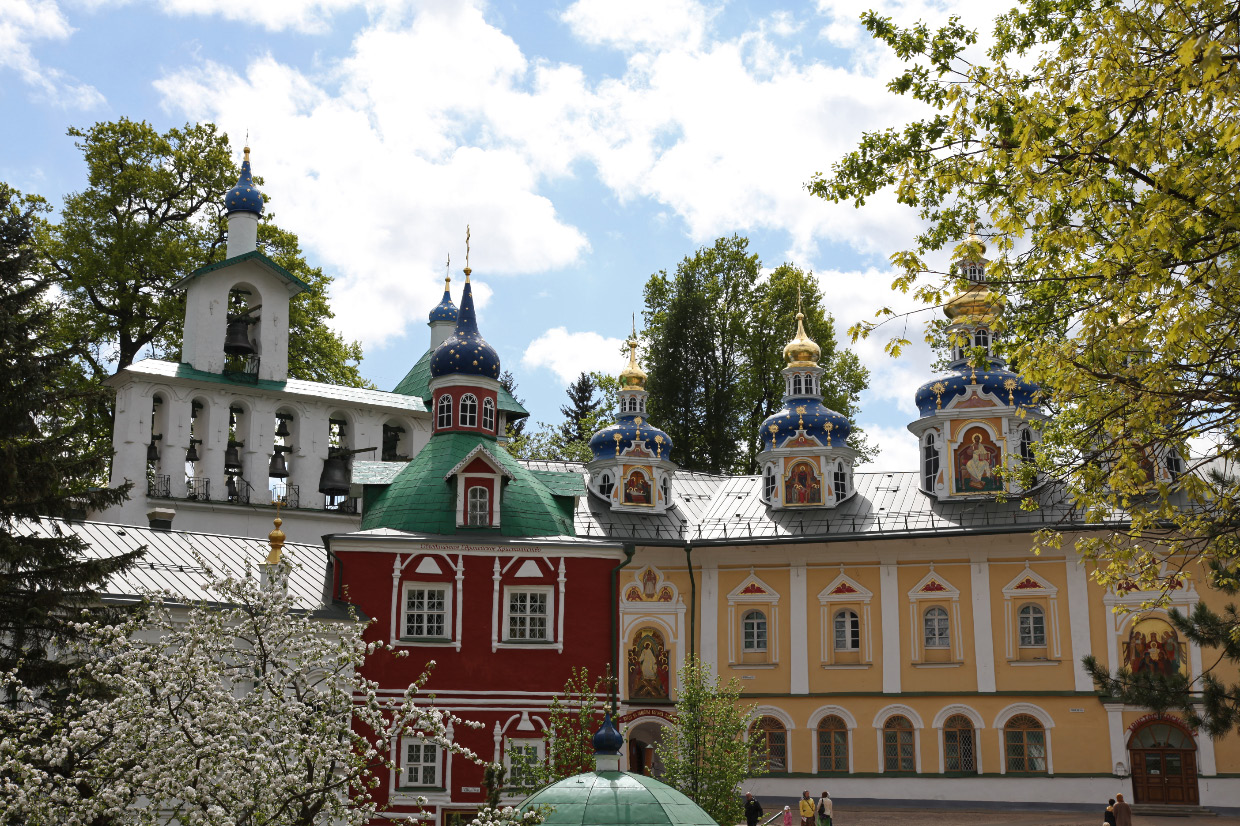 |
|
| |
At the Pskov Monastery of the Caves: Большая звонница – large belfry (1523) > Ризница – Sacristy (c. XVI century) >
Купола Успенско-Покровской Церкви – XIX c. cupolas above the Intercession (1759) and Dormition (1473) Churches sharing a common wall. |
|
|
|
|
| |
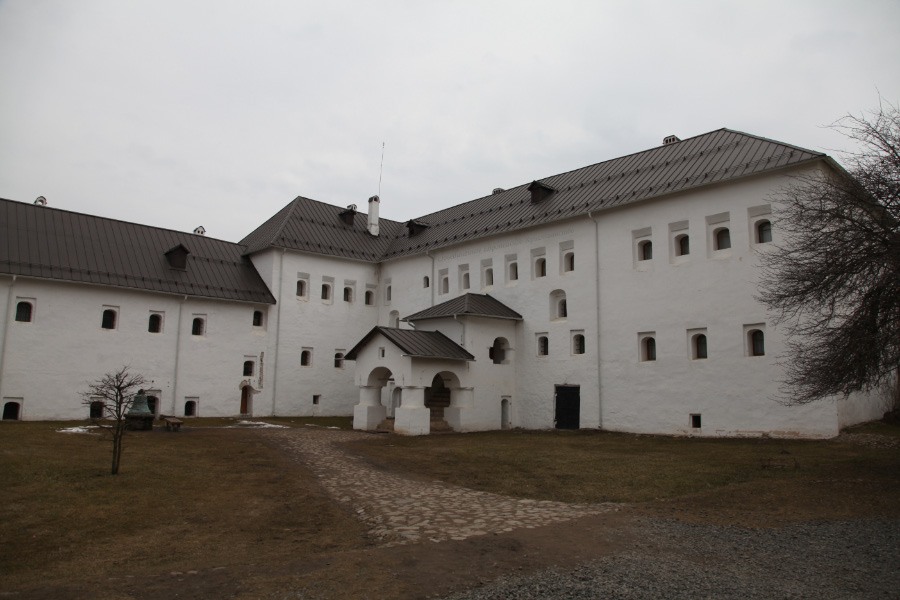 |
|
| |
Псковского государственного объединенного историко-архитектурного и художественного музея-заповедника –
Pskov State United Historical and Architectural Museum-Reserve |
|
| |
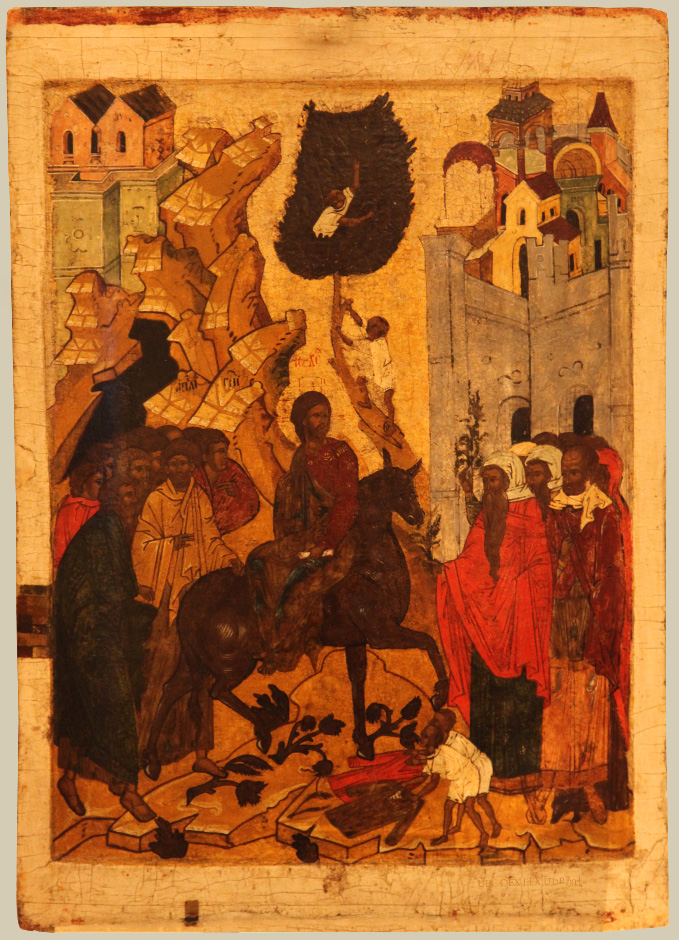 |
|
| |
Вход Господень в Иерусалим – Entry into Jerusalem |
|
Первая половина XVI века, икона в Псковского государственного объединенного историко-архитектурного и художественного музея-заповедника –
First half of XVI century, icon in Pskov State United Historical and Architectural Museum-Reserve |
|
Храм Климента Папы Римского – Church of Pope Saint Clement |
|
| |
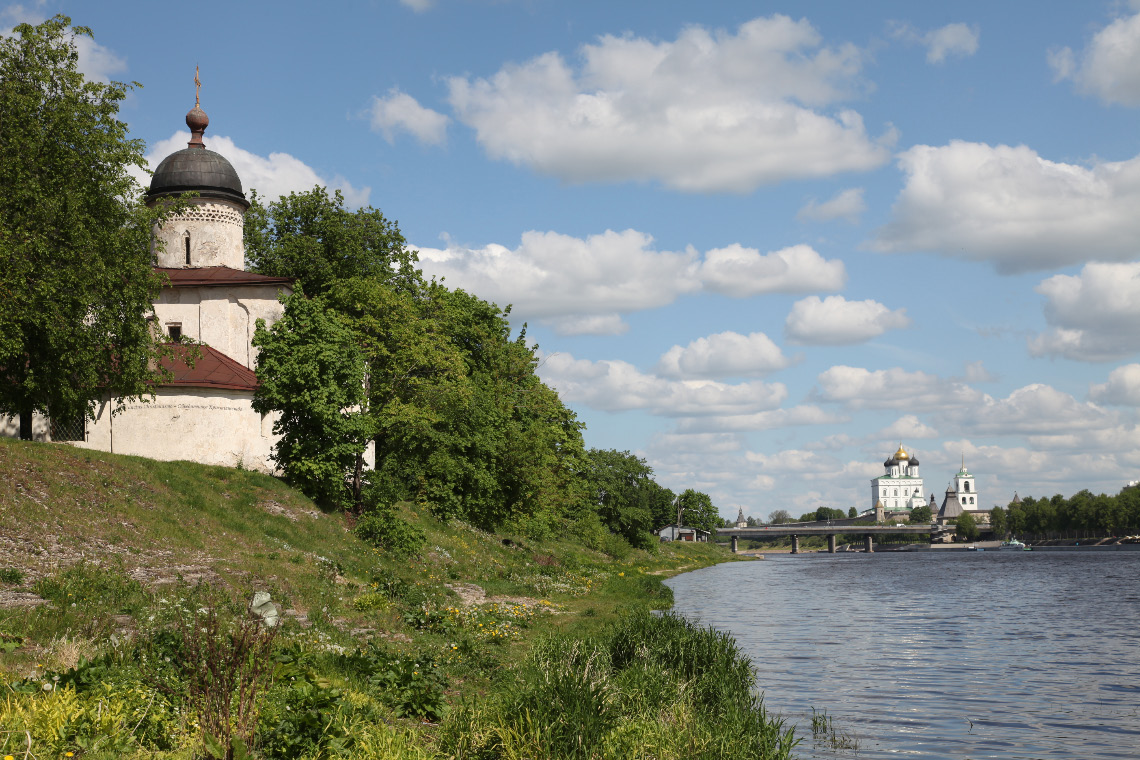 |
|
| |
The Храм Климента Папы Римского – Church of Pope Saint Clement needs some repairs, but five or six centuries on, she is still standing here on the western, the left bank of the Velikaya River–the Great River–Река Великая. ... And to the viewers right at about 2 kilometers' distance, on the eastern, right bank of the river stands the Trinity Cathedral – Троицкий Собор inside the XV century Pskov Kremlin – Псковский Кром. |
|
| |
|
|
| |
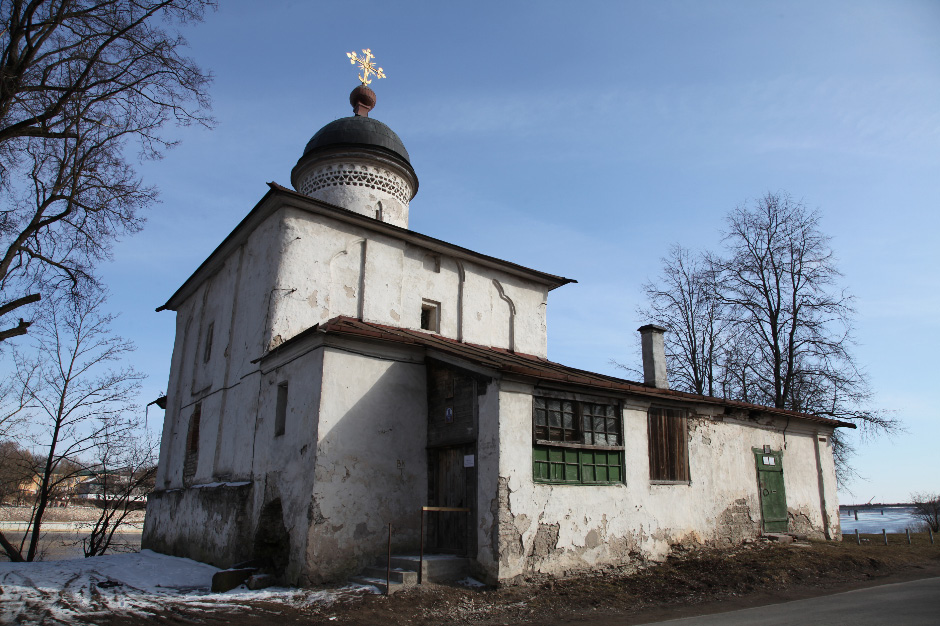 |
|
| |
Perhaps dating even to the first half of the XIV century (see «Историческая топография Пскова в XIV-XV веках» 1985 г.), pictured is the Church of Pope Saint Clement in Pskov – Храм Климента Папы Римского в Пскове, dedicated also to martyr for Christ and His Holy Orthodox-Catholic Church, Archbishop Saint Peter of Alexandria (311 †. ) Please forgive me if I am being childish. The unresolved issues are many and serious, but I experience a wave of joy everytime I see a Supreme Pontiff so honored in Russia. This church I stumbled onto on Holy Saturday of 2016, according to the Catholic Calendar. |
|
| |
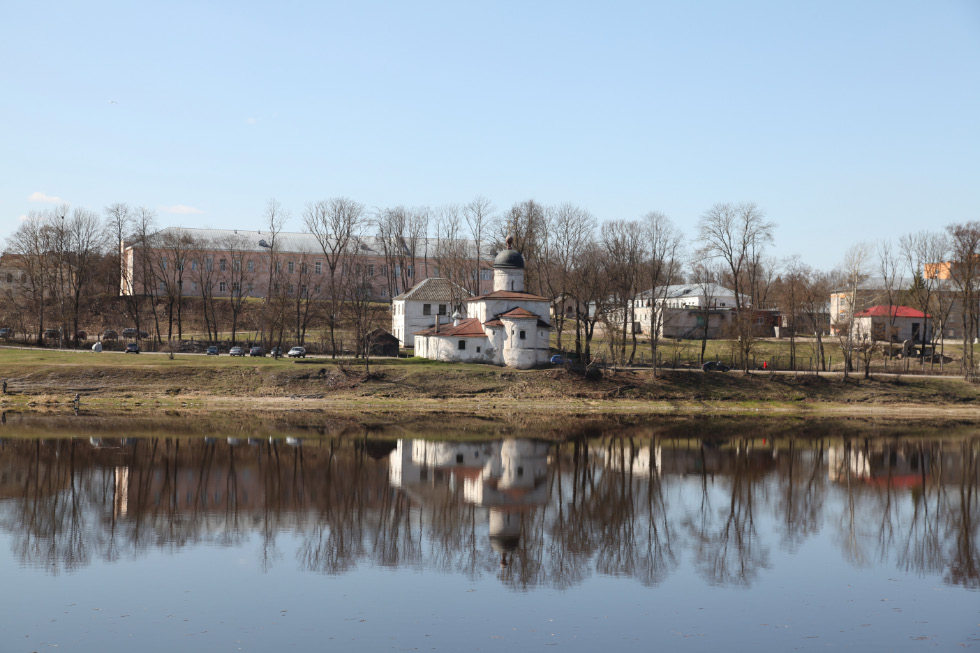 |
|
| |
Church of Pope Saint Clement in Pskov – Храм Климента Папы Римского в Пскове, situated on the left banke of the Great River – Vekikaya-Великая Река as she (or is it he, Old Man River) makes her way to her delta and to Lake Peipus Псковско-Чудское Озеро, only about 20 kilometers to the northwest from this point. |
|
|
|
|
| |
Господь Крѣпость Людемъ Своимъ Дястъ – Господь Блягословитъ Люди Своѧ Миромъ
Lord Fortress of Your People – Lord Bless us with Your Peace
Слава въ Вышнихъ Богу
Glory to God in the Highest |
|
| |
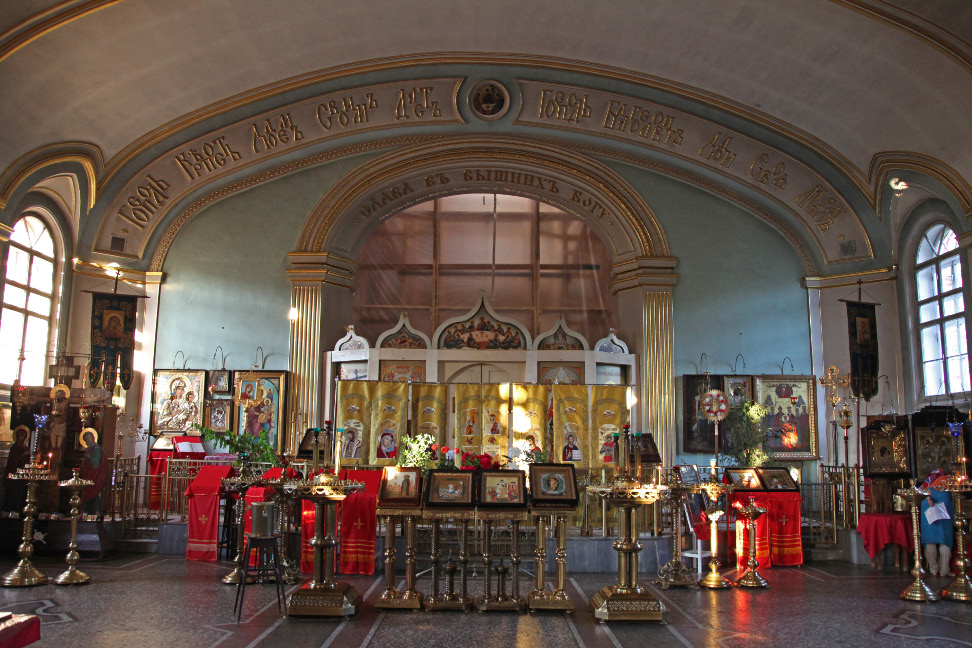 |
|
| |
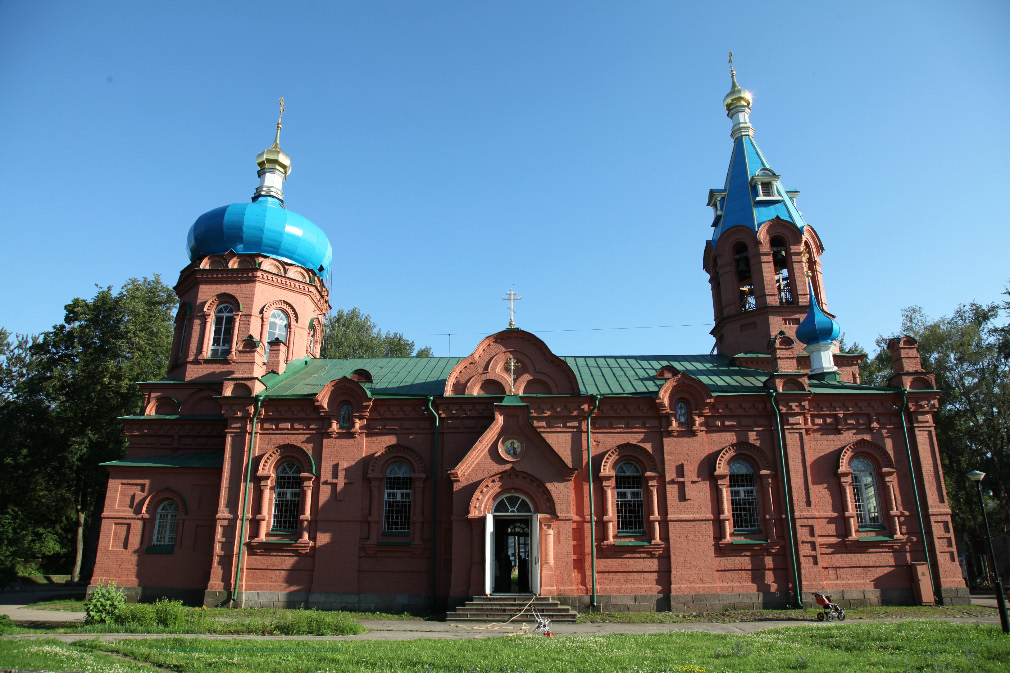 |
|
| |
... and from the north looking south to the north side of the Church |
|
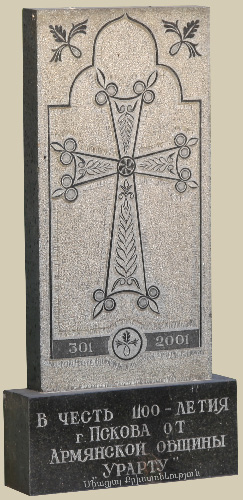 |
|
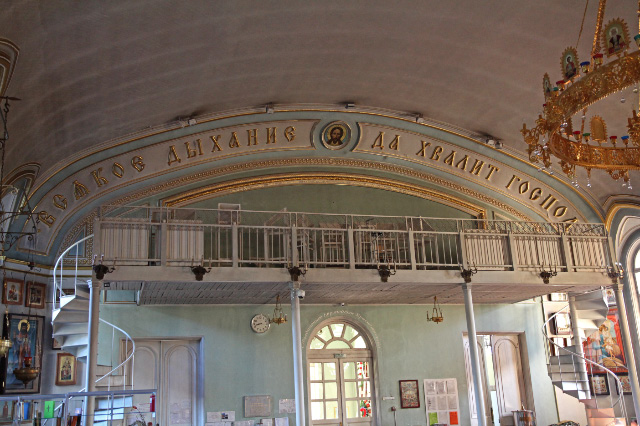 |
| Such monuments honoring the Armenian Church and her faithful — Oriental Orthodox; Non-Chalcedonians; not in Communion with the Orthodox, Russian or otherwise — in Russia and on the grounds of Russian Orthodox Churches, while not exactly common, are to be found. Similar tributes to, similar grace shown to, Catholics and their Churches, including those in the various "Eastern Rites", are unheard of, that portion of the Schism being circa six centuries shorter in duration vis-à-vis the Schism at and after Chalcedon (in which conflict Catholics and Orthodox were on the same side), notwithstanding. |
|
Всѧкое Дыхание Да Хвалит Господ
Every breath praise the Lord
|
| |
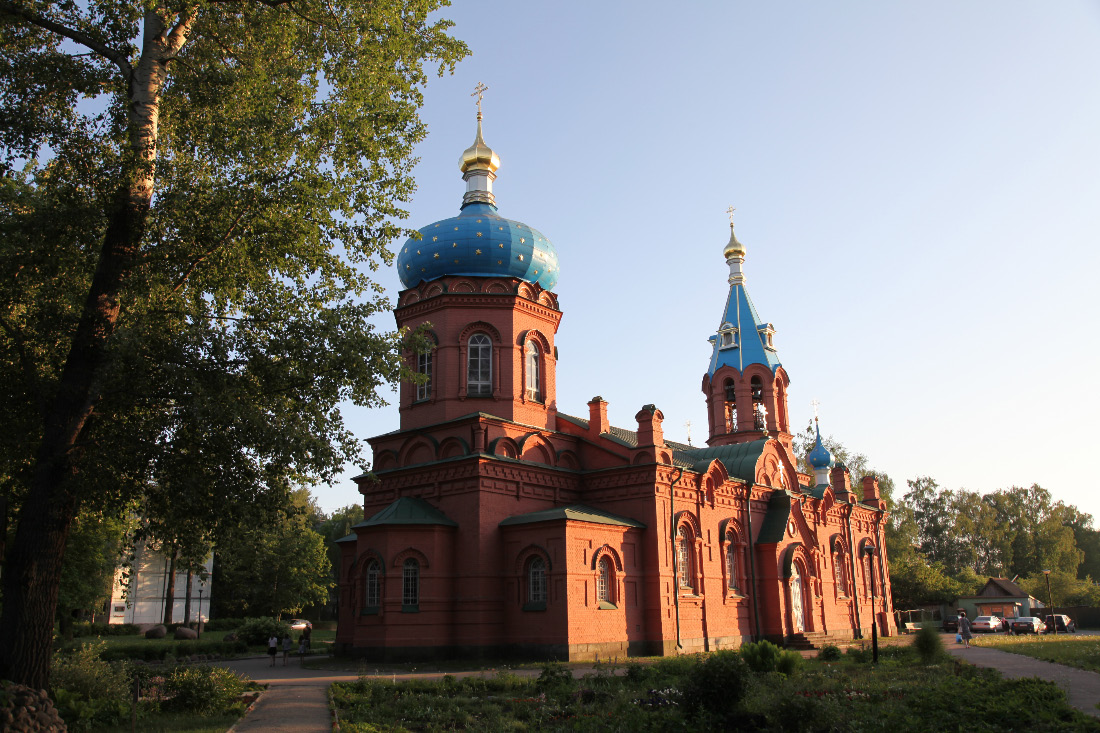 |
|
| |
About 500 meters, west and a little to the south, from the Church dedicated to Clement is a half millennium newer Church dedicated to a man who really can not be considered a hero of Orthodox-Catholic Christian unity. Built in 1908, the Храм Александра Невского в Пскове – Church of Alexander Nevsky in Pskov has seen a lot and endured a lot. If a personal note is permissible, I appreciate these ornate brick Churches perhaps even more than the plaster-covered and whitewashed brick Church buildings so ubiquitous throughout Pskov and all of Russia. |
|
| |
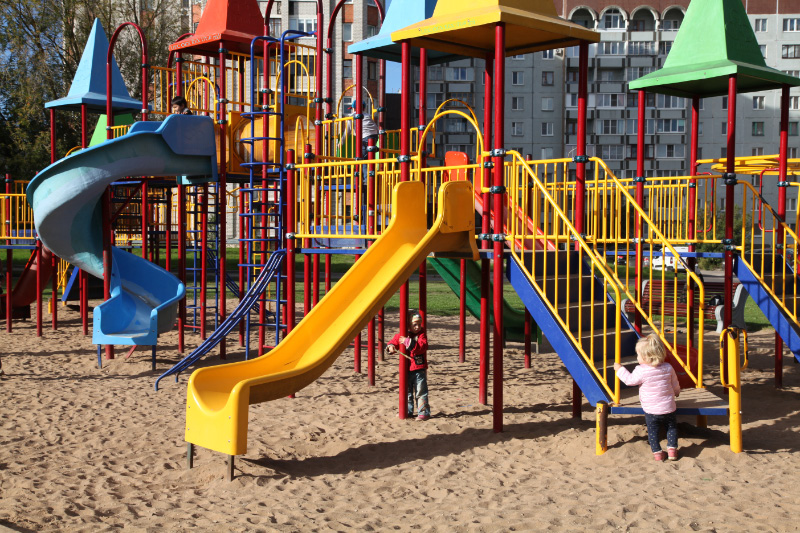 |
|
| |
Рижская |
|
| |
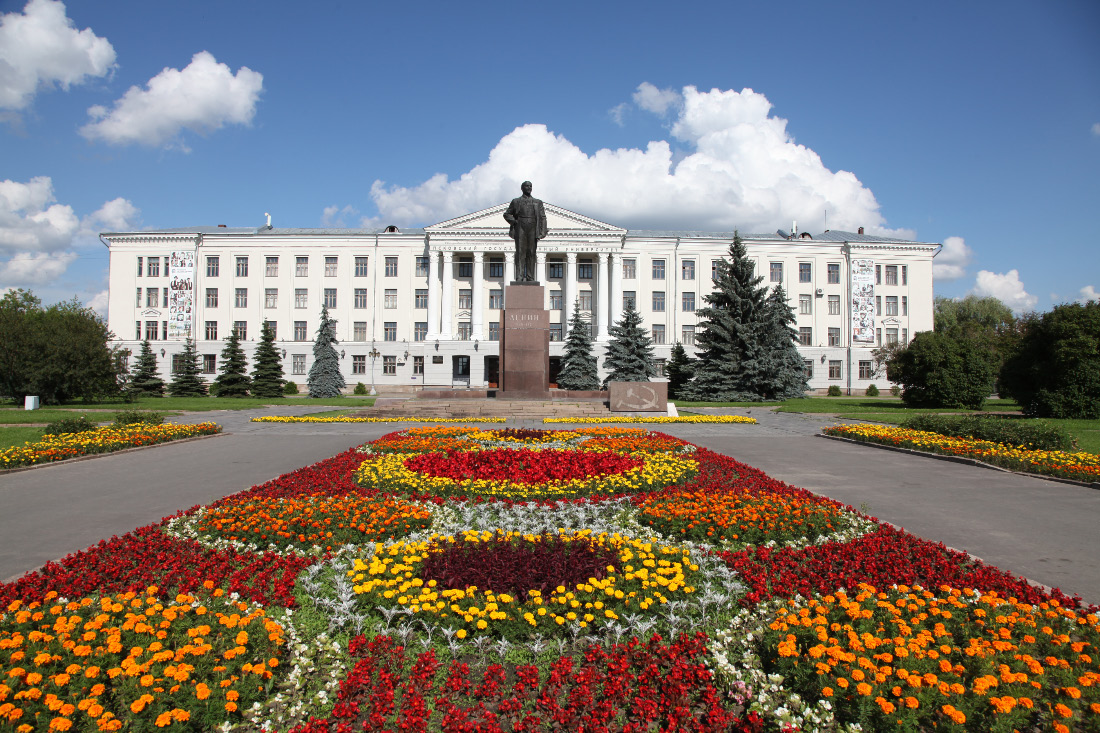 |
|
| |
This guy's presence is always such a drag, and even in 2016 he is all over Russia. |
|
| |
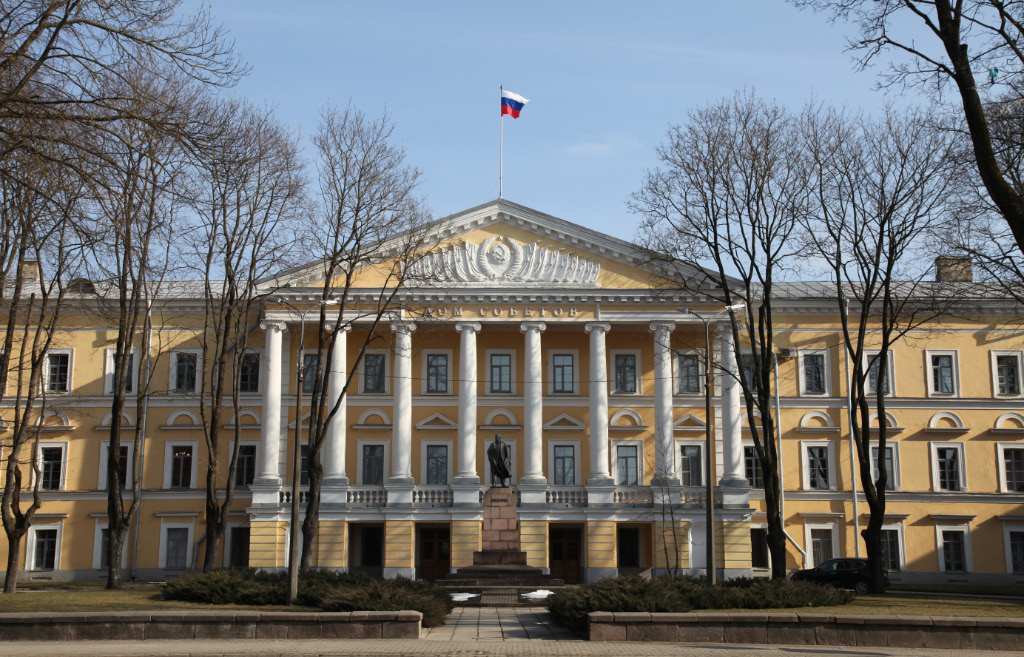 |
|
| |
Dom Sovietov |
|
| |
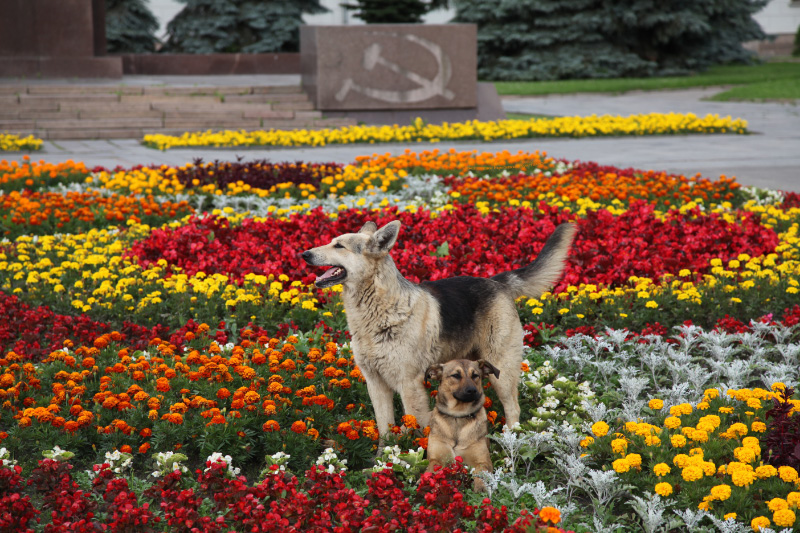 |
|
| |
... Ладно – OK, now that is much better. |
|
| |
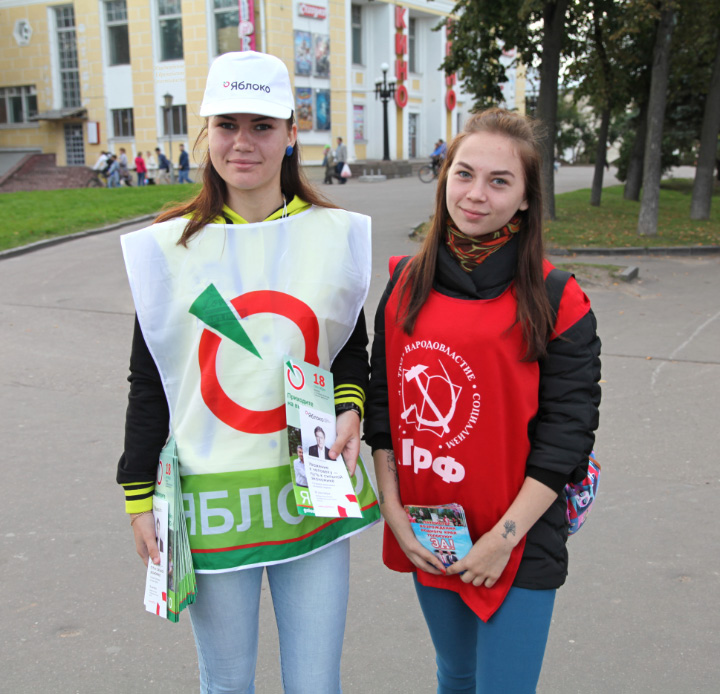 |
|
| |
Yabloko and the Communists
(Российская объединённая демократическая партия «Яблоко»
– The Russian United Democratic Party, "Yabloko"
and
Коммунистическая Партия Российской Федерации; КПРФ
–The Communist Party of the Russian Federation)
This photo from 15 September 2016 is a bit funnier if one realizes
that the two political parties are ostensibly at the opposite ends of
the political spectrum: Westernizers vs. warmed over revanchist Communists,
and that the two girls handing out flyers obviously could not care less.
Like the elephant giving showers on The Flintstones, "Hey, it's a job."
P.S., both the Communists and Yabloko were founded by Jews,
so some things never change. And Russia is also no stranger to the tactic
of controlled opposition. |
|
| |
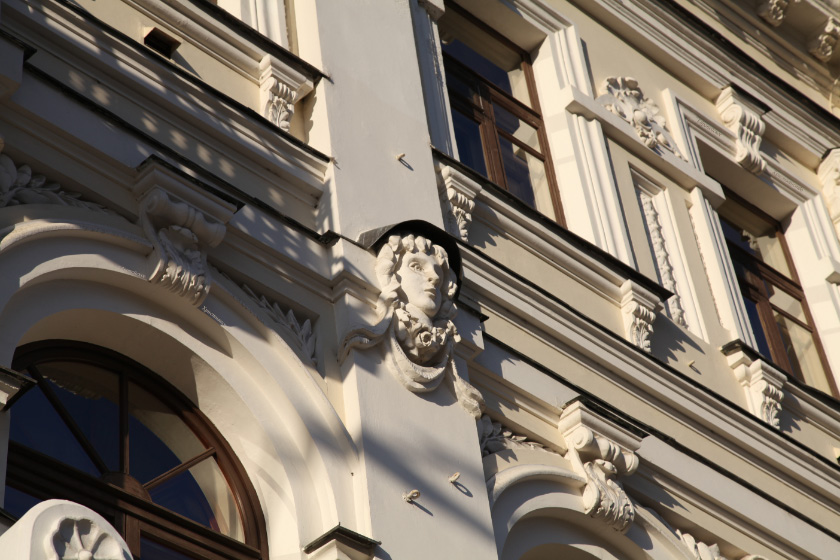 |
|
| |
Art Nouveau – Ар-нуво – Модерн – Югендстиль – Jugendstil in Pskov |
|
| |
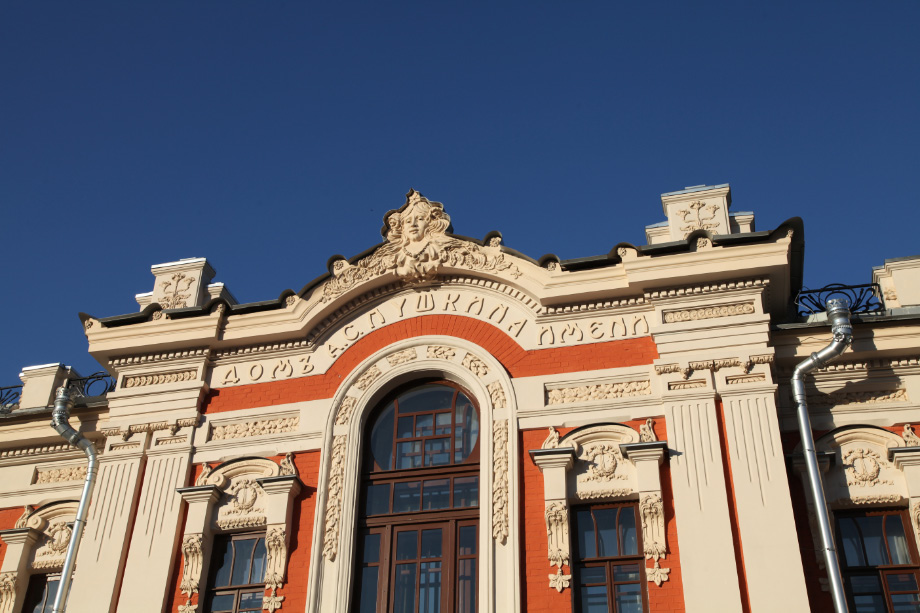 |
|
| |
Псковский академический театр драмы – Pskov Drama Theater |
|
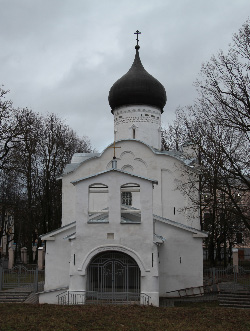
|
|
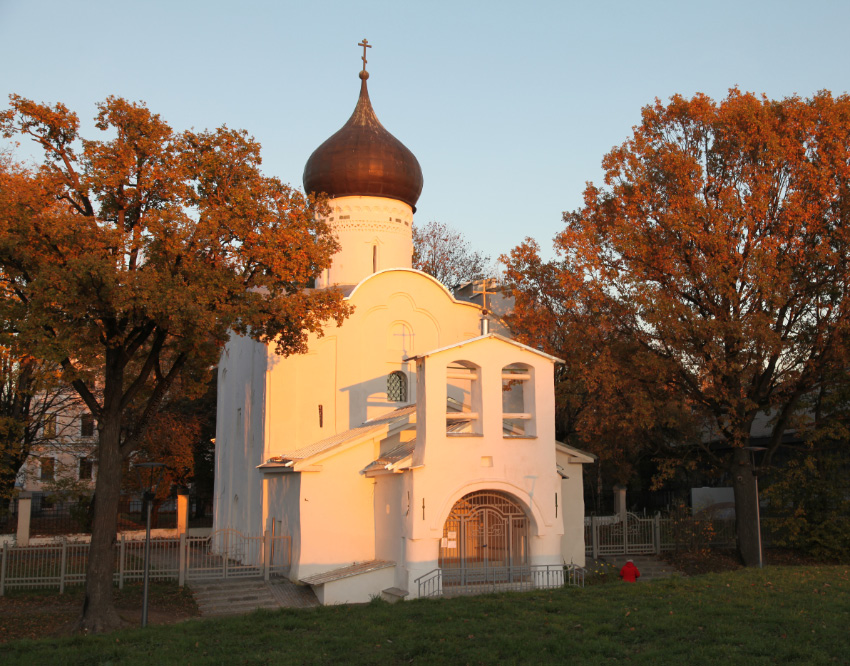 |
|
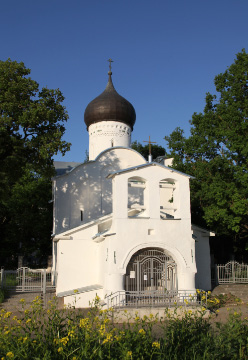
|
| the second of February |
|
the twelfth of October of 2016 |
|
the thirty-first of May |
| Церковь Георгия Победоносца со Взвоза – Church Saint George on the Mound |
| |
|
Built in 1494 Anno Domini, while Columbus was still sailing the Ocean blue, though on his second voyage. Over the intervening five centuries and more, as with most Churches, there has been a rich history, including the many additions and repairs we make to keep the element and the Earth from consuming all we build, though with this Church, dedicated to Saint George, there is an extra curiosity, in that from the late XIX century, from 1886, the Church was used for Latvian-language Orthodox services. Of course the Communists put an end to such fraternity, and to worship altogether in the Church. From very recent years the Church functions again as Church. |
|
|
| |
Покровская Башня – Intercession Tower |
|
| |
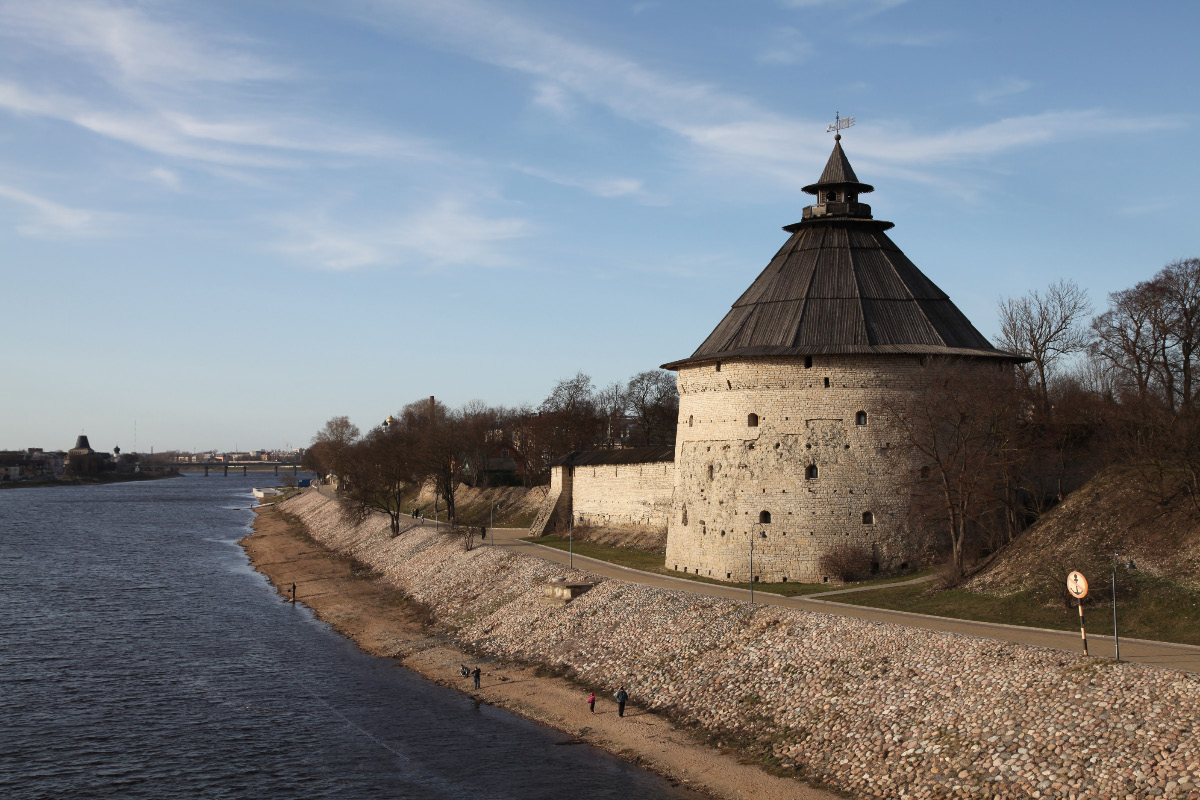 |
|
| |
Покровская Башня – Intercession Tower |
|
| |
|
|
|
|
|
| |
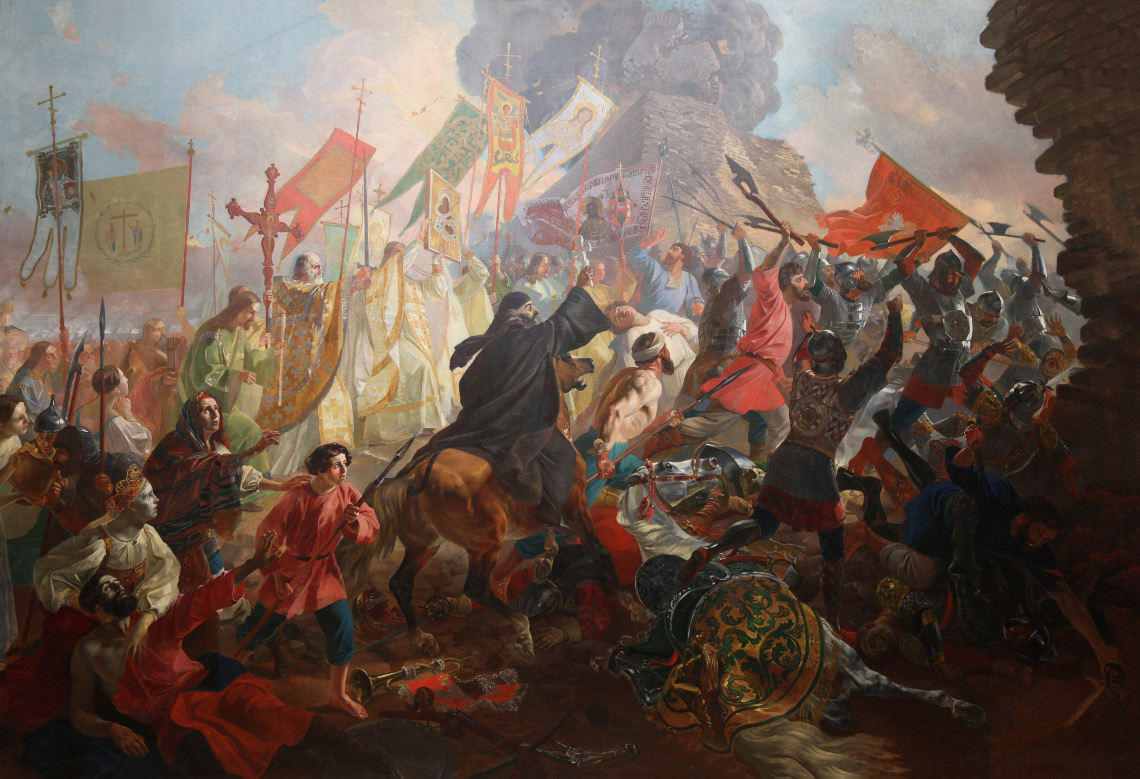 |
|
| |
A painting in a hall of the Третьяков – Tretyakov, the work of 1839-1843 by К.П. Брюллов – K.P. Bryullov (1799 - 1852), depicting the Осада Пскова – Оборона Пскова – Siege of Pskov lead by Polish-Lithuanian Commonwealth King Stephan Batory. The Siege of Pskov – Осада Пскова (18 August 1581 – 4 February 1582) was part of the Livonian War (1558–1583) which had been started by the territorial encroachments and Baltic expansionist ambitions of Ivan (the Terrible) IV, and which also involved over those decades, in addition to the forces of the Polish-Lithuanian Commonwealth, those of the Livonian Confederation, Denmark-Norway and Sweden. And note further that the Russian forces under Ivan the Terrible actually allied with Muslim Tartars against the Christians of Old Livonia. The Hanseatic League city of Pskov had lost its independence to become part of the Russian Tsardom only in 1510. |
|
| |
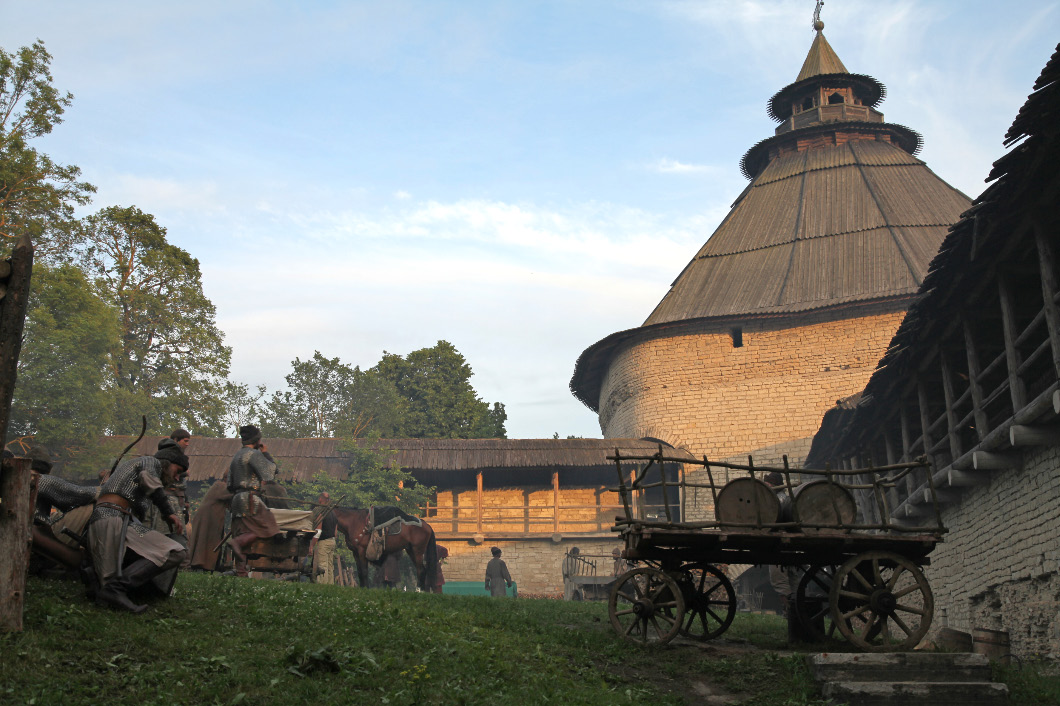 |
|
| |
|
|
| |
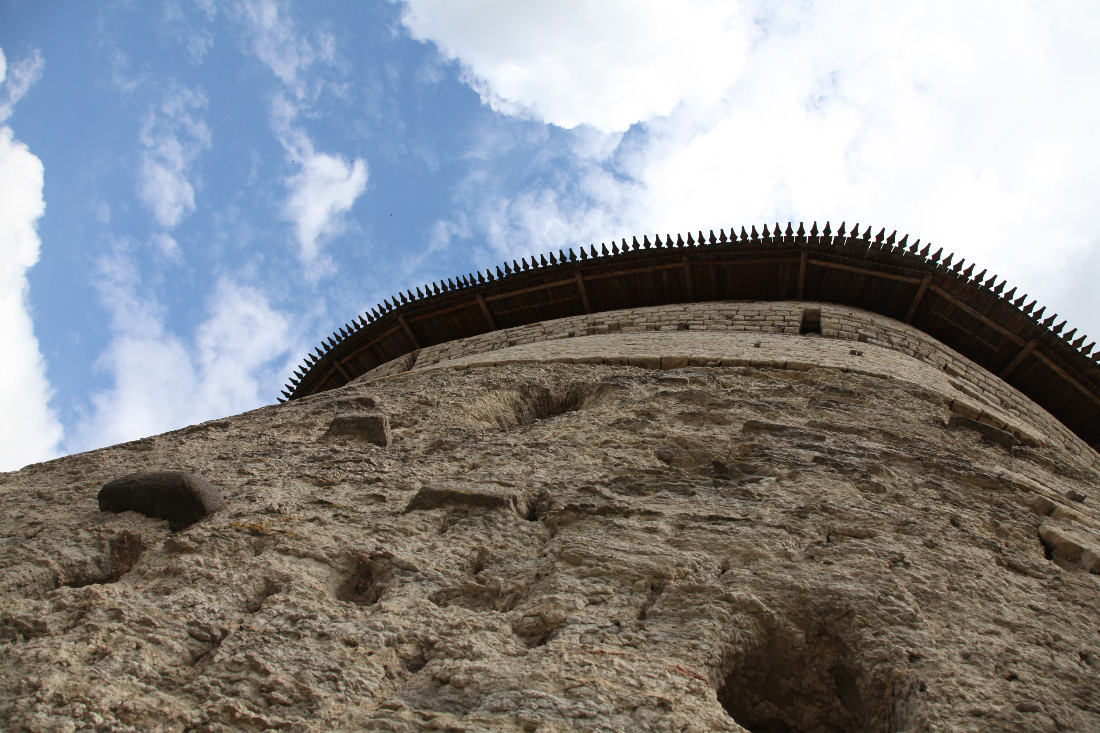 |
|
| |
|
|
|
|
|
| |
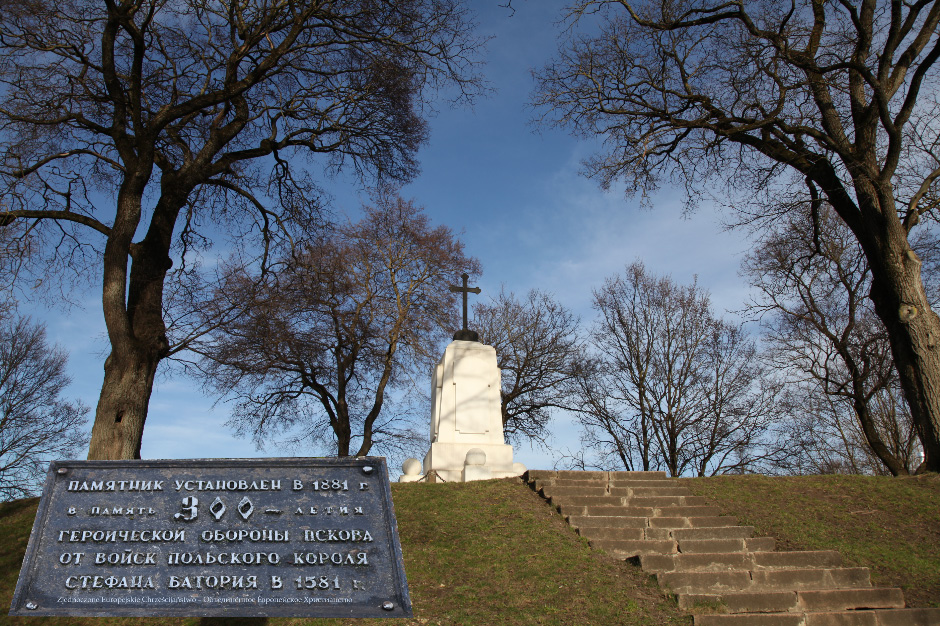 |
|
|
|
|
|
|
| |
Памятник установлен в 1881 г.
в память 300 летия
Героической оборомы Пскова
от Войск Польского Короля
Стефана Батория в 1581 |
|
Monument was erected in 1881
in memory of the 300th anniversary
of the Heroic Defense of Pskov
from the King of the Polish Army
Stefan Batory in 1581 |
|
| |
|
|
| |
It would be curious to discover on what date in 1881 this monument was erected, and who was in attendance. Царь-Освободитель Александр II Николаевич – Tsar-Liberator Alexander II was murdered on 13 March [O.S. 1 March] of that year of 1881. Up until that point he was, among his many titles, King of Poland, and indeed Russia got the biggest chunk of a Poland, when Poland ceased to exist as a state if not a nation on 24 October 1795 and for the ensuing 123 years. The serfs in Królestwo Kongresowe – Congress Poland had been freed decades earlier, under Napoleon in 1807, so it was not for freeing Polish serfs that Alexander's most grand event of 19 February 1861 [N.S., 3 March 1861] earned him the title of Освободитель – Liberator. Still, perhaps 25 million souls in Russia were no longer treated as baptized property because of this great man. It is difficult to guess at the course world events would have taken had he not been murdered in 1881. Maybe no Bolshevism and no WWII, though it is never possible to answer such questions. The Devil would very likely have concocted something else instead. In the event of 1/13 March, it was a 24-year-old Polish nobleman, Ignacy Hryniewiecki – Игнатий Якимович Гриневицкий who threw the fatal bomb and ended constitutional reform in Russia. The revolutionary organization of which he was a member called itself the People's Will – Народная воля – Narodnaya Volya. Which people? Perhaps all of 500 of the people of that vast state. Was Narodnaya Volya another manifestation of the Revolutionary Jew? Many available resources indicate that such was not disproportionately the case, but of course they would. And recall, the Communists in fact came to power a few decades later, and they controlled information they deemed undesirable for dissemination more tightly than any other literate civilization in history, before XXI century America that is. Perhaps we can return to this question. At all events the post-assassination government of Russia seemed to think the revolutionaries were of the Jews. In May of 1882 the May Laws – Майские правила «О порядке приведения в действие правил о евреях» were instituted, if not systematically enforced, a vain attempt to deal with the Jewish Question. |
|
| |
But returning to matters 1581, |
|
| |
|
|
| |
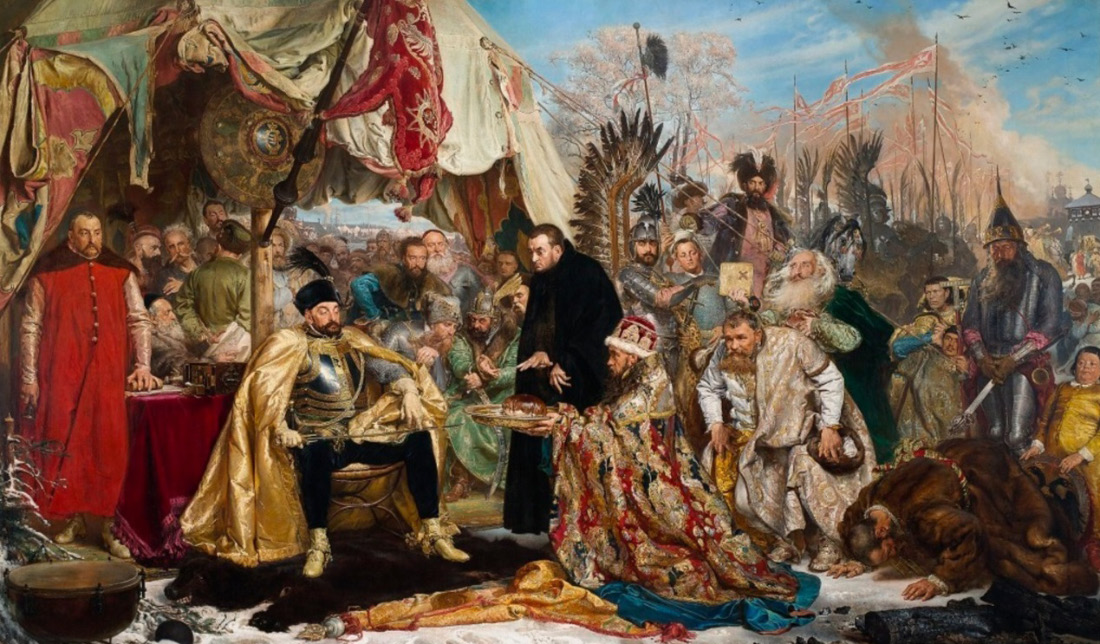 |
|
| |
The Pole's painters take a rather different view of this XVI century fratricidal conflict of European Christendom, one of countless. Painting in Zamek Królewski w Warszawie – Royal Castle in Warsaw by that most famous Polish painter of epic historical events, Jan Alojzy Matejko (1838-1893). |
|
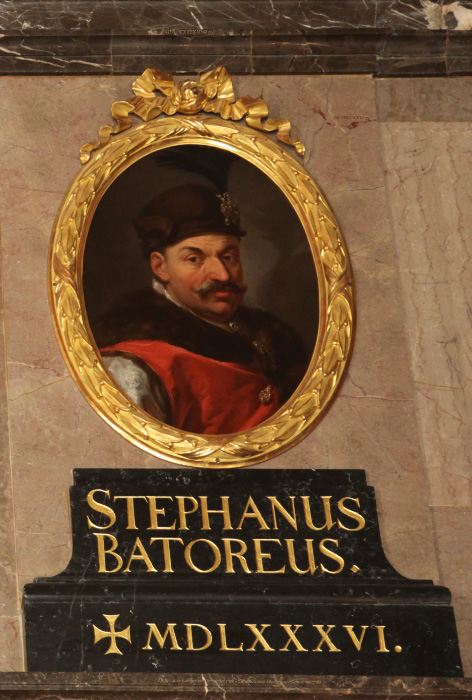
|
|
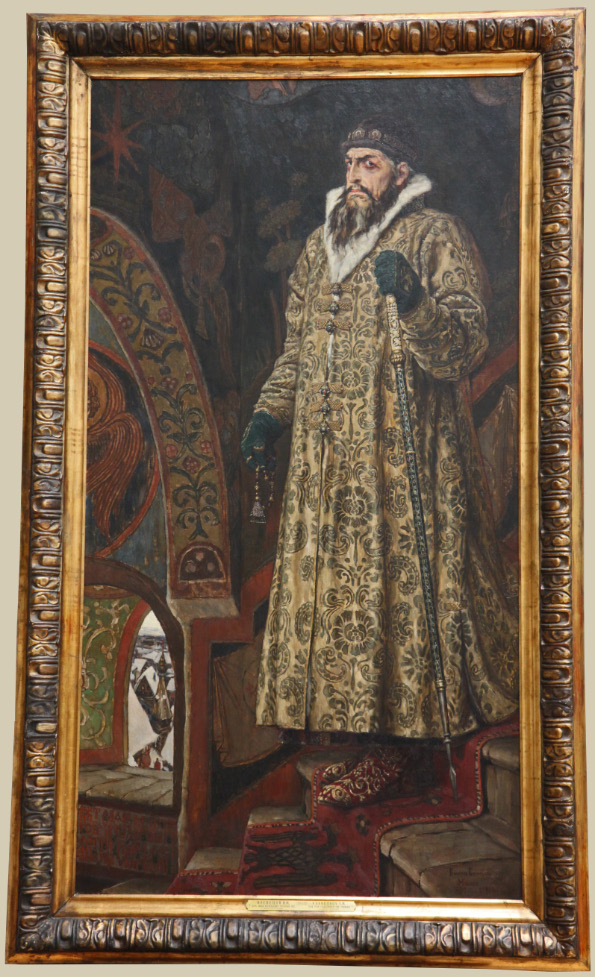 |
Stephanus Batoreus
Portrait by Polish-Italian Marcello Bacciarelli (1731-1818) in the Zamek Królewski w Warszawie – Royal Castle in Warsaw of
Ştefan Báthory – Báthory István – Stefan Batory – Stephen Báthory – Steponas Batoras – Стэфан Баторый – Стефан Баторий
Voivode (from 1571) then Prince (from 1576) of Transylvania, Kingdom of Hungary, until his death, 12 December 1586
King of Poland and Grand Duke of Lithuania jure uxoris / "by right of his wife", Anna Jagiellonka (1523-1596), that is
Monarch of the Polish-Lithuanian Commonwealth
|
|
Царь Иван IV Васильевич, прозванный Грозным – Tsar Ivan IV Vasilyevich,
known to history as Ivan the Terrible,
though better translated as Ivan the Awesome or Ivan the Fearsome
Born 25 August 1530 [3 Sept, N.S.];
reigned nominally from December 1533 as infant, then boy, as
Великий Князь – Grand Prince.
He was then crowned on 16 January 1547 as
Царь всея Руси – Tsar of All the Russias,
the first Moscovite Grand Prince so honored.
Though the grandfather of Ivan IV (the Terrible),
Иван III Васильевич – Ivan III Vasilyevich
known to history as Иван Великий – Ivan the Great
(22 January 1440; r. 5 April 1462 – 27 October 1505)
had already styled himself as Tsar in private correspondence.
Crowned publically as Tsar, Ivan IV (the Terrible)
reigned through chaos and terror as such until
his death on 18 [28th, N.S.] March 1584.
Painting in Третьяков – Tretyakov by В.М. Васнецов – V.M. Vasnetsov (1848-1926) |
| |
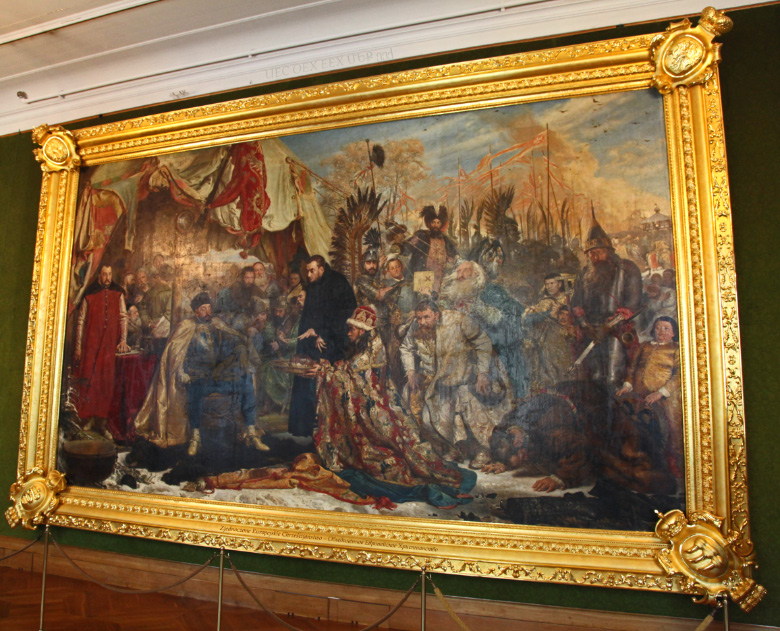 |
|
| |
Jan Matejko-Batory pod Pskowem na Zamku Królewskim w Warszawie |
|
| |
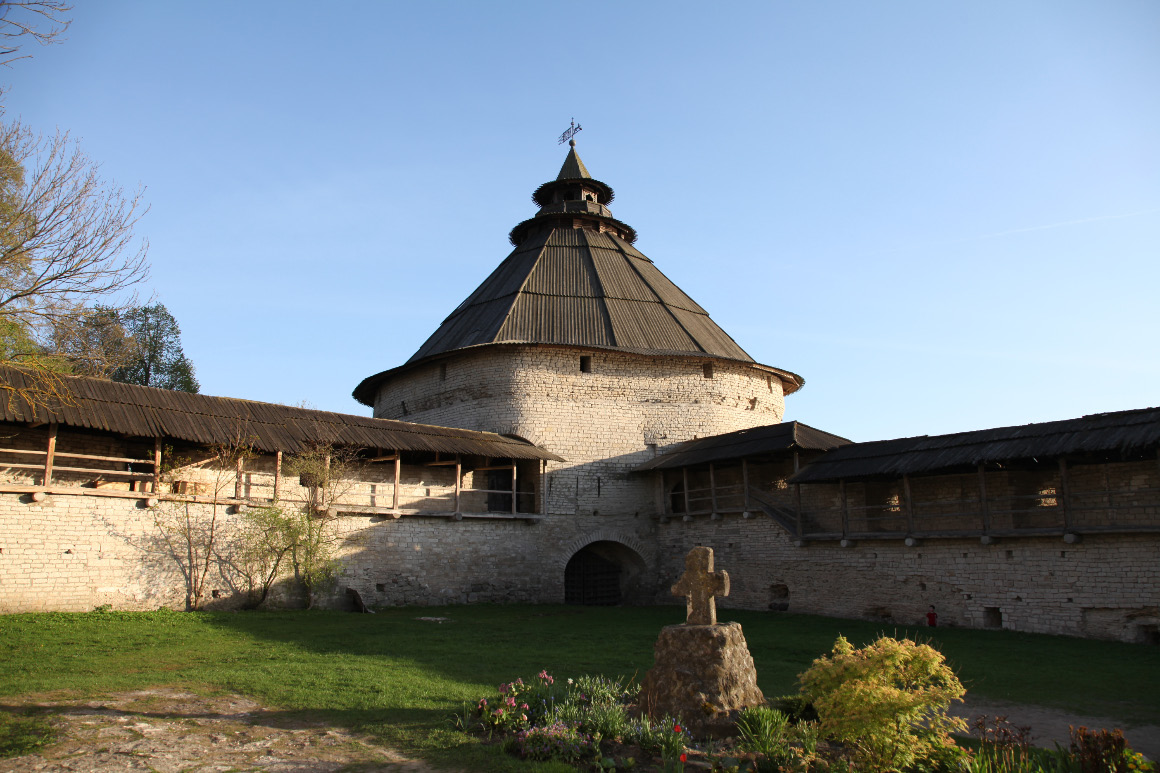 |
|
| |
Покровская Башня – Intercession Tower |
|
| |
from inside city walls |
|
| |
A special historical structure for Russia in Pskov, dedicated to and calling piously upon the Blessed Virgin Theotokos for her intercession, the Intercession Tower – Покровская Башня, from the other side one sees that these fortress walls and tower also guard a Church, as they are guarded by the Church: |
|
| |
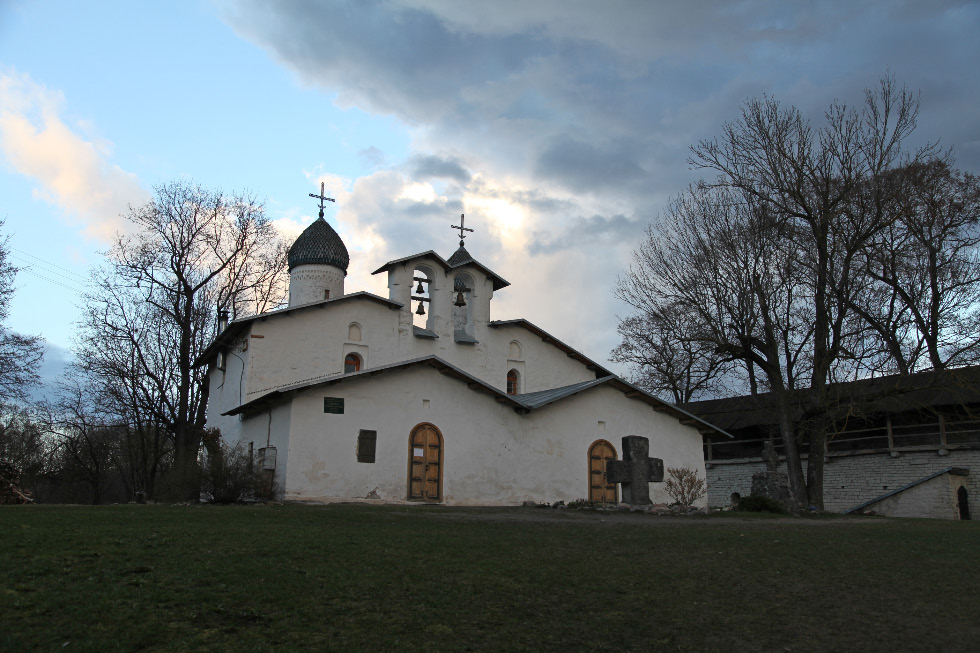 |
|
| |
19 April 2016 |
|
|
The Church of the Nativity and the Intercession of the Virgin by the Breach – Храм Покрова и Рождества Пресвятой Богородицы от Пролома, actually two Churches, the Nativity of the Virgin and the Intercession of the Virgin, with a common wall, dates back at least as far as 1399. The reference in the name of the Church to a Breach, refers to the breach in the city wall at this spot by Batory's besieging forces, before they were repelled by the Russian defenders, they believe with the assistance of the Blessed Virgin and on the date her nativity is honored in the Russian calendar, 8/21 September. |
|
| |
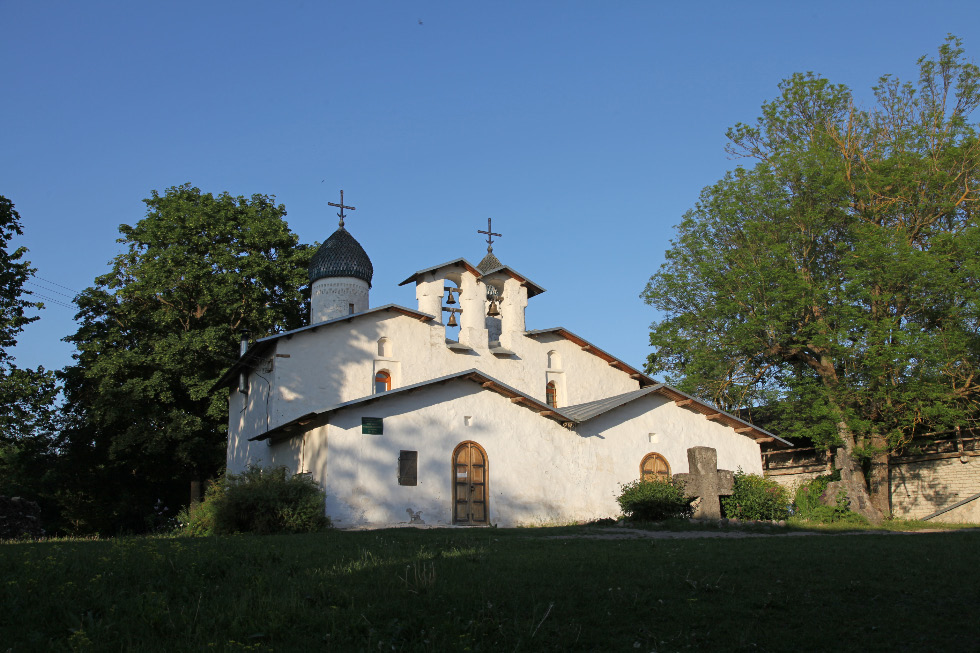 |
|
| |
on 31 May 2016 |
|
| |
So what possible address could this sacred structure have, and still in 2016 Anno Domini – От Рождества Христова, who else to co-honor here by Святая Русь – Holy Rus' other than: |
|
|
|
|
| |
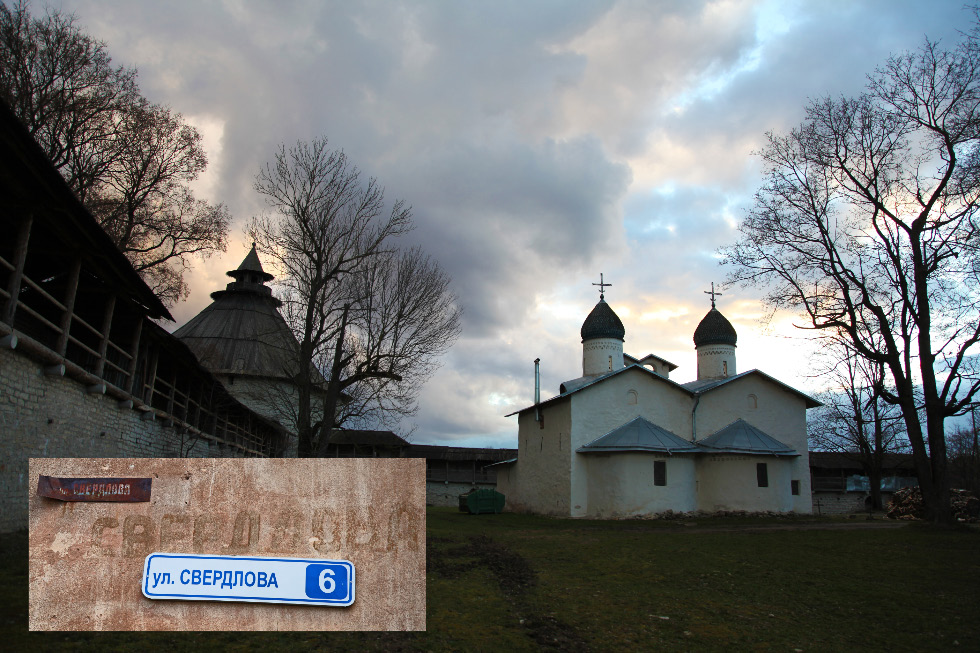 |
|
| |
Ага -Yup, it just must be the atheist Bolshevik Jew, Chairman of the Secretariat of the Russian Communist Party, and the man who ordered the murder of the now canonized last Russian Imperial family, Yakov Sverdlov - Яков Свердлов: ul. Sverdlova 1, Pskov 180000 Russia – ул. Свердлова 1, Псков 180000 Россия. And what a nice new street sign it is ( this one at Building 6, not Building 1, the address of the Church). Sickening. |
|
| |
Христос Воскрес! – Christ is Risen! – Chrystus Zmartwychwstał! – Christus ist Auferstanden! |
|
| |
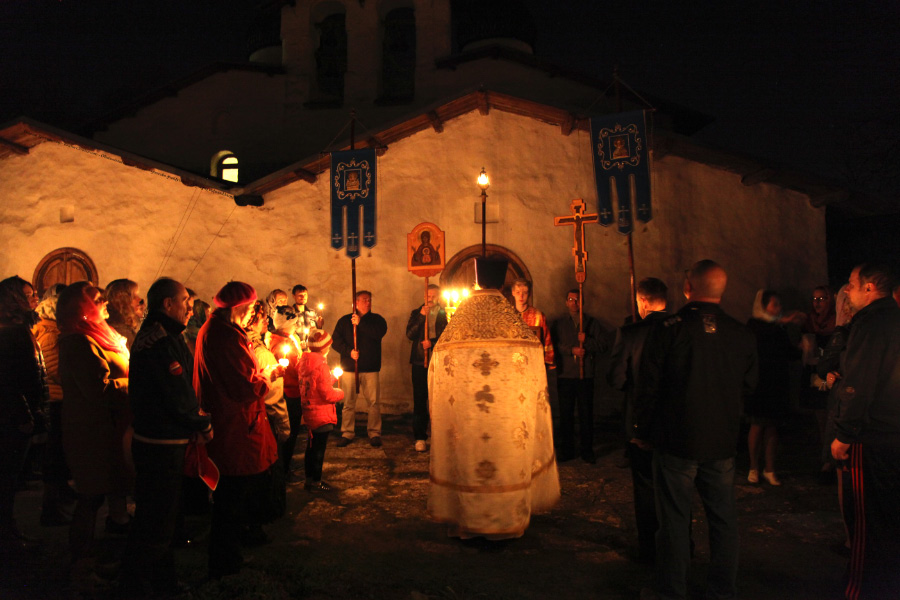 |
|
| |
God Always Triumphs. Easter vigil, 1 May 2016 – Пасха 1 мая 2016 |
|
| |
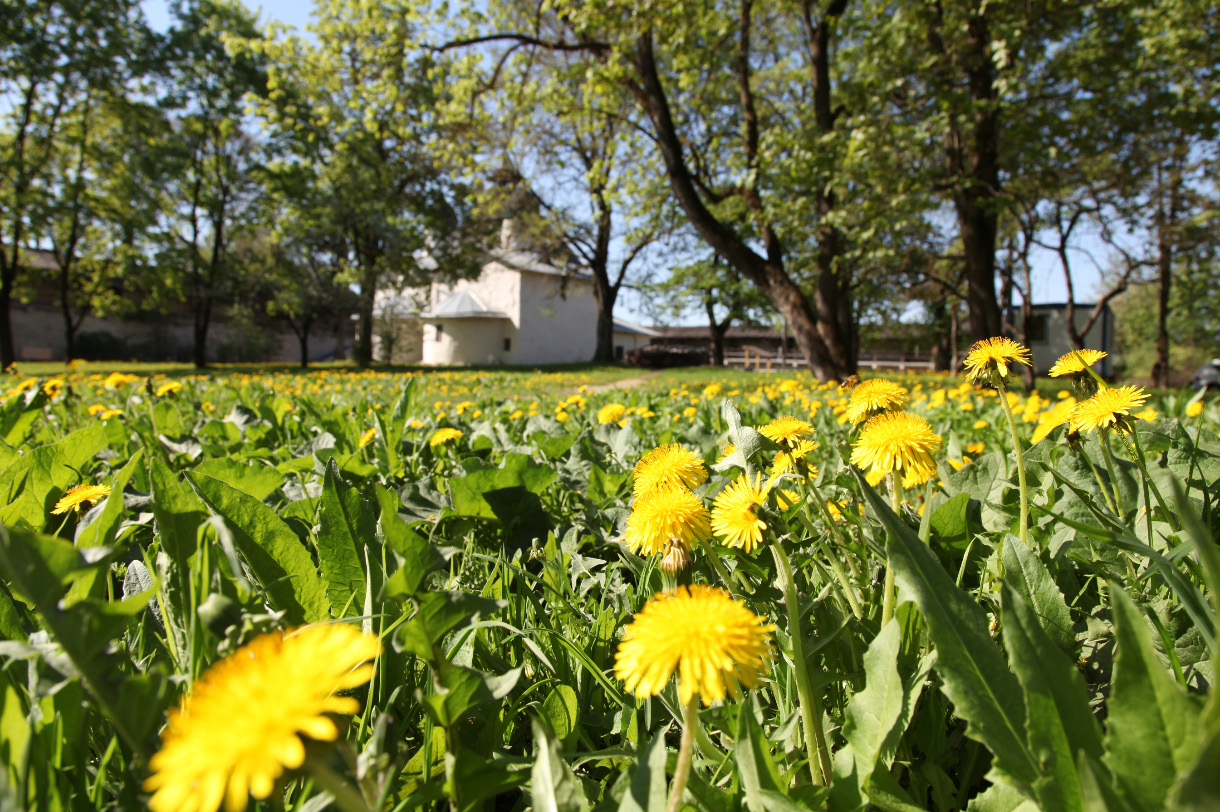 |
|
| |
Одуванчик – Dandelion |
|
| |
|
|
| |
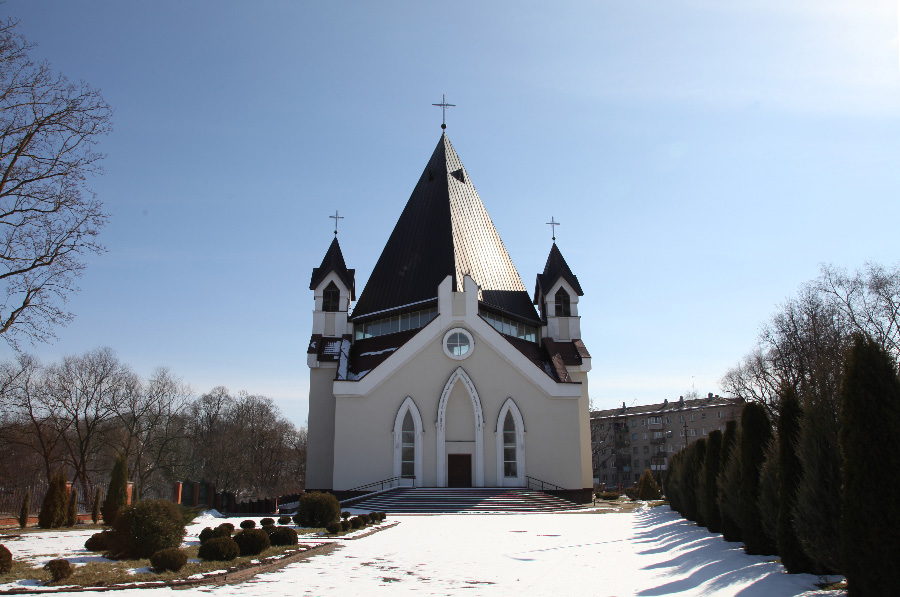 |
|
| |
|
|
| |
... here on Good Friday 2016 on the Catholic Calendar, 25 March |
|
| |
|
|
| |
Святой Троицы Римско-Католический Костел в Пскове. И Московский Патриархат и Русская Православная Церковь Заграницей - всегда полна Святой Софии - просто люблю это.
Holy Trinity Roman Catholic parish church in Pskov. Both the Moscow Patriarchate and the Russian Orthodox Church Abroad, ROCOR — always full of αγία Σοφία – Holy Wisdom — just love this. |
|
| |
|
|
| |
... and here on Pentecost Sunday, 15 May |
|
| |
|
|
| |
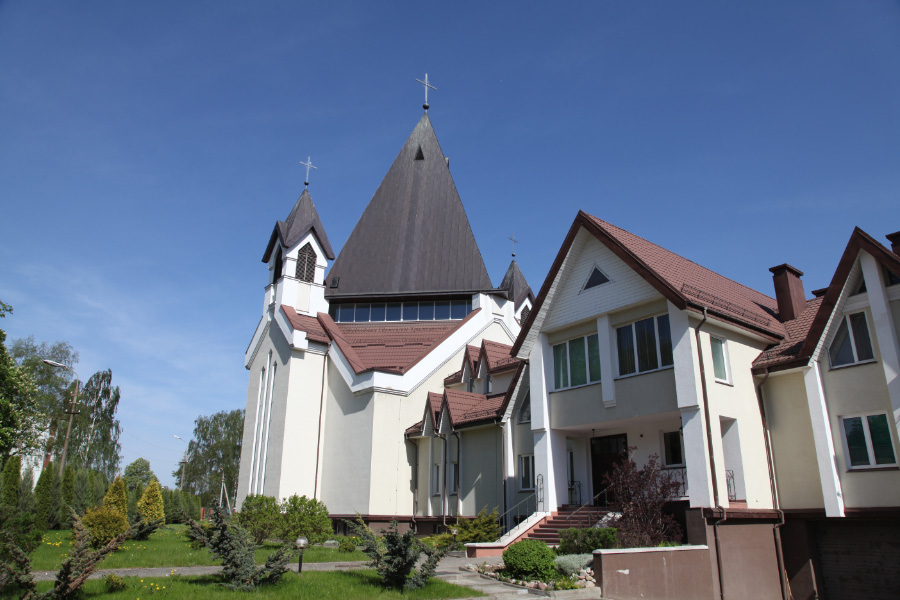 |
|
| |
|
|
| |
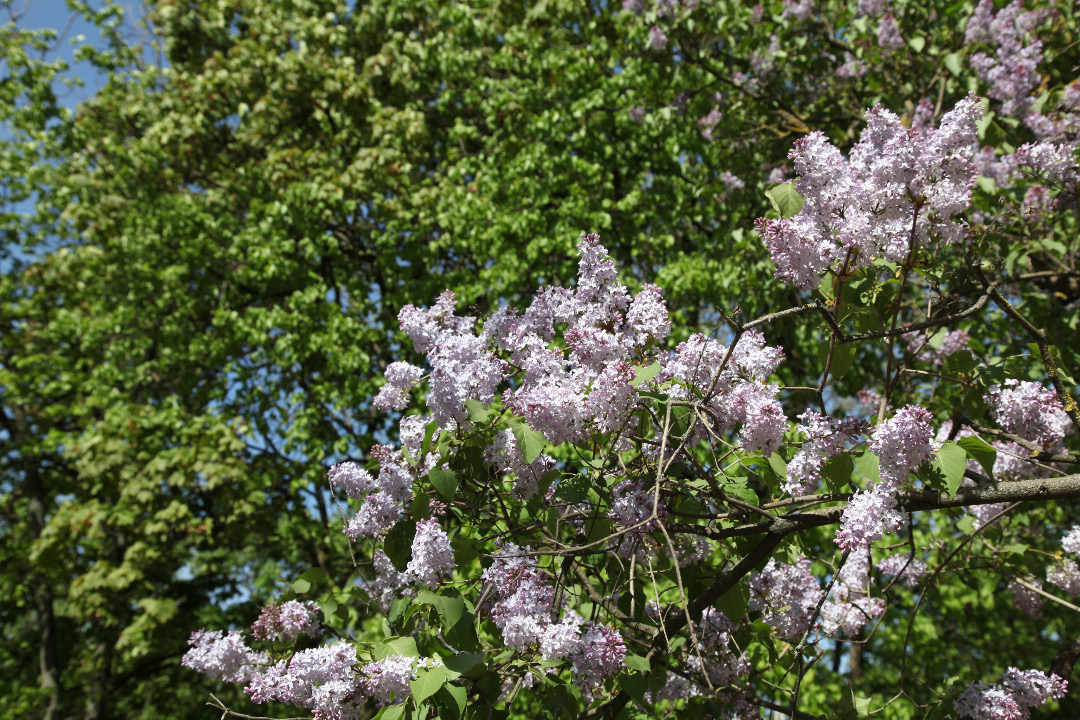 |
|
| |
Гиацинт – Hyacinth |
|
| |
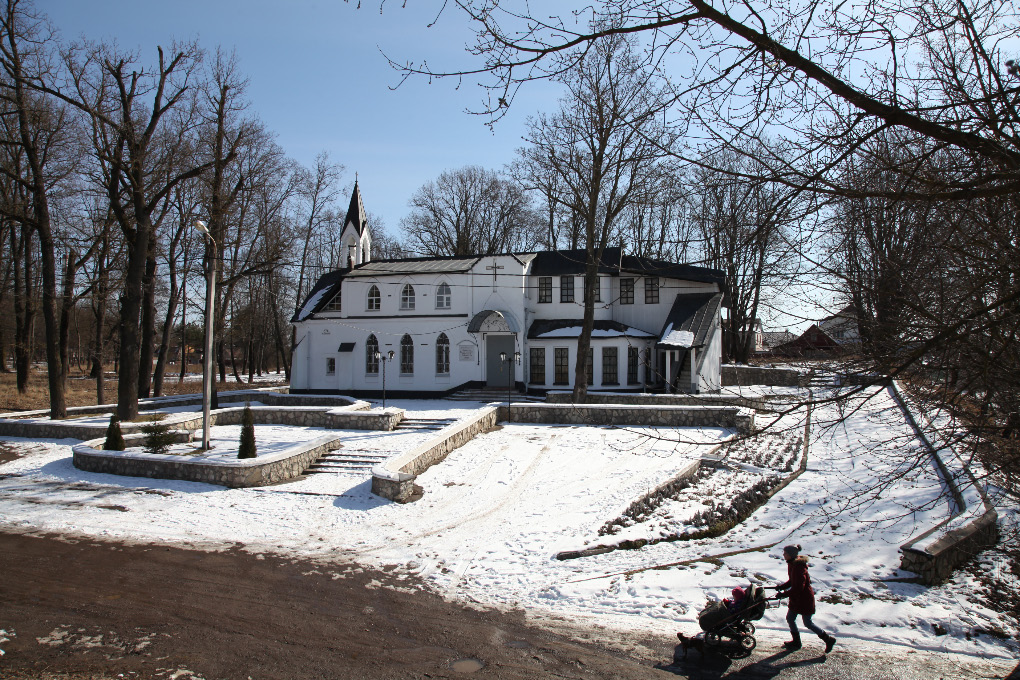 |
|
| |
Церковь Евангельских Христиан Баптистов – Church of Evangelical Baptist Christians.
At least these people read the Bible. One wonders how many Orthodox, who have been favored, due to no merit of their own whatsoever, to inherit the true faith which is Orthodox-Catholic Christianity, do. One also hopes that these Protestants have not embrace the worst of Once Saved Always Saved arrogance, or of the Dispensationalism- nonsense of
- John Darby (1800 – 1882) and
- Cyrus Scofield (1843 – 1921), together with its Premillennial Rapture, and together with their "Puritan"
- Increase Mather (1639 – 1723) antecedents (exempli gratia, his A Dissertation concerning the Future Conversion of the Jewish Nation (1709), refuted by Increase's own son, the more insightful Cotton Mather (1663 – 1728), though only after his father's death, in his Triparadisus (Threefold Paradise) (1726/1727)).
The doctrine of the Premillennial Rapture is of human invention. It is error. It is false. It is a heresy. A Premillennial Rapture of faithful Christians before ethnic Jews (as if there are such people) rule the world from Jerusalem is not the meaning ascribed to Revelation 20:1–6 by the authoritative General Magisterium of the Orthodox-Catholic Church established by God in the Person of His Second Person of the Most Holy Trinity, Christ Jesus. Like the canonical book from which it is excerpted, all the inerrant word of God, Revelation 20:1–6 is symbolic. |
|
|
|
|
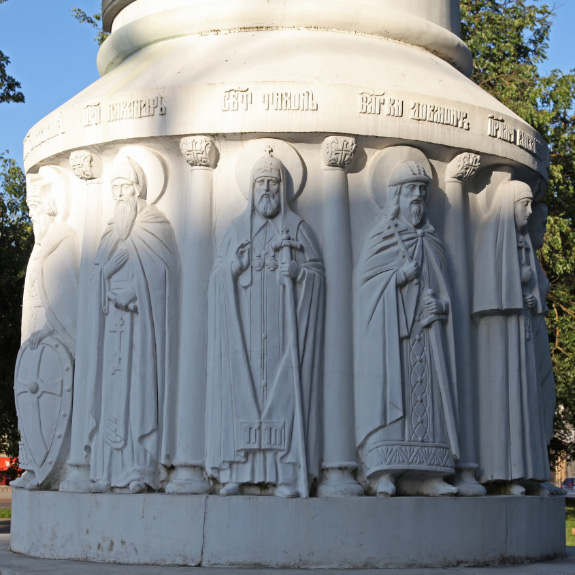
|
|
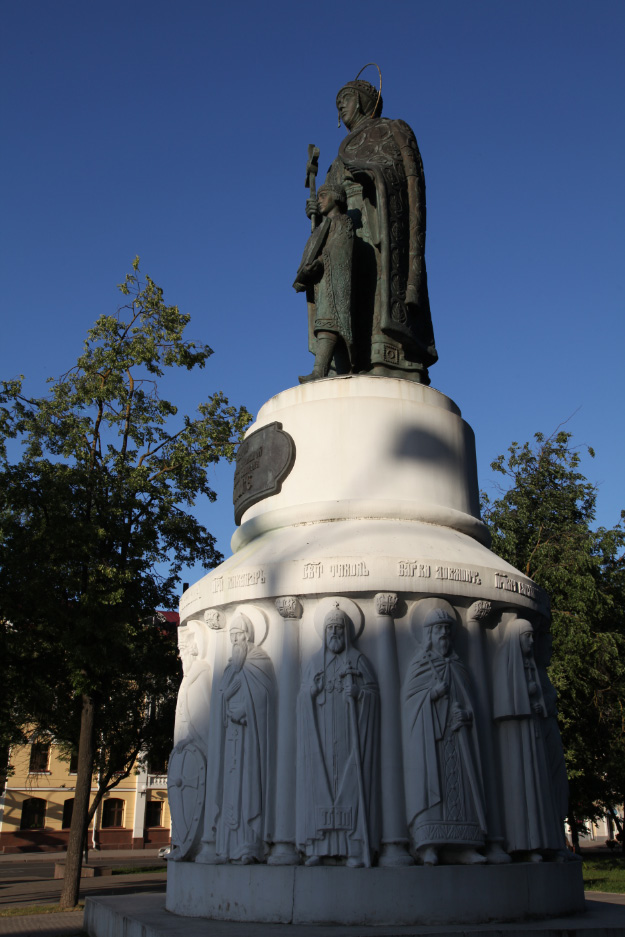 |
- Native son of Klin – Клин in Pskov Oblast – Псковская Область;
- Citizen of the United States of America;
- 11th Patriarch of Moscow and of All the Russias;
- Widely considered a martyr for the Christian faith;
- Canonized by a Moscow Patriarchate (in 1989) still under the Communist regime.
| Святой Тихон – Saint Tikhon of Moscow |
|
|
More than a thousand years of Christianity in Russia and only princes and monastics merit elevation to the Honors of the Altar? This striking circumstances speaks to the orientation and goals of the Patriarchate of Moscow and all the Russias? Власть – Vlast Veneration to be taken as a good thing?
|
|
|
|
| |
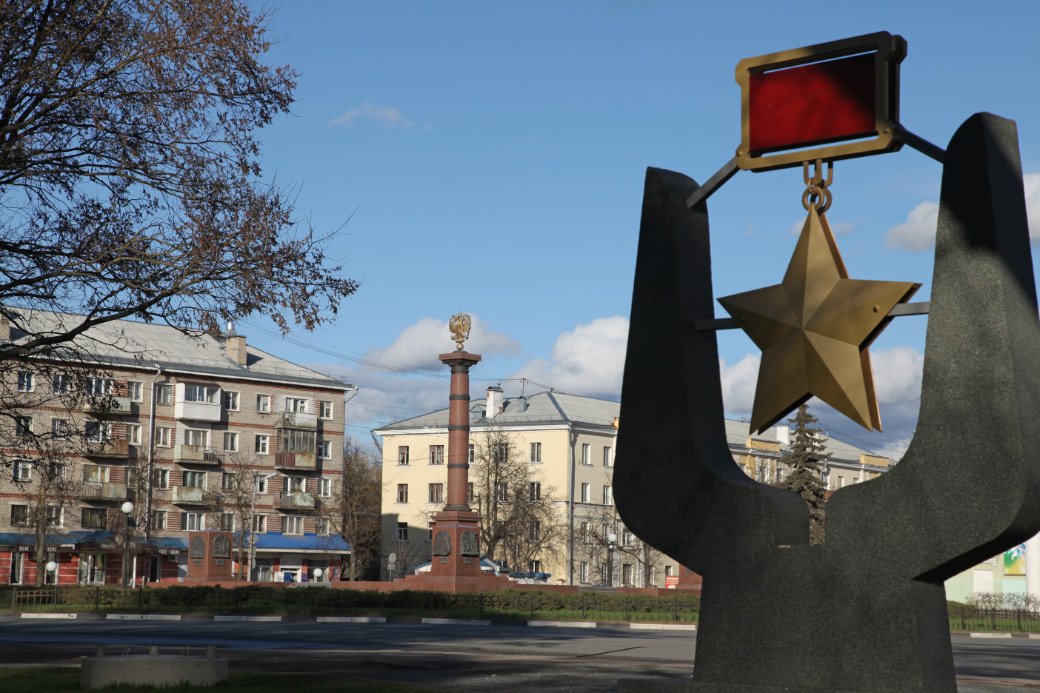 |
|
| |
As elsewhere, as everywhere, so here in Pskov, the Герой Советского Союза – Hero of the Soviet Union peg on which to hang collective identity really does not harmonize well with monuments aggrandizing the military exploits and conquests of the Three-Hundred-Years House of Romanov – Трёхсотлетие Дома Романовых. |
|
| |
Съ Нами Богъ – God is with us |
|
| |
banner and bayonet |
|
| |
|
|
| |
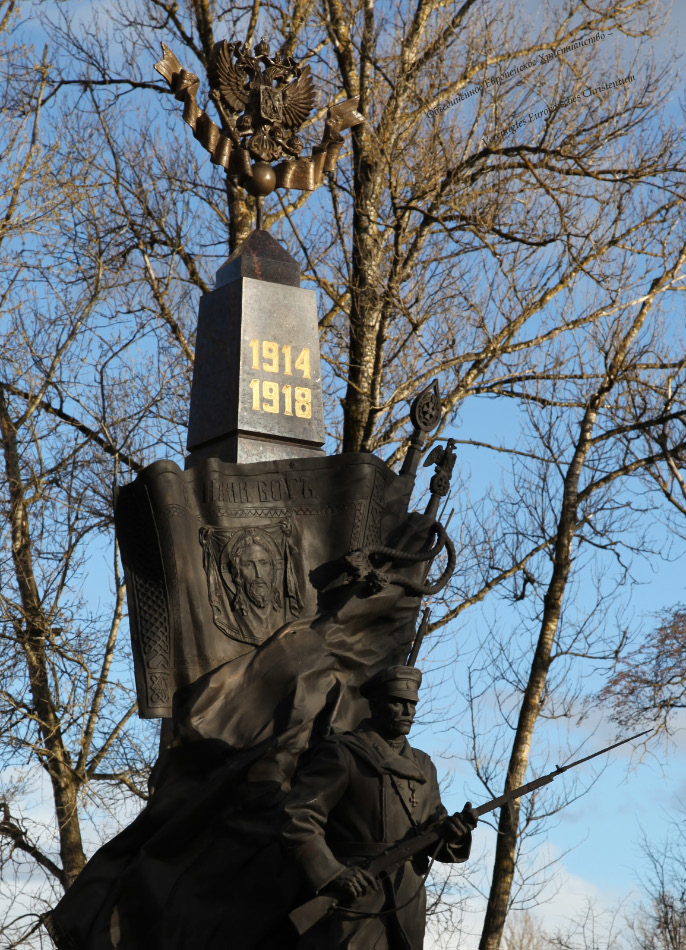 |
|
| |
|
|
| |
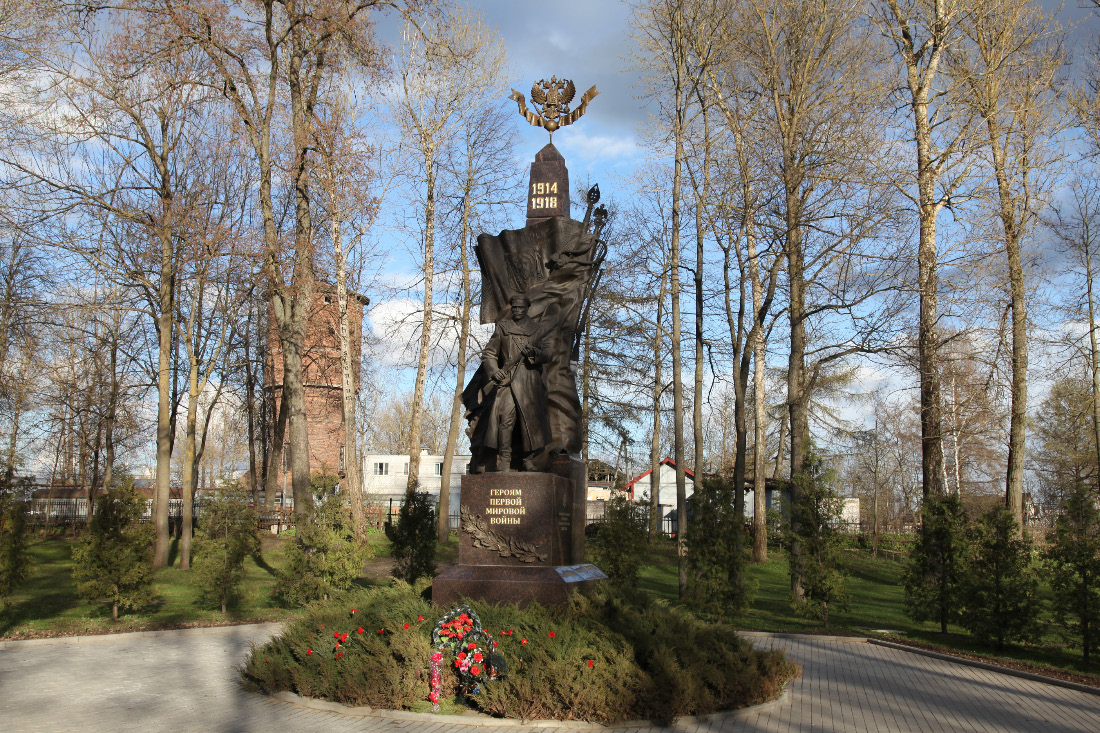 |
|
| |
Two-headed Byzantine eagle, crowned with two imperial crowns, over which two flying ends of the ribbon of the Order of Saint Andrew with a third crown, an icon of Christ Jesus capped with the inscription Съ Нами Богъ – God is with us, these type of newly-created World War I monuments with imagery of soldiers gallantly fighting for the symphonic Church and State are appearing all over Russia. This one near the train station in Pskov is particularly well conceived and executed. In a sense the attempt to return to these values of Christianity and Christendom represents an enormous improvement over the half-truths and outright lies of atheist Bolshevism, monumentalized in the Великая Отечественная Война – Great Patriotic War shrines which are ubiquitious throughout Russia. But friends and brothers, please recall that World War I – Первая Мировая Война was after all a totally unnecessary fratricidal blunder, and the Opening Phase of the Great Civil War of European Christendom – Открытие Фаза Великая гражданская Война Европейского Христианство, 1914 – 1945. |
|
| |
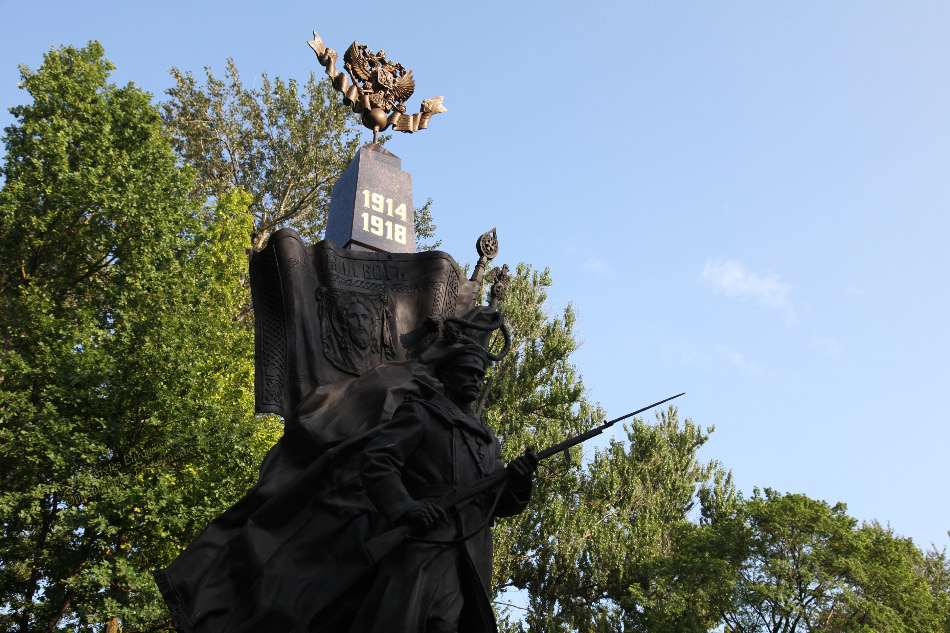 |
|
| |
1914 to 1918? Well, the war ran until July of 1919 if the Starvation Blockade of Germany is counted, as it should be. Along with the allies violating every one of Woodrow Wilson's famed Fourteen Points – which was the basis on which a militarily non-defeated Germany agreed to the 11-11-11 1918 Armistice – and of course the very real Bolshevik threat, this Starvation Blockade was much of the reason for Hitler's rise to power. Dear Russian Brother Descendants of European Christendom, reflect please: as of 1 September 1939, the victims murdered by the Nazi regime numbered in the hundreds, and the very low hundreds at that. The Bolshevik victim toll was already well past the ten million mark! When Unternehmen Barbarossa – Operation Barbarossa commensed on 22 June 1941, initial German advances into Soviet territory were so extensive and swift in part because the Soviet forces were not dug in for defense. They were arrayed for offense, for invasion. Translation for the dull witted: Had Hitler not attacked, Stalin would have.
And after World War II, Phase II of the Great Civil War of European Christendom, another Jew, United States Secretary of the Treasury Henry Morgenthau, Jr., tried hard to repeat and on a grander scale the starvation blockade of the earlier war. The Soviets and their British and American allies succeeded in murdering about 2 million Germans after the German defeat and surrender during the ethnic cleansing of Germans out of territories which were to be transferred to Poland.
Съ Нами Богъ – God is with us – Gott mit uns
It seems like a problematic boast for nationalists to attempt. |
|
| |
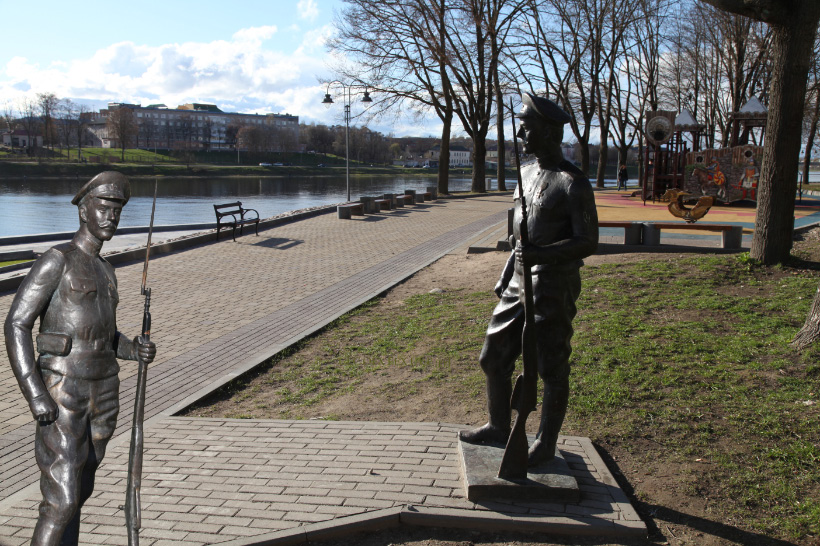 |
|
| |
on the Great River – на Реке Великой |
|
|
The Romanov dynasty and Tsarism ended here, on 2 (N.S. 15) March 1917, from out of the imperial train while shunted on the tracks of the Pskov train station. |
|
| |
|
|
| |
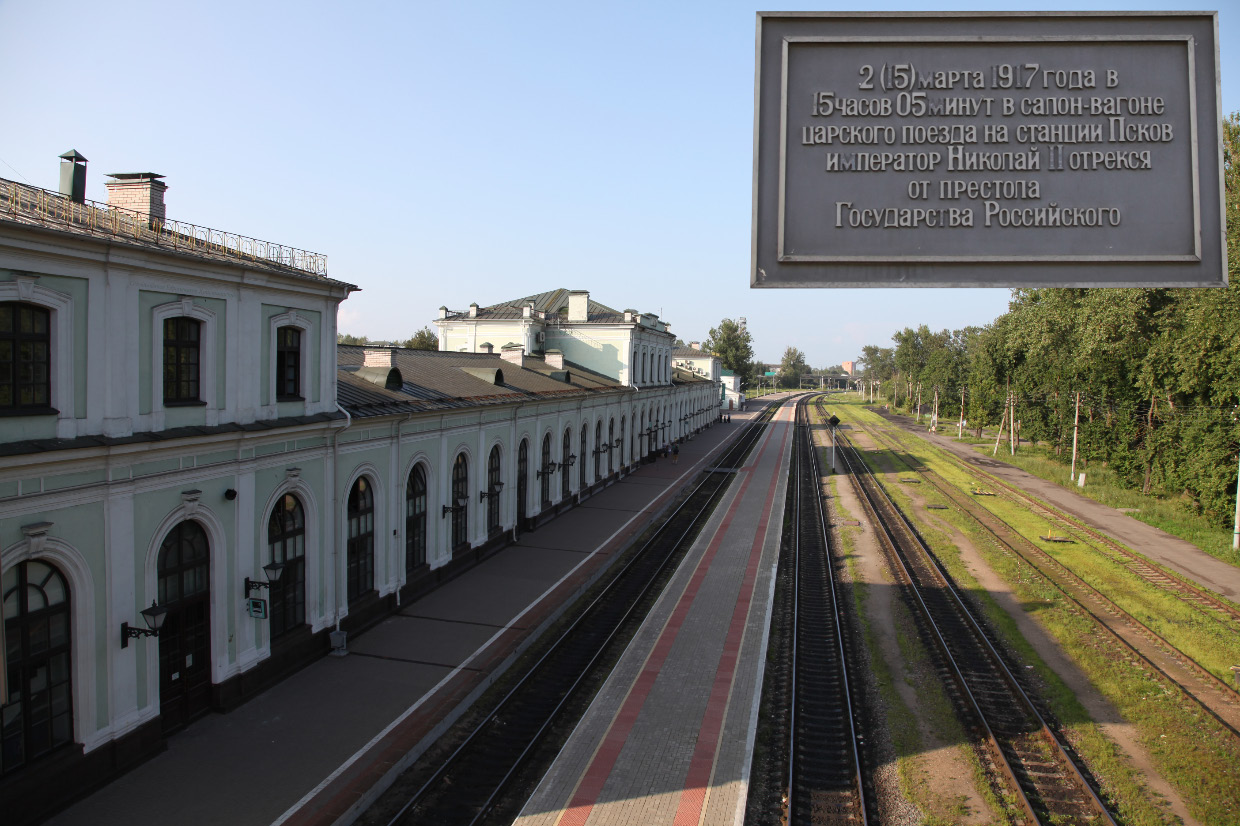 |
|
| |
|
|
| |
2 (15) Марта 1917 года в
15 часов 05 минут в салон-вагоне
Царского поезда на станции Псков
Император Николай II Отрекся
от Престола
Государства Российского |
|
On 2 (15) March 1917
At 15 hours 05 minutes from the parlor car
Of the Tsar's train while at the station of Pskov
Emperor Nicholas abdicated
from the Throne of the
Russian State |
|
| |
Near complete detachment from the reality of the developing situation characterized Emperor Nikolai Alexandrovich's thinking, statements, actions and inaction during those critical days in the last week of February, Old Style, 1917. (The unreality in which Empress Alexandra Feodorovna's mind moved was if anything even more complete.) Perhaps most illustrative is the fact that the Tsar initially, even if only for a short period of hours, tried to abdicate in favor of his son. Even if the Tsarevich had not been a twelve-year-old hemophiliac at the time, it is incomprehensible how the Tsar thought that this would or even might placate Duma, General Staff or nobility. Of course nothing he could do would placate the Bolsheviks. Had Nikolai — now, with his wife and children, held out as Saint Nikolai by the Russian Orthodox Church — but had Nikolai not abdicated, and war weary as they were, and diminished by losses of maybe six million men, the loyal forces he commanded at the front still outnumbered enormously the mutinying Petrograd garrison, the mass-murderous, atheist Communist Soviet Union might well never have happened.
But maybe the experiment and experience of atheist Communism needed to happen, and maybe they needed to happen in Russia. Anyway, they did happen.
The hundredth anniversary of these things will be coming along in less than a year from this writing, this July 2016 writing here in Pskov. And very few in Church and State here in Russia, or anywhere else within European Christendom – Европейское Христианство, seem much focused on the unreality and unholiness of the false choice of Communism vs. Capitalism, Capitalism as it is in fact everywhere practiced. The real alternative is Christianity and economic Christianity: Do not take all that you can get away with taking. Do not give — to workers and suppliers and inventors — the least that you can get away with giving. Focus not on giving only a wage but to allowing dignity, though as for the wage, a fair wage is, by definition, one on which the worker can support children, can raise a family. Do otherwise, you invite Communism. Abandon Christianity, you get atheist Communism. In his personal piety and in his ceremonial and Church liturgical duties, Император Всероссийский Николай II Александрович – Emperor and Autocrat of All the Russias Nicholas II Romanov may have been very near to being the ideal Christian monarch. Christian economy, he did not get this. The Catholic and Protestant monarchs of Europe did no better.
May Nicholas and his family Покойся с миром – Ruhe in Frieden – Rest in Peace – Requiesce in pace. |
|
| |
|
|
| |
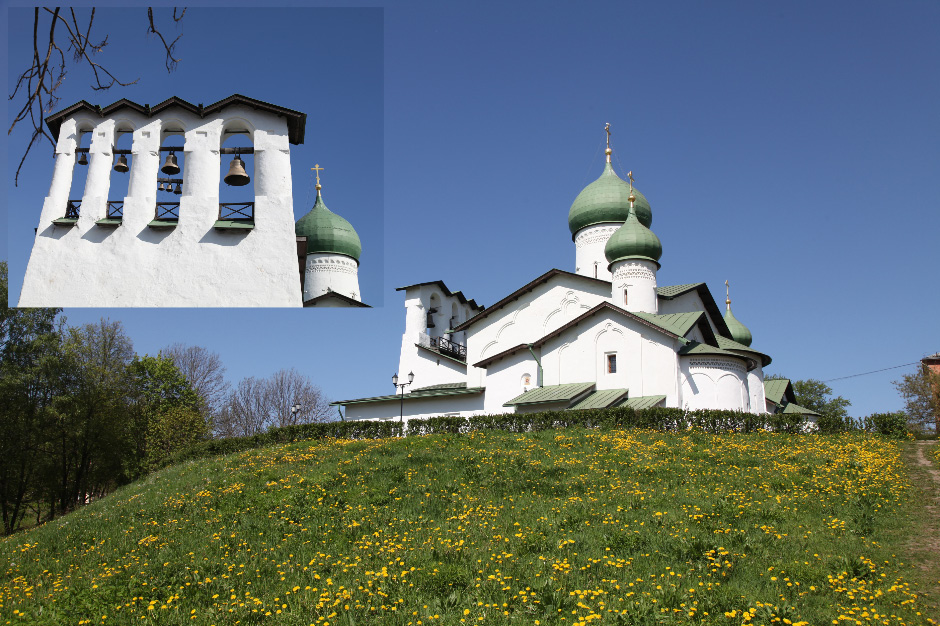 |
|
| |
Late XV century Храм Богоявления Господня – Church of the Epiphany (10 May with belfry insert from 25 March), near the Pskov (or Pskova) River – Пскова Река |
|
| |
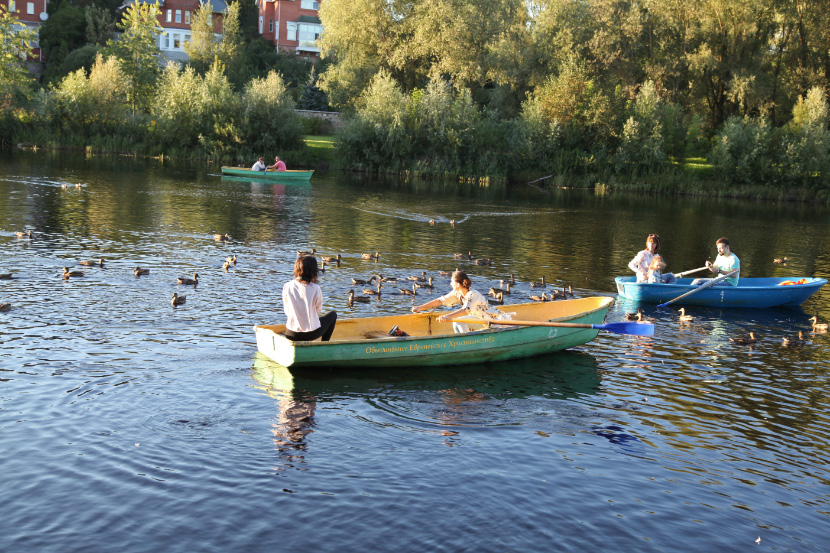 |
|
| |
Река Псков – Pskov River |
|
| |
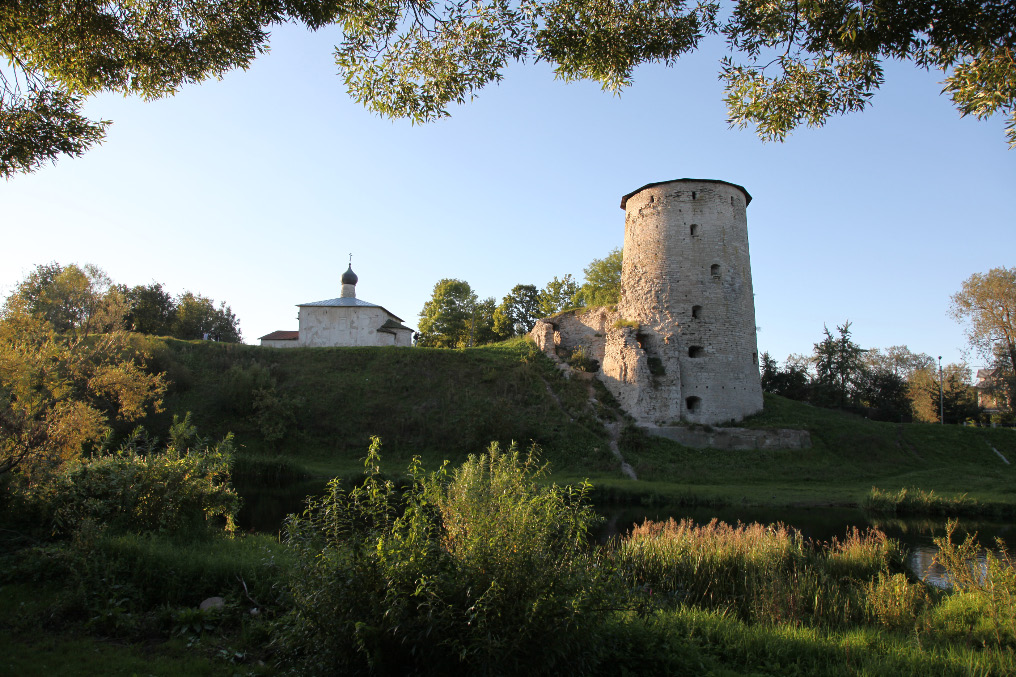 |
|
| |
And a bit further upstream on the Pskov River, Церковь Космы и Дамиана с Гремячей горы – Church of Saints Cosmas and Damian on the Gramyachey Hill, and with late medieval tower of the Pskov city walls. Photo from 24 August 2016 |
|
| |
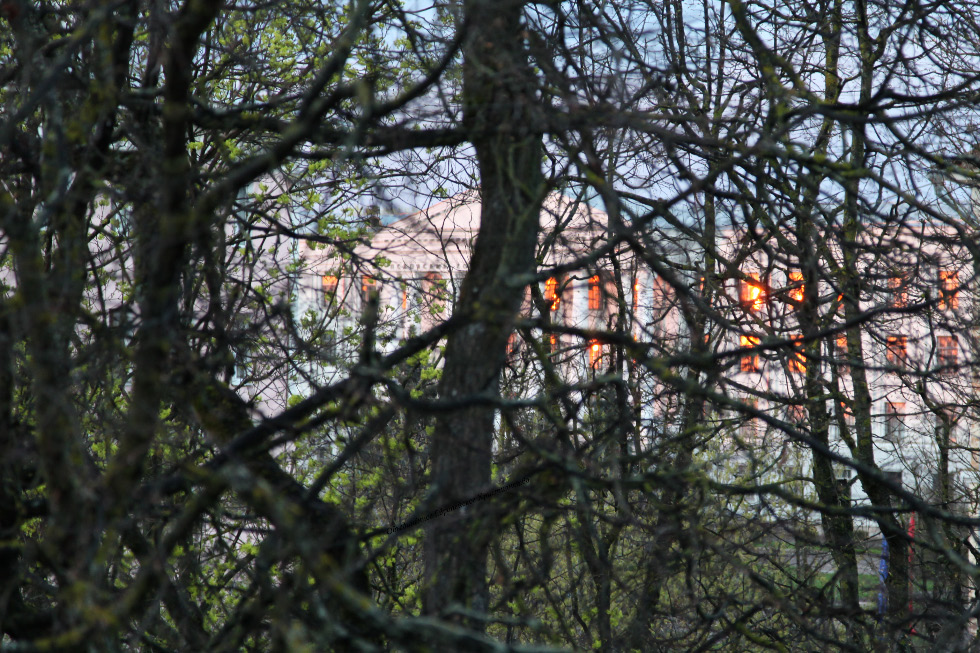 |
|
| |
Main building of the Pskov State University – Псковский Государственный Университет |
|
| |
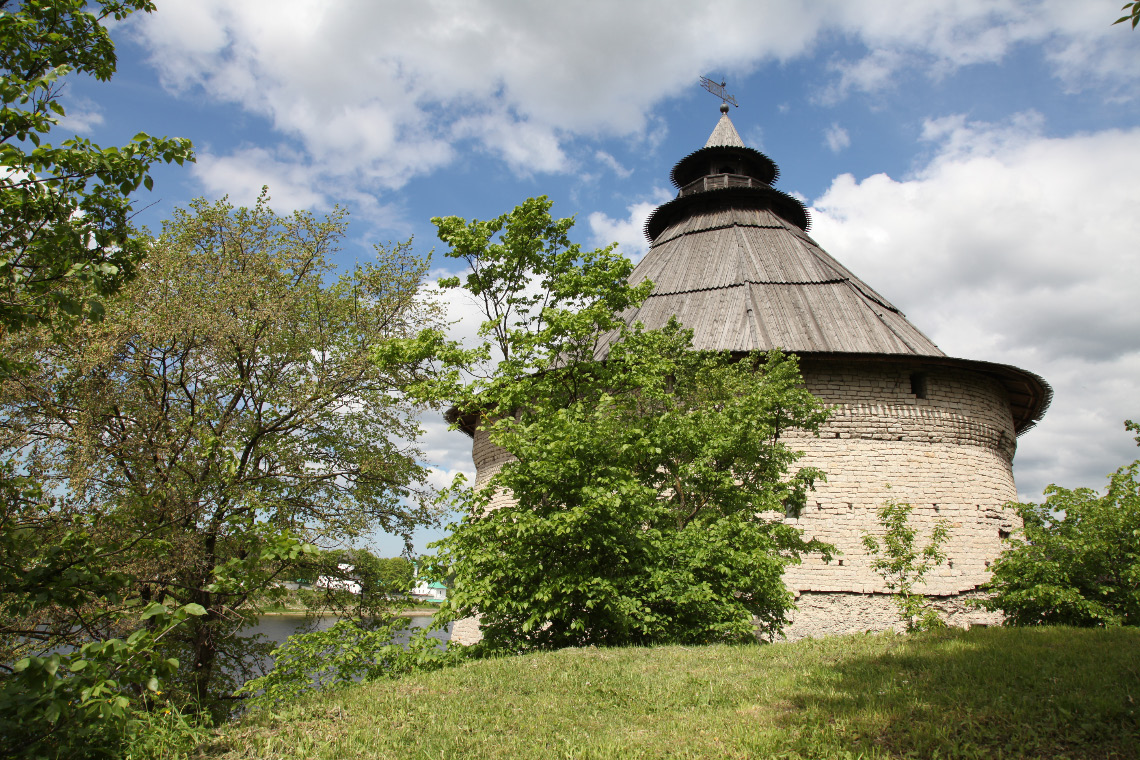 |
|
| |
Just barely visible through the foliage to the left of the Покровская Башня – Intercession Tower, looking across from the right bank to left bank of the Great (Vekikaya) River –Великая Река, one can just make out the two main Churches of the Мужской Монастырь – Mirozhsky Monastery. Indeed, lying outside of the Pskov city walls, and so much easier prey for invaders, the Monastery has been used as a staging point for attack on the main city, including attacks of 1581 by the Polish forces of Ştefan Báthory on this Intercession Tower. |
|
| |
Спасо-Преображенский Мирожский Мужской Монастырь – Transfiguration of the Savior Mirozhsky Men's Monastery |
|
| |
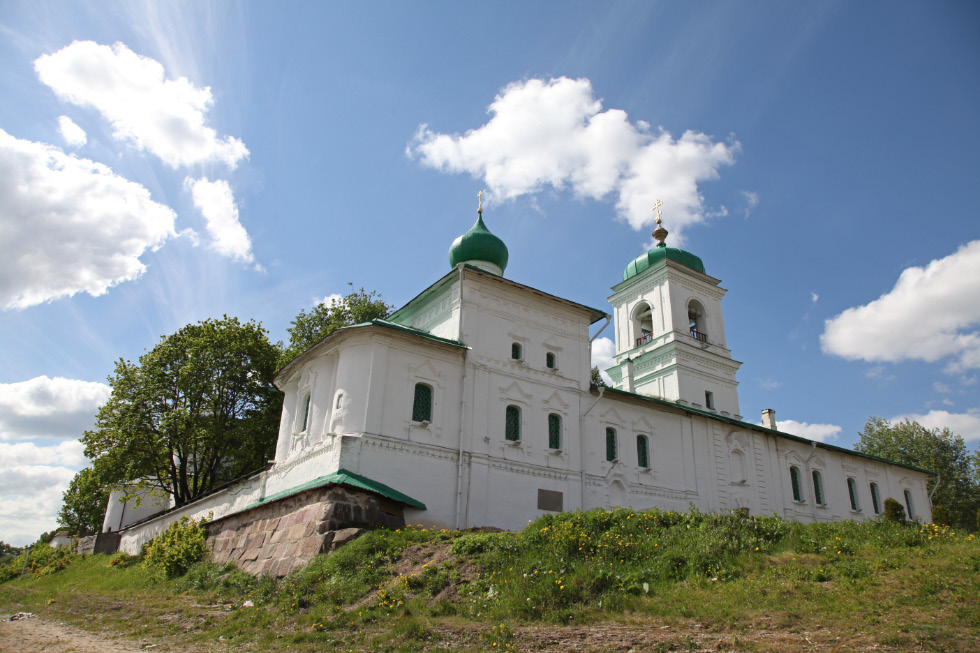 |
|
| |
Built on the site of an older Church (dated to 1406), the present structure of the Храм Апостола и Первомученика Стефана – Church of Protomartyr Saint Stephan dates to the XVII century, half a millennium newer than the nearby Cathedral of the Transfiguration of the Savior. |
|
| |
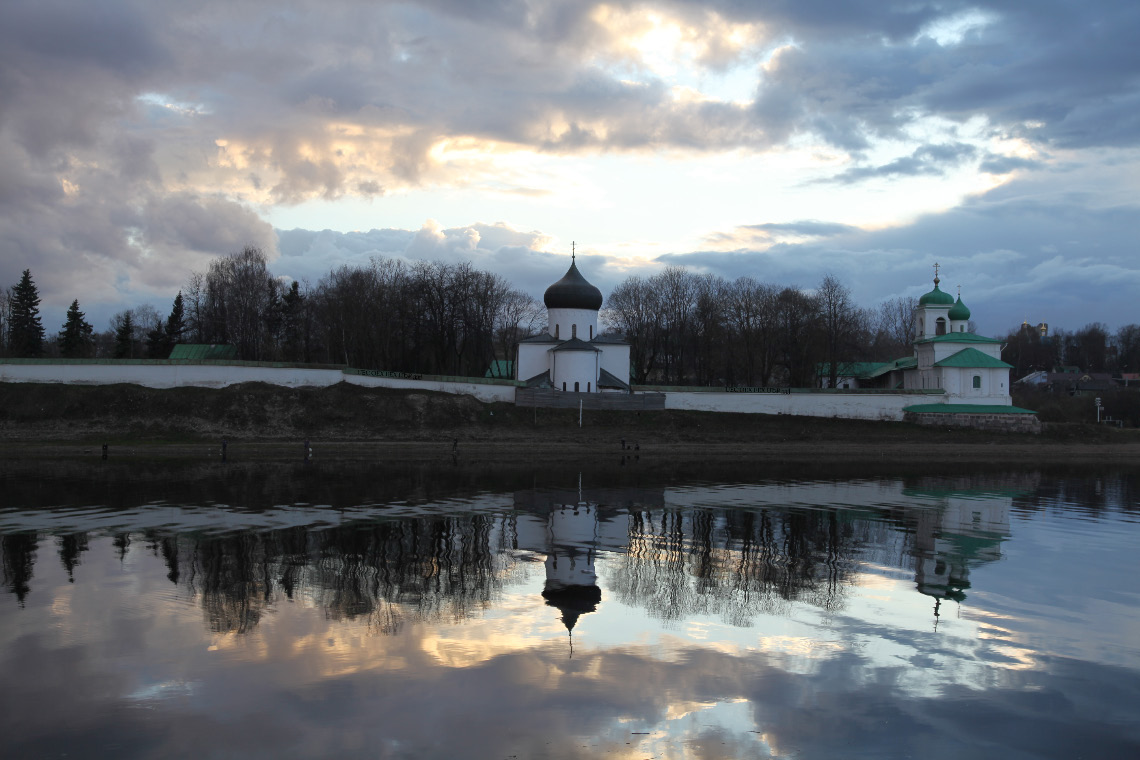 |
|
| |
Спасо Преображенский Собор и Церковь Стефана Надвратная в Спасо-Преображенский Мирожский мужской монастырь
Mirozhsky Monastery, founded by 1156, with (center of picture) the XII century (pre-Mongolian invasion) Cathedral of the Transfiguration of the Savior |
|
| |
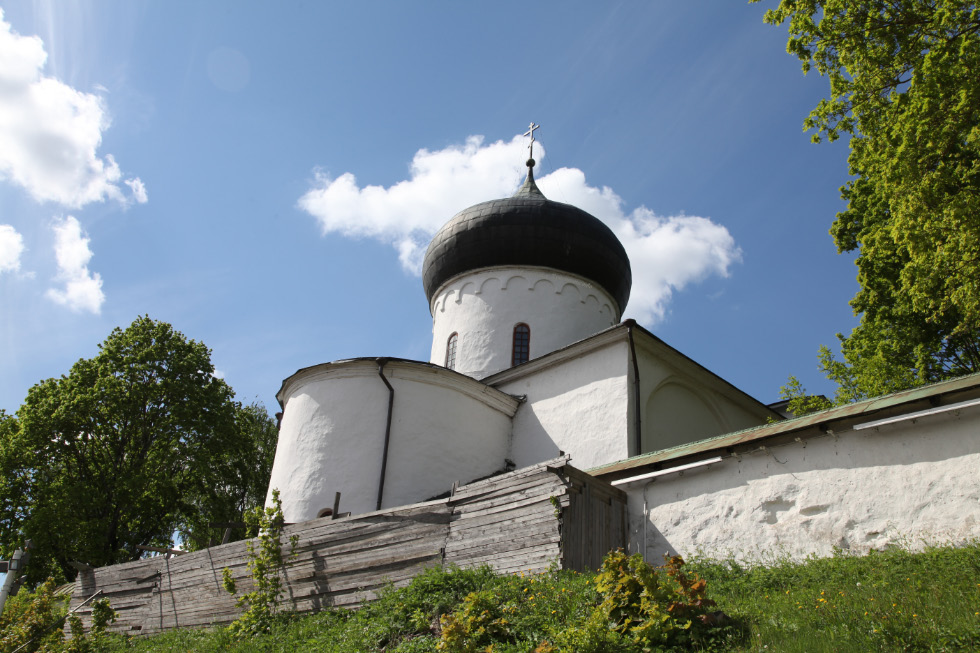 |
|
| |
Near the banks of the Great River – на Реке Великой looking west at the apse on the eastern side of this great Church, here on 20 May 2016 |
|
| |
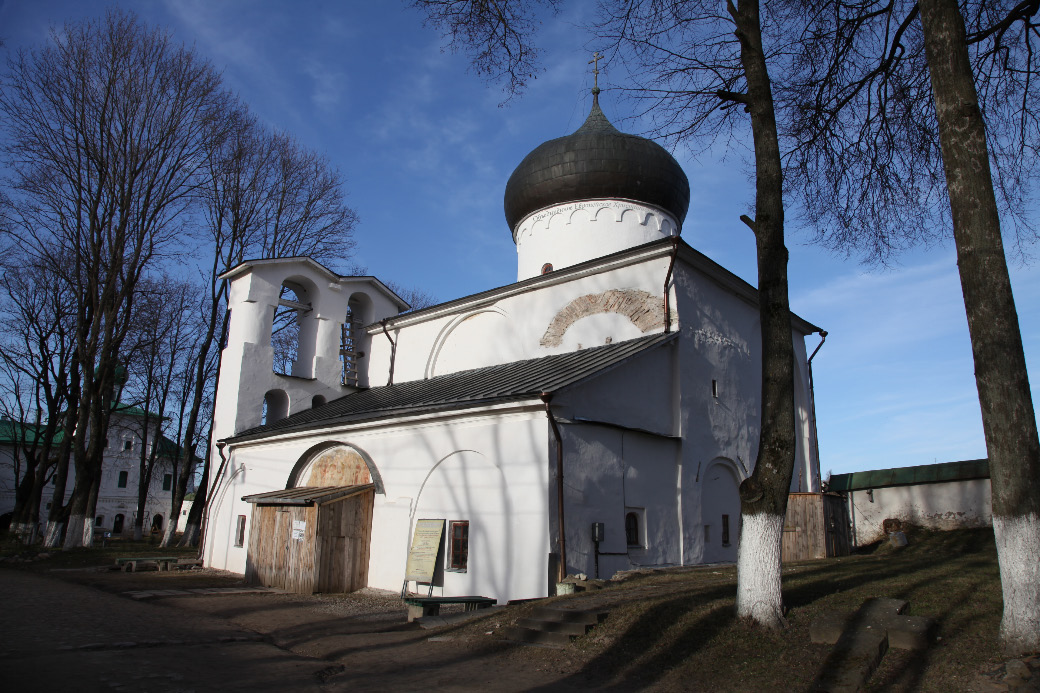 |
|
| |
on 10 April 2016 |
|
|
|
|
|
|
|
| |
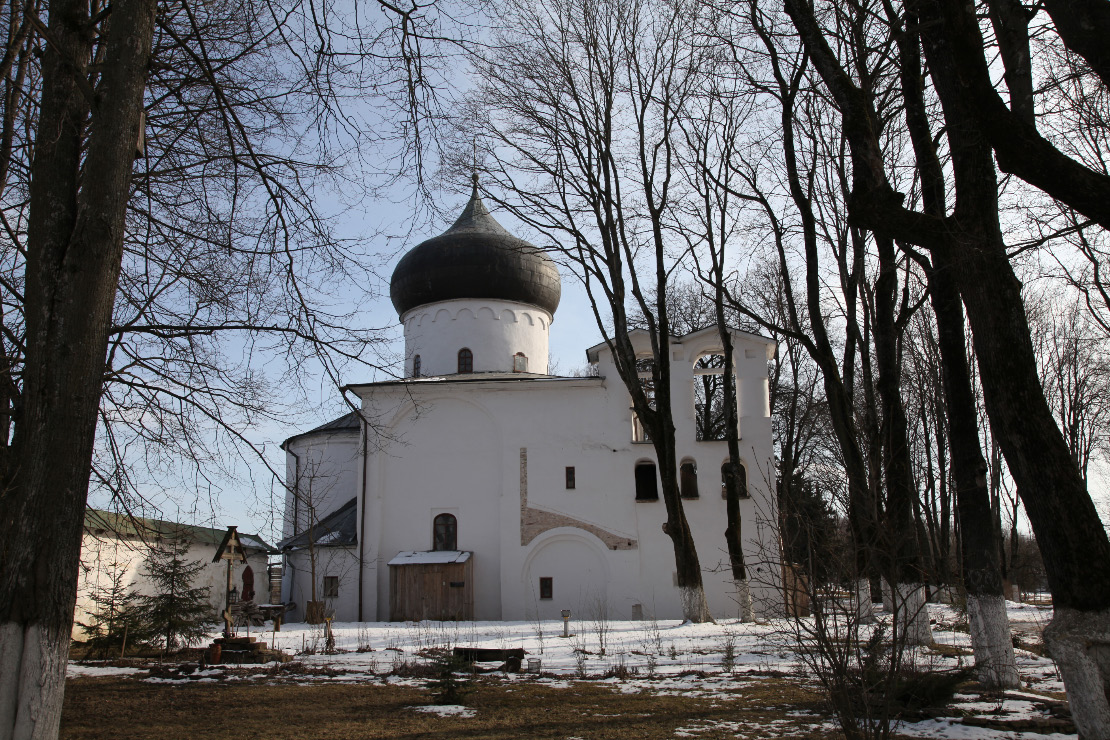 |
|
| |
Спасо Преображенский Собор – Cathedral of the Transfiguration of the Savior, mid XII century. |
|
| |
But is the monastery even older, perhaps early XI century or even X century? One manuscript with a list of names to whom thanks were given for the monastery includes the name of |
|
| |
Свѧтоплъкъ – Sviatopolk the Accursed – Святополк Окаянний – Святополк Окаянный |
|
| |
Grand Prince of Kiev from 1015 to 1019, and perhaps the first son of Saint Vladimir the Great by a sometime Greek nun, married to Vladimir's brother, |
|
| |
Ярополк I Святославич – Yaropolk I Sviatoslavich (r. as Grand Prince of Kiev from 972 to 980), |
|
| |
until Saint Vladimir had his brother and soverign lord murdered, then raping the dead brother's widow, the sometime Greek nun, to produce Sviatopolk. |
|
| |
With such auspicious beginnings, perhaps one can be a bit slower in condemning Sviatopolk (also transliterated Svyatopolk) for murdering his half brothers, Russia's first-canonized saints, Roman and David (much more commonly, if less accurately, known as Boris and Gleb). But returning to the question of the dating of the Mirozhsky Monastery, as the murders of Saints Roman (Boris) and David (Gleb) occurred in 1015, with the then accursed Sviatopolk's excommunication following hard upon, any Church manuscript giving Prince Sviatopolk thanks and praise must antedate 1015, and so to must the particular Church or monastery producing such manuscript. |
|
| |
|
|
| |
But even if a date like 1156 Anno Domini is to stand, this Church is extraordinary even for a city in which XV and XVI century Churches abound. And given expecially the history of the XIII century Mongol invastion, consider if you will that this Orthodox-Catholic Christian Church and the interior frescos, the work of Byzantine artists, which adorn her interior, stood to the Glory of God for ... |
|
| |
|
|
| |
- at least 115 years until the Angelic Doctor, Sanctus Thomas de Aquino – San Tommaso d'Aquino – Saint Thomas Aquinas wrote De Aeternitate Mundi contra murmurantes – The Eternity of the World, against the murmurers in 1271 От Рождества Христова – Anno Domini;
|
|
| |
|
|
| |
-
a half century before the greatest mind in the history of Islam — Averroes – |
رشد |
|
ابن |
|
– Ibn Rushd |
(14 April 1126 – 10 December 1198) — failed to |
|
|
| |
solve adequately the great problem of reconciling the Aristotelian posit of the world's eternity with the Christian truth, adopted by Islam, that the world is created by God; |
|
| |
|
|
| |
- more than 80 years before the unspeakable horrors and scorched earth devastation which the invading Mongol hordes brought to the Russias in the years between 1237 and 1240 (though the Mongol mass murderers did not become Muslim until about two decades later, when Berke Khan – Бэрх хаан – Бәркә хан, who had converted to Islam, succeeded his brother, Batu Khan, another of Genghis Khan's grandsons, as the ruler of the "Golden Horde", ruling from 1257 until his death in 1266).
|
|
|
|
|
| |
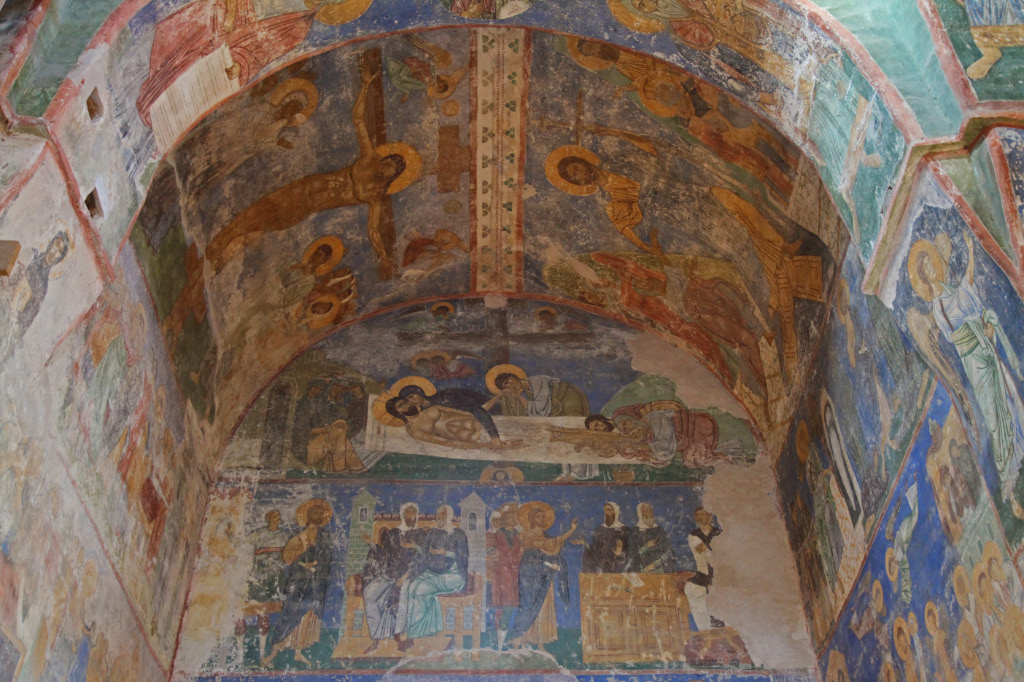 |
|
| |
Within the XII century Спасо Преображенский Собор – Cathedral of the Transfiguration of the Savior, icons in fresco, also mid XII century, depicting the: |
|
| |
|
|
|
|
| |
Распятие–Crucifixion |
|
|
|
Сошествие во Ад–Descent into Hell |
|
| |
|
|
Оплакивяние–Lamentation |
|
|
|
| |
Христос перед Первосвященниками Анной и Каиафой
–Christ before the high priest Caiaphas and Annas |
|
|
|
Христос перед Пилатом
–Christ before Pilate |
|
| |
|
|
|
|
|
|
| |
Frescos the work of artists from Constantinople |
|
| |
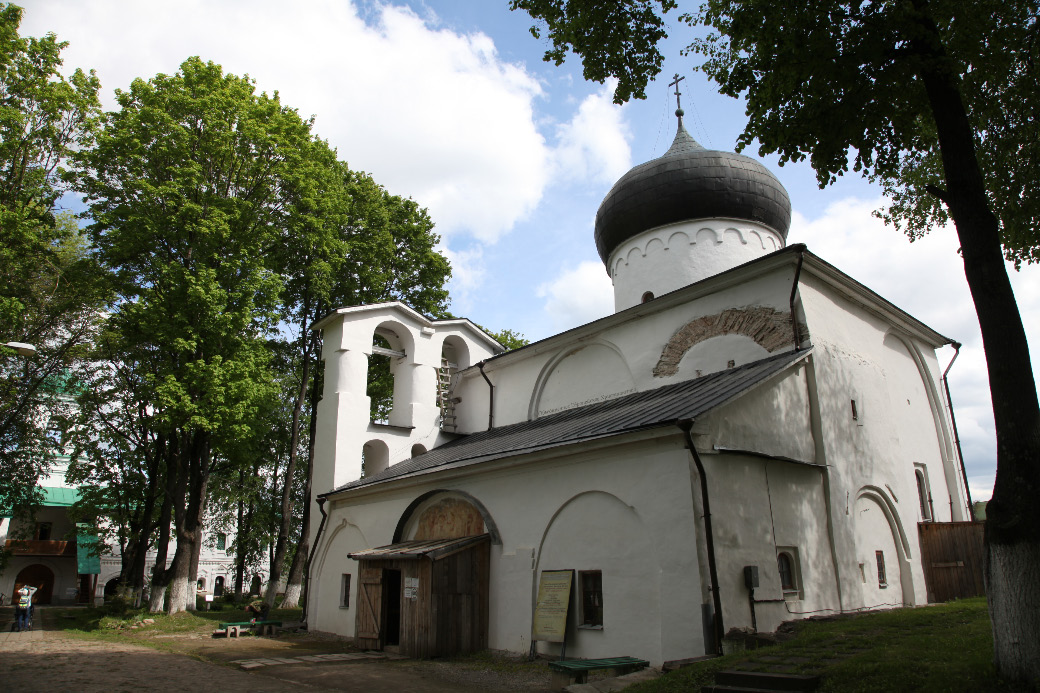 |
|
| |
20 May 2016 |
|
| |
 |
|
| |
... in Мирожский Монастырь – Mirozhsky Monastery on 20 May 2016 |
|
|
| |
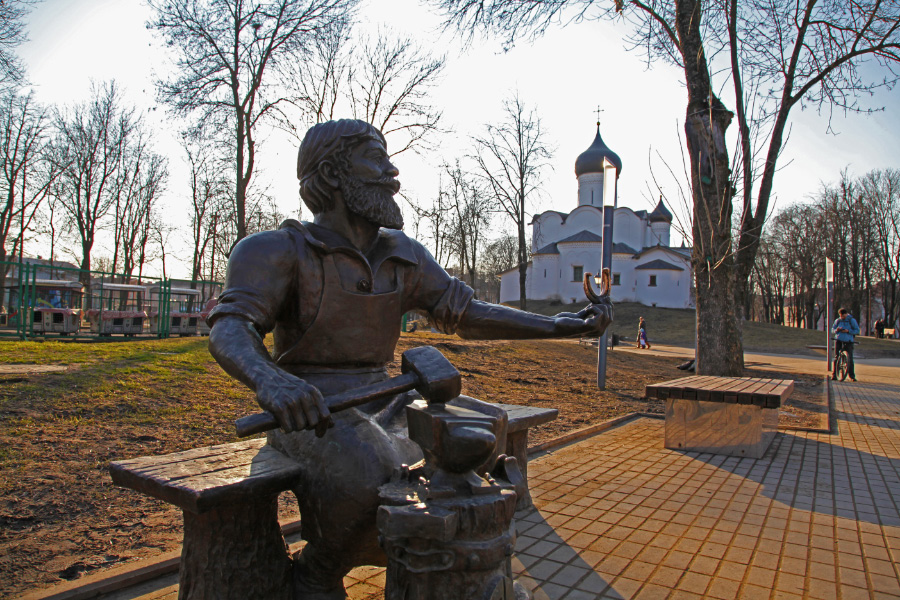 |
|
| |
Mister Кузнецов or Kowalski – Smith – Schmidt – Kovačević – Kovač – Lefebvre – Herrero – Ferraro or Ferrari or Σιδεράς |
|
| |
... and behind his horseshoe a glimpse of Храм Святого Василия Великого – Church of Saint Basil the Great, constructed 1413 to 1415 on the site of a still older wooden Church. Any good book or webpage dealing with Pskov, even if on a different topic than this present effort, would be full of Churches. |
|
| |
Άγιος Βασίλειος ὁ Μέγας – Святой Василий Великий – Saint Basil the Great (* c. 330 Caesarea, Cappadocia to 1 or 2 January 379 † |
|
| |
Храм Святого Василия Великого (на горке) – Church of St. Basil the Great (on the hill), built 1413 Anno Domini. |
|
| |
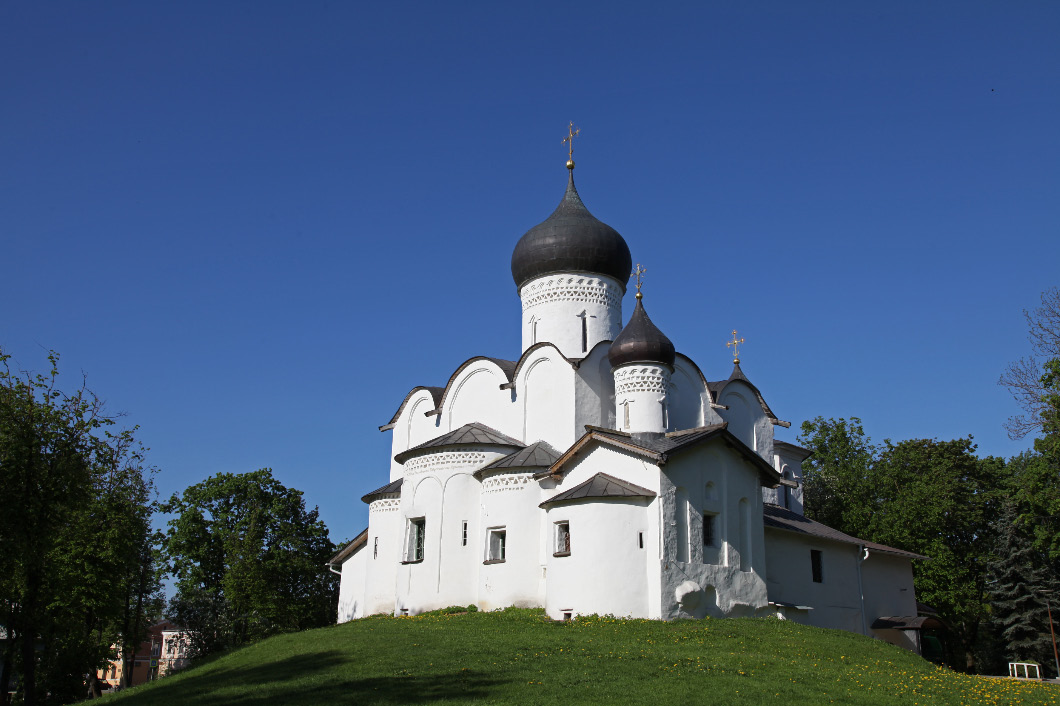 |
|
| |
on the seventeenth of May of 2016 |
|
| |
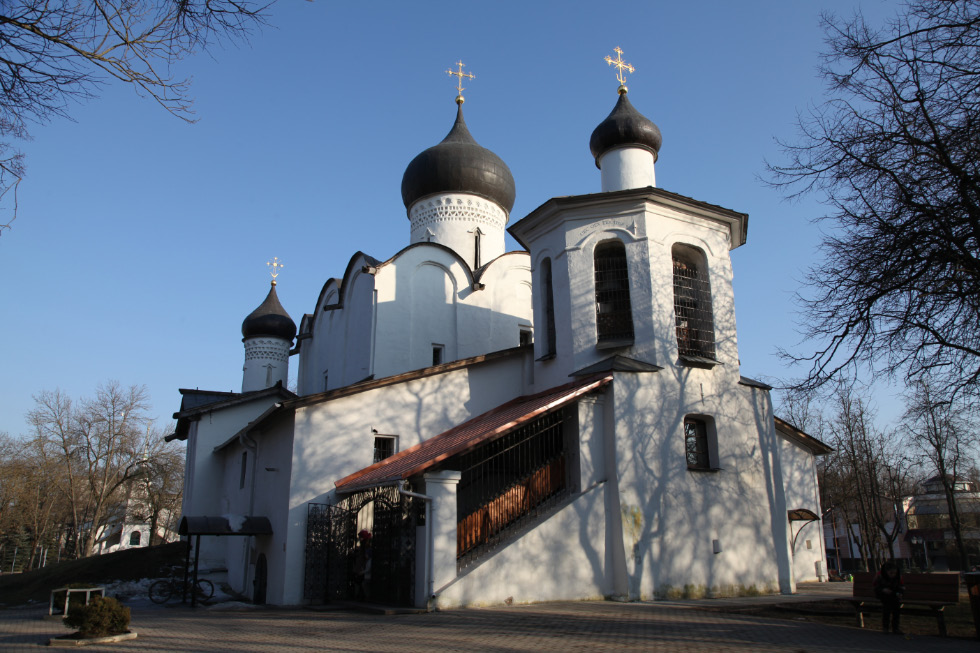 |
|
| |
... for Catholics, one of thirty-six named Doctors of the Church; and for Orthodox, along with Saint John Chrysostom and Saint Gregory of Nazianzus, one of the Three Great Hierarchs of the Universal Church.
|
|
| |
here on the twenty-eighth of March |
|
| |
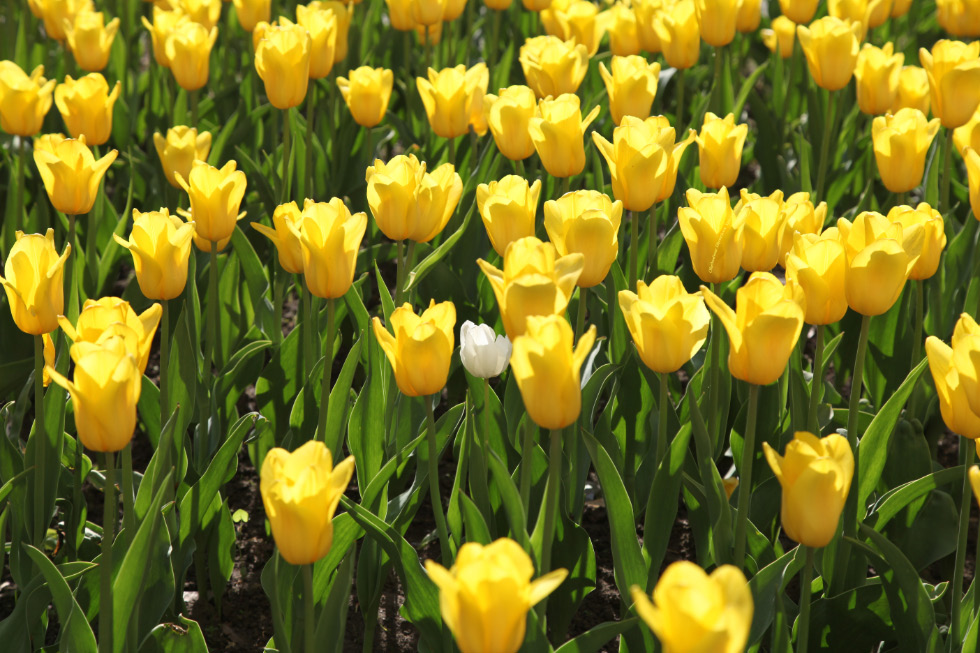 |
|
| |
nearby but on 17 May 2016 |
|
|
|
|
| |
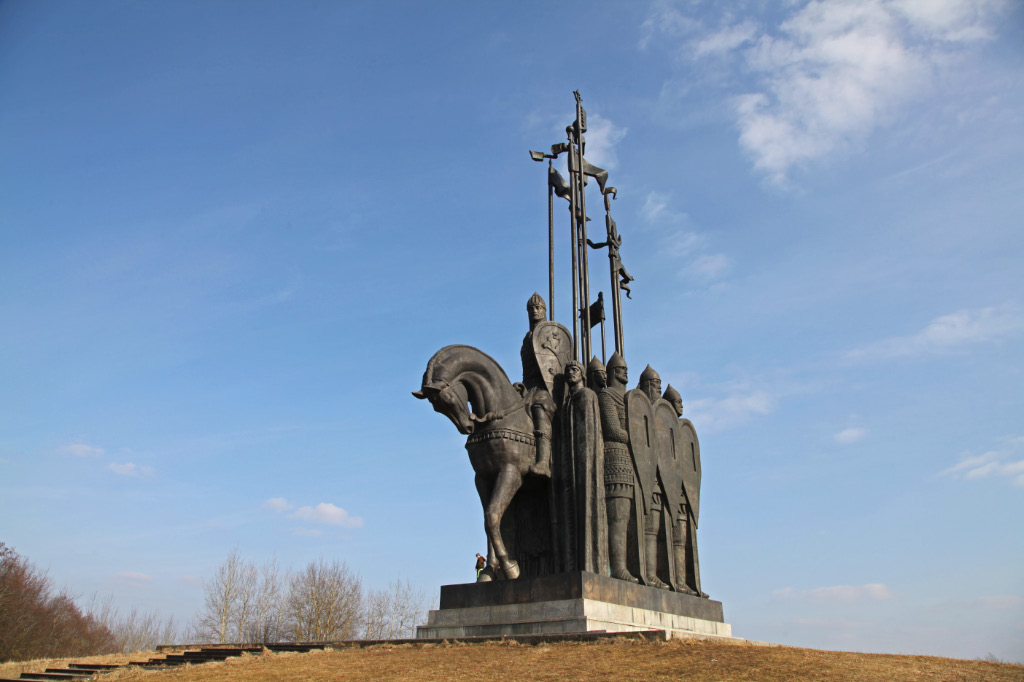 |
|
| |
From the holy perspective of Объединённое Европейское Христианство – United European Christendom, the life and work of Saint Alexander Yaroslavich Nevsky – Александр Ярославич Невский (* 30 May 1220 – 14 November 1263 †) are certainly susceptible to misinterpretation and misusage, and, post-Soviet breakup, the kleptocrats of the Russian state and the ignorant within the Russian Church have evidenced a strong proclivity toward just such. After all, Devil may care what happens to the people and their souls, who wants scrutiny when they are riding high on the hog? Unless, that is, the leaders actually wanted to please God and see Him.
Nevsky seems to have chosen alliance with, well actually subservient and tribute-paying vassalage to the Золотая Орда – Mongolian Golden Horde and against the German, Swedish and Livonian Catholics, the "Latins", rather than siding with his Latin Christian brothers against the Satanic Mongolian (though not yet at this date Muslim) Horde. These Germanic Knights of the Northern Crusade then attempted invasion — by no means a good, holy or wise move either — taking Pskov, but being repelled by the Novgorodian and other Russian forces under Nevsky at the famous Ледовое побоище – Schlacht auf dem Eise – Battle on the Ice, which took place on 5 April 1242 on the lake which today separates Estonia and Russia, Lake Peipus – Peipsi-Pihkva järv – Псковско-Чудское Озеро (the fifth largest in Europe). However much this story has been misused by later Russian leaders centuries after the event, Stalin for example, the truth is dramatically different than the preferred narrative, to the effect that the twenty-year-old Grand Prince divined that subservience under the suzerainty of murderous Mongols — would could not care less about Russian religion or culture — was preferrable to the insidious infiltrations of the Latins (or Germans). In truth, Nevsky simply made a boots-on-the-ground calculation that the Mongol Horde was too strong at that time, so he cut a deal with them for the time being. Again, the Mongols were not yet Muslim in 1242. Their conversion had to wait for the reign of Sultan Mohammed Öz Beg, better known as Uzbeg Khan (r. 1313–1341). "Big C" Catholics or "Big O" Orthodox siding against the other in alliance with Muslims never ends well. The truth compells one to also add that the Catholic "Northern Crusade," admitted ill conceived and ill considered, has been greatly exaggerated in its scope.
And Nota Bene, It has been claimed that Saint Alexander Nevsky himself authorized the construction of a Latin-Rite Church in Pskov in 1247. It has also been claimed that Pope Innocent IV (* r. 25 June 1243 to 7 December 1254 †) tried to bring Saint Alexander into the Roman fold, and there is a letter by Innocent claiming that he had succeeded in doing so, though such an event is also vehemently denied.
Памятник дружине Александра Невского в Пскове – this giant and very well executed monument (30 meters high, 163 tons) in Pskov dates only to 1993. Sculptor I. I. Kozlovsky and architect P. S. Butenko. |
|
| |
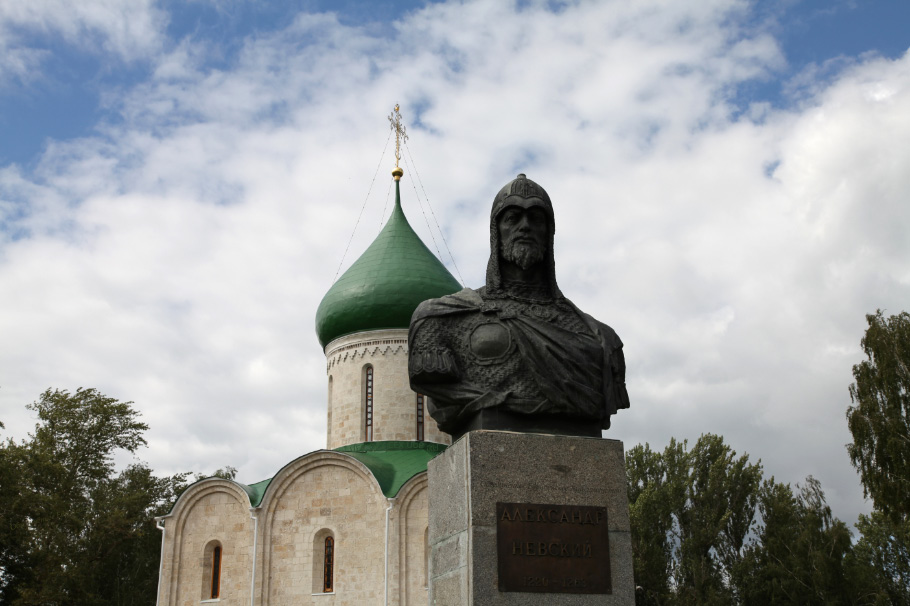 |
|
| |
Спасо-Преображенский собор – Transfiguration Cathedral |
|
| |
About 650 kilometers away, as the crow flies, and dramatically further on horse,
Built from 1152 to 1157, the Church of Aleksandr's baptism and near the spot of his birth in
Переславль-Залесский – Pereslavl-Zalessky |
|
| |
Alexander Nevsky was canonized nearly three centuries after his death, by |
|
| |
Макарий, Митрополит Московский и всея Руси – Metropolitan Macarius of Moscow and All the Russias |
|
| |
at the Макарьевские Собор 1547 года – Makaryev Sobor (Council) of 1547 |
|
| |
|
|
| |
Perhaps in a similar vien we can turn in time to the debunking of other false dichotomies, poisonous to lived Christianity and to Christendom, distracting deceptions such as: |
|
| |
Communism vs. Capitalism |
|
| |
... in both cases in their real-world, as-practiced forms, degenerated into: |
|
| |
|
|
| |
Enslavement to diabolical atheist Kommisars vs. Enslavement to diabolical atheist Plutocrats |
|
| |
and we can also show the connection to that other intricately-associated false choice which has emerged between these two sickening alternatives, namely that of the participates and real proprietors of European Christendom being forced into the choice between one or the other of the camps of |
|
| |
|
|
| |
Sodomy vs. Usury |
|
| |
|
|
| |
Sodomy vs. Adultery |
|
| |
And there are other of these false dichotomies whose connectedness can be demonstrated, such as that of |
|
| |
|
|
| |
Keynesian downward debt spiral vs. Economic strangulation through adherence to monetary Gold Standard |
|
| |
... both to the peril of the prosperity of, or even the survivability of, Christian laboring families, that is, of real people. |
|
| |
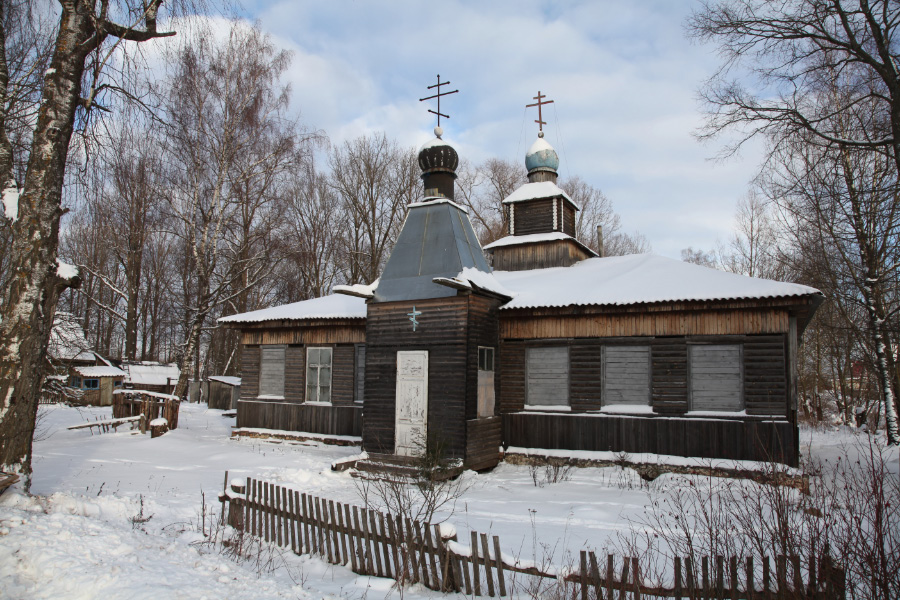 |
|
| |
Бельское Устье — деревня в восточной части Порховского района Псковской области
Village Church in Belskoye Ustye, in the eastern part of the Porkhov district of the Pskov region |
|
|
|
|
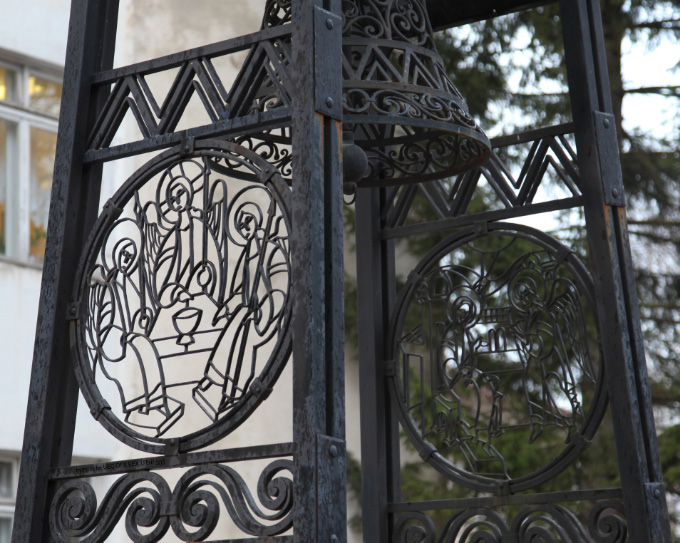 |
|
|
| Trinity in iron in Porkhov |
|
|
| |
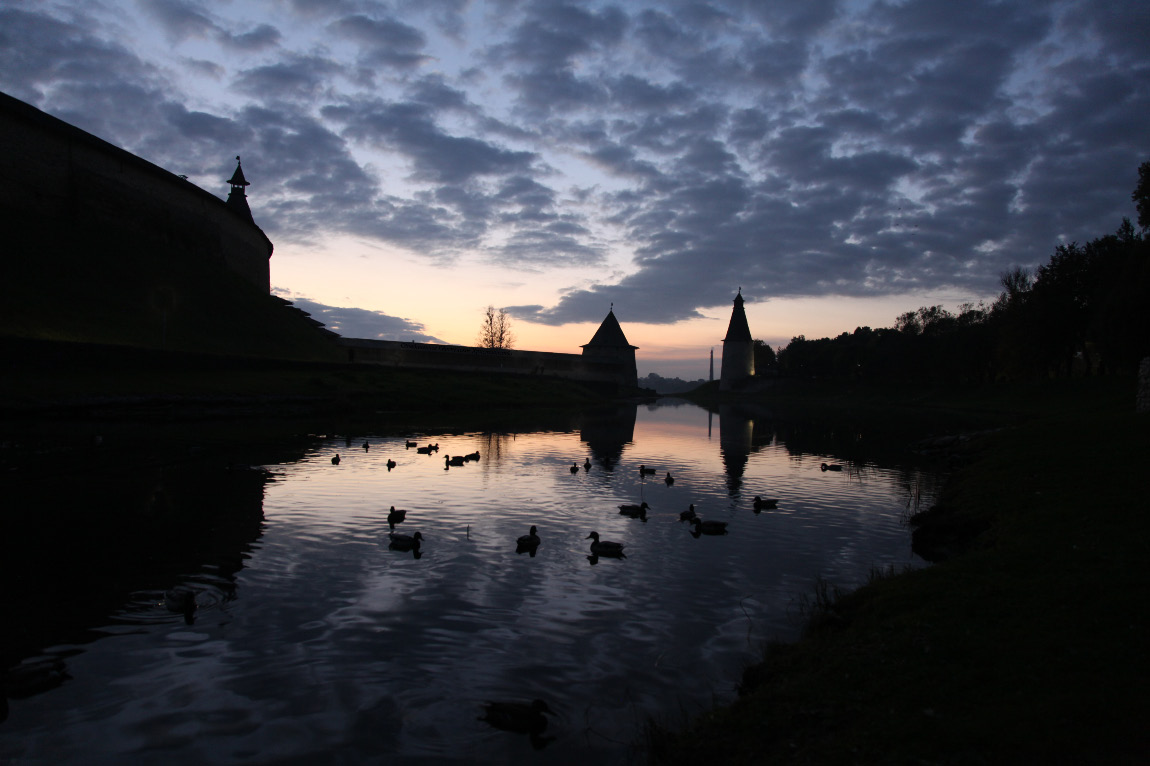 |
|
| |
Блоская башня псковского кремля и Высокая (Воскресенская) башня крепости Пскова |
|
| |
The Flat Tower and, on the opposite bank of the Pskov River as she flows into the Great River, the High or Resurrection Tower |
|
| |
27 September 2016 with ducks |
|
| "Rise, and have no fear." |
|
"This is my beloved Son, with whom I am well pleased; listen to him." |
the Holy Spirit |
Man proposes, God disposes |
|